UNITED STATES
SECURITIES AND EXCHANGE COMMISSION
Washington, D.C. 20549
Proxy Statement Pursuant to Section
14(a) of the
Securities Exchange Act of 1934 (Amendment No. )
| ☑ | Filed by the Registrant | ☐ | Filed by a party other than the Registrant |
| CHECK THE APPROPRIATE BOX: | ||
| ☐ | Preliminary Proxy Statement | |
| ☐ | Confidential, for Use of the Commission Only (as permitted by Rule 14a-6(e)(2)) | |
| ☑ | Definitive Proxy Statement | |
| ☐ | Definitive Additional Materials | |
| ☐ | Soliciting Material under §240.14a-12 | |

(Name of Registrant as Specified In Its
Charter)
(Name of Person(s) Filing Proxy
Statement, if other than the Registrant)
| PAYMENT OF FILING FEE (CHECK ALL BOXES THAT APPLY): | ||
| ☑ | No fee required | |
| ☐ | Fee paid previously with preliminary materials | |
| ☐ | Fee computed on table in exhibit required by Item 25(b) per Exchange Act Rules 14a-6(i)(1) and 0-11 | |
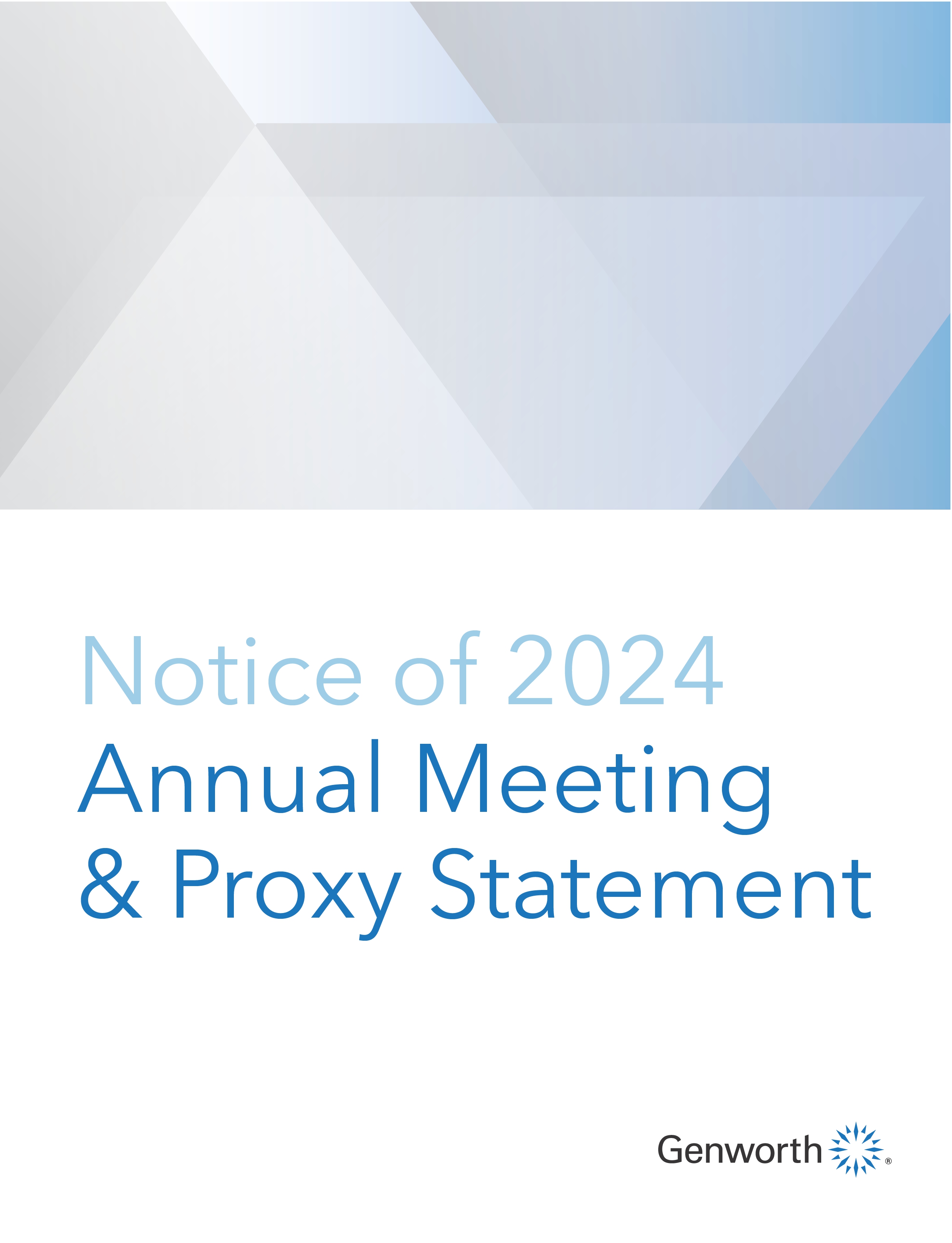

| Our Values in Action in 2023 |
 |
| Make it happen | Make it human | |
|
Capital Generation from Enact
Enact’s strong performance and shareholder distributions continue to be
an important source of cash flows to Genworth. Enact’s quarterly dividends in 2023 delivered proceeds of $82 million to
Genworth. Enact also announced a $100 million share repurchase plan on top of its existing $75 million program and paid a special
cash dividend totaling $113 million to shareholders in December 2023. Overall, Genworth received $245 million of capital returns
from Enact last year, and has cumulatively received $615 million since Enact’s IPO.
Share Repurchase Program
Genworth’s share repurchase program delivered strong shareholder value
in 2023 and is a key component of our capital management strategy. In July 2023, we announced a $350 million expansion of our
existing repurchase program, which was the same amount as our previous authorization. Overall, since our program’s
inception in May 2022, we have repurchased approximately $425 million worth of shares, through April 3, 2024, at an
average price of $5.40 per share. In 2024, we will continue to consider additional repurchases subject to market
conditions. |
Senior Sensitivity
In 2023 more than 1,000 of our associates completed senior sensitivity training, a two-hour workshop that fosters empathy and an understanding of what it feels like to be elderly. We learned more about the challenges faced by our customers and their families and participated in an experiential exercise where household items were used to simulate common aging ailments. We also reflected on how each of us can make our customers’ experiences better by approaching every interaction with compassion and empathy.
 Volunteerism
Through the Genworth Foundation, we’re investing in organizations that champion our associates’ passions, step up in times of disaster, and align with our business platforms, specifically healthy aging and caregiver support, affordable housing and homelessness, and sustainability and environmental awareness. With these focus areas in mind, Genworth associates volunteered 5,500 hours and donated almost $870,000 to non-profit organizations around the globe, including matching gifts, in 2023. |
| 2024 Proxy Statement | 1 |
| Make it about others | Make it better | ||
|
CareScout Quality Network
At CareScout, we help older adults and their families find quality long-term care through our CareScout Quality Network and the expert guidance of our Care Advocates. We believe quality care should mean more than just safe care. It should be person-centered care, integrating your values, preferences, and goals into the care you receive. This creates a partnership between caregiver and care recipient that addresses the physical, mental, spiritual, and social elements of a person’s health.
In 2023, we launched our CareScout Quality Network for our long-term care insurance policyholders, which includes a select group of long-term care providers certified as quality providers for meeting not just safety standards, but also person-centered care principles. By year end, the CareScout Quality Network was available in 16 states as we work to offer nationwide coverage.
 |
Live Well | Age Well
In 2023, Genworth launched Live Well | Age Well, a voluntary and complimentary wellness program designed to help Genworth long-term care insurance policyholders live in their homes as long as possible during the aging process. Policyholders and their loved ones who choose to participate receive suggestions from our care team based on their current lifestyles, including educational sessions on emotional well-being, caregiver support, home safety and independent activities of daily living—and they can reconnect with Genworth as their needs change. The Genworth Live Well | Age Well program is delivered through one-on-one coaching and support, personalized wellness plans, online resources, and care packages with items to make daily tasks easier. | ||
 |
The information included in Live Well | Age Well covers a wide variety of topics from fall prevention to medication management, while also diving deep into the specific needs of the individual. It’s our wellness and caregiving guides, though, with backgrounds in clinical health and aging that really make this program special." – Jamala Arland, Executive Vice President, Genworth U.S. Life Insurance
 | ||
| 2 | Genworth Financial, Inc. |
| A Letter to Our Stockholders from Our Board Chair |
 |
| Dear Stockholder, | ||
|
The Board of Directors invites you to attend the 2024 Annual Meeting of Stockholders of Genworth Financial, Inc. (the 2024 Annual Meeting), to be held virtually at 9 a.m. E.T. on May 23, 2024. You will be able to attend the meeting online, vote your shares electronically, and submit questions before or during the meeting via www.virtualshareholdermeeting.com/GNW2024. The 2024 Annual Meeting will include a report on our
business operations, discussion and voting on the proposals set forth in the accompanying Notice of 2024 Annual Meeting of
Stockholders and Proxy Statement, and discussion and voting on any other business matters properly brought before the
meeting.
Whether or not you plan to attend the 2024 Annual Meeting, you can ensure your shares are represented at the meeting by promptly submitting your proxy by telephone, internet, or completing, signing, dating, and returning your proxy card.
Key achievements in 2023
Thanks to the commitment and diligence of our management team and workforce, Genworth made significant progress against our three strategic priorities last year. We continued to make strong progress on reducing the tail risk on our legacy long-term care insurance book of business through our Multi-Year Rate Action Plan. We launched the CareScout Quality Network, advancing our goal to leverage Genworth’s long-term care insurance (LTC) expertise to develop innovative aging care solutions. And we returned significant value to shareholders through share repurchases, having repurchased approximately $295 million of shares and expanded the scope of the program by an additional $350 million in 2023. This progress drove a strong Total Shareholder Return (TSR) of 27.7% over the course of the year. The Board is pleased with this progress and remains confident in the strategic direction of the company. |
Maintaining our commitment to strong governance
After a significant refresh of the Board
of Directors, Genworth continues to benefit from the diverse experiences members of our Board bring to the company. Our collective
expertise in financial services, business leadership, risk management, corporate governance, healthcare, and regulatory matters,
among other skillsets, are instrumental in guiding not only our growth strategy for CareScout, but also the sustainability of our
legacy LTC books of business. We apply these talents in support of our strategic priorities, such as forming a special Board
committee to advise on the initial stages of development for CareScout. Outside of our regular Board activities, our directors
regularly attend and speak at industry and board conferences, where they’re able to expand both the Board’s
knowledge base and governance credentials. We have a strong Board that is deeply engaged in guiding Genworth’s next
chapter.
In closing, we are pleased with the company’s achievements and value creation in 2023. With your continued support, the Board and I are confident in Genworth’s ability to continue its long-term growth trajectory and deliver on its mission to help make the aging journey more dignified, connected, and fulfilling.
Cordially,
 Melina Higgins
Non-Executive Chair of the Board |
| 2024 Proxy Statement | 3 |
| A Letter to Our Stockholders from Our CEO |
 |
|
Dear Stockholder, |
||
|
2023 was another strong year for Genworth and its subsidiaries. I’m pleased with Genworth’s strategic progress in 2023, the ongoing value creation delivered by Enact, and our strong momentum on LTC in-force rate actions – which drove positive statutory income in our U.S. life companies.
Achieving our strategic priorities
We continued to make significant strides in 2023 towards achieving our strategic priorities. Our Multi-Year Rate Action Plan (MYRAP) has substantially improved the financial condition of our legacy long-term care insurance (LTC) business. In 2023 alone, we achieved $354 million in premium rate increases, well above our guidance of $275 million for the year. This brings our cumulative progress to approximately $28 billion in approvals on a net present value basis since 2012, reflecting progress of 84% toward our latest $33 billion estimate for the net present value of rate increases and benefit reductions contemplated in our MYRAP.
We achieved a notable milestone in 2023 by launching
our CareScout Quality Network with an initial focus on Genworth policyholders, and the goal of reaching other LTC insurance
carriers’ policyholders and eventually all Americans. After an initial launch in Texas, the network currently includes
186 credentialed providers available in 31 states, as of April 3, 2024. We are working toward nationwide
coverage with an initial focus on home care providers that meet our quality credentialling standards and agree to negotiated
preferred rates. We also have been focused on building the foundation necessary to re-enter the LTC insurance market through
CareScout Insurance later in 2024. |
As we drive long-term shareholder value through growth in CareScout and our majority ownership of Enact, we are also making strong progress in returning value to shareholders through our share repurchase program. Since the program’s inception in 2022 through April 3, 2024, we’ve repurchased approximately $425 million of shares at an average purchase price of $5.40 per share. This progress was enabled by Enact’s continued strong performance, which generated $245 million in cash flows to Genworth in 2023. We expect strong cash flows from Enact will continue to fuel our capital returns and growth investments. Since Enact’s IPO, Genworth has received approximately $615 million in capital from Enact through December 2023. Entering our next chapter 2024 will be a pivotal year as we continue to execute on our long-term strategy to invest in growth and continue returning capital to our shareholders. This year, with the company on solid financial footing, operating with low debt service obligations, and executing a successful share buyback program, I believe we’re better positioned to focus on growth than we ever have been in my more than 11 years at Genworth. I am confident in Genworth’s direction and the team we have in place to deliver on the vision for our next chapter, while holding true to our mission of empowering families to navigate the aging journey with confidence. As always, thank you for your investment and support.
Sincerely,  Thomas J. McInerney |
| 4 | Genworth Financial, Inc. |
| Notice of 2024 Annual Meeting of Stockholders |
 |
 Date and Time Thursday, May 23, 2024, at 9:00 a.m. ET  Meeting Access www.virtualshareholder meeting.com/GNW2024 using your 16-digit control number included on your proxy card or notice  Who Can Vote Stockholders of record at the close of business on March 25, 2024 |
How to Vote
 Internet www.proxyvote.com  Telephone 1-800-579-1639  sendmaterial@proxyvote.com  You can vote by mail by requesting a paper copy of the materials, which will include a proxy card. |
Voting Matters
| Proposals | Board Vote Recommendation |
For Further Details | |||||
| 1. | Election of Nine Directors Named in the Proxy Statement |
 |
FOR each of the Board’s nominees |
 |
Page 17 | ||
| 2. | Advisory Vote to Approve Named Executive Officer Compensation |
 |
FOR |
 |
Page 59 | ||
| 3. | Ratification of the Selection of KPMG LLP as the Independent Registered Public Accounting Firm for 2024 |
 |
FOR |
 |
Page 105 | ||
| 4. | Approval of an Amended and Restated Certificate of Incorporation to Remove All References to Legacy GE Provisions Including the Removal of References to Class B Common Stock and Renaming Class A Common Stock |
 |
FOR |
 |
Page 109 | ||
| 5. | Approval of an Amendment to Genworth’s Certificate of Incorporation to Provide Stockholders the Right to Request the Calling of a Special Meeting of Stockholders at a 25% Ownership Threshold |
 |
FOR |
 |
Page 112 | ||
Stockholders will also discuss and vote on such other business as may properly come before the 2024 Annual Meeting of Stockholders (the “2024 Annual Meeting”) or any adjournment thereof.
In accordance with the U.S. Securities and Exchange Commission (“SEC”) rule, we are furnishing this proxy statement (“Proxy Statement”) and our Annual Report on Form 10-K for the year ended December 31, 2023 (“2023 Annual Report”) to many of our stockholders solely over the internet. We believe that posting these materials on the internet enables us to provide stockholders with the information that they need more quickly. In addition, it lowers our costs of printing and delivering these materials and reduces the environmental impact of our 2024 Annual Meeting. The Notice of Internet Availability of Proxy Materials sent to many of our stockholders explains how to access the proxy materials online, vote online and obtain a paper copy of our proxy materials.
We urge our stockholders to participate in the 2024 Annual Meeting. Stockholders may vote by telephone, through the internet or by mailing your completed and signed proxy card (or voting instruction form, if you hold your shares through a broker, bank or other nominee). Each share of Class A Common Stock issued and outstanding as of the record date is entitled to one vote on each matter to be voted upon at our 2024 Annual Meeting. Your vote is important and we urge you to vote.
This Notice, the Proxy Statement and proxy card are first being made available or mailed to stockholders on or about April 8, 2024. The accompanying Proxy Statement is hereby incorporated by reference to this Notice.
Cordially,

Michael J. McCullough
Corporate Secretary
| Important Notice Regarding the Availability of Proxy Materials for the 2024 Annual Meeting to be Held on May 23, 2024: Genworth’s Notice of 2024 Annual Meeting of Stockholders, Proxy Statement and 2023 Annual Report are available, free of charge, at: www.proxyvote.com |
| 2024 Proxy Statement | 5 |
Table of Contents
| Certain statements in this Proxy Statement, other than purely historical information, including estimates, projections, statements relating to our business plans, objectives and expected operating results, and the assumptions upon which those statements are based, are “forward-looking statements” within the meaning of the Private Securities Litigation Reform Act of 1995, Section 27A of the Securities Act of 1933 and Section 21E of the Securities Exchange Act of 1934. Forward-looking statements may appear throughout this Proxy Statement. These forward-looking statements generally are identified by the words “believe,” “project,” “expect,” “anticipate,” “estimate,” “intend,” “strategy,” “future,” “opportunity,” “plan,” “may,” “should,” “will,” “would,” “will be,” “will continue,” “will likely result,” and similar expressions. Forward-looking statements are based on current expectations and assumptions that are subject to risks and uncertainties which may cause actual results to differ materially from the forward-looking statements, including the risks and uncertainties set forth in our 2023 Annual Report for the year ended December 31, 2023. We undertake no obligation to update or revise publicly any forward-looking statements, whether as a result of new information, future events, or otherwise. |
| 6 | Genworth Financial, Inc. |
Proxy Statement Summary
This summary highlights information about Genworth Financial, Inc. (the “company,” “Genworth,” “we,” “our” and “us”) and certain information contained elsewhere in this proxy statement (“Proxy Statement”) for Genworth’s 2024 Annual Meeting of Stockholders (the “2024 Annual Meeting”). In this Proxy Statement, references to “U.S. Life Insurance” refer to both our Long-Term Care Insurance segment and our Life and Annuities segment. In addition, we make reference to our subsidiary, Enact Holdings, Inc. (“Enact”). This summary does not contain all of the information that you should consider, and you should read the entire Proxy Statement carefully before voting.
Meeting Information
| Date & Time | Location | Record Date | ||
| Thursday, May 23, 2024 9:00 a.m. ET |
www.virtualshareholdermeeting.com/GNW2024 | Monday, March 25, 2024 |
Voting Matters
Stockholders will be asked to vote on the following matters at the 2024 Annual Meeting:
| Voting Matters | Board Vote Recommendation | For Further Details | |||
| Proposal 1. Election of Nine Directors Named in the Proxy Statement |
 |
FOR each of the Board’s director nominees |  Page 17 Page 17 | ||
| Proposal 2. Advisory Vote to Approve Named Executive Officer Compensation |  |
FOR |  Page 59 Page 59 | ||
| Proposal 3. Ratification of the Selection of KPMG LLP as the Independent Registered Public Accounting Firm for 2024 |  |
FOR |  Page 105 Page 105 | ||
| Proposal 4. Approval of an Amended and Restated Certificate of Incorporation to Remove All References to Legacy GE Provisions Including the Removal of References to Class B Common Stock and Renaming Class A Common Stock |  |
FOR |  Page 109 Page 109 | ||
| Proposal 5. Approval of an Amendment to Genworth’s Certificate of Incorporation to Provide Stockholders the Right to Request the Calling of a Special Meeting of Stockholders at a 25% Ownership Threshold |  |
FOR |  Page 112 Page 112 | ||
| 2024 Proxy Statement | 7 |
| Proxy Statement Summary |
2023 Genworth Performance
2023 Strategic Priorities
|
●
Further strengthen LTC and financial and operational capabilities to address customer needs
●
Leverage unparalleled LTC expertise to develop innovative aging care services and solutions
●
Allocate capital from Enact to drive long-term stockholder value
|
 |
See page 12 for a summary discussion of targets linked to executive officer compensation in 2023 |
2023 Performance Highlights by Business Area
| Enact
●
Exceeded financial objectives, including its targets for adjusted operating income, adjusted return on equity (“ROE”) and expense ratio.
●
Exceeded non-financial objectives through effective risk and pricing management and strong capital management. |
||
|
U.S. Life Insurance
●
Exceeded our internal targets for in-force rate action (“IFA”) approvals and premium rate actions filed on our legacy blocks of long-term care insurance (“LTC”) in execution of our multi-year rate action plan.
●
Exceeded our target for core pre-tax statutory income for Genworth Life Insurance Company (“GLIC”) and its consolidated life insurance subsidiaries.
●
Exceeded the targets for LTC operational excellence and customer service for timeliness in phone speed to answer, claims eligibility, inventory and payments.
●
Positioned the business for long-term sustainability through: (i) execution of in-force strategic initiatives of supporting CareScout growth initiatives; (ii) continued implementation of LTC litigation settlements; and (iii) implementation of the new U.S. GAAP accounting guidance related to the recognition and measurement of long-duration insurance contracts, commonly known as Long-Duration Targeted Improvements (“LDTI”). Strengthened and expanded the focus on human capital through enhancing employee engagement, diversity, equity, and inclusion efforts.
|
||
|
Corporate and Other
● Returned
capital to stockholders through the repurchase of $295 million worth of our outstanding shares of common stock at an average price
of $5.70 per share under our share repurchase program in 2023.
●
Expanded our existing share repurchase program by an additional $350 million, reflecting the transformative progress the company has made in recent years. The total amount authorized under the share repurchase program is $700 million.
●
Completed a successful consent solicitation from bondholders representing the majority in principal amount of our outstanding senior notes due 2034 to permit the repayment, redemption or repurchase of our outstanding fixed-to-floating rate junior subordinated notes due 2066. Opportunistically reduced outstanding holding company debt to $856 million as of December 31, 2023.
●
Advanced the development and implementation of CareScout Services business by launching the CareScout Quality Network in Texas, while continuing to develop insurance and funding solutions to help Americans afford long-term care.
●
Strengthened and expanded our focus on human capital through enhancing employee engagement, diversity, equity, and inclusion efforts, and received designation as a Top Workplace in Richmond, Virginia and Stamford, Connecticut. |
| 8 | Genworth Financial, Inc. |
| Proxy Statement Summary |
Our Director Nominees
The table below sets forth information about our director nominees, each of whom is an incumbent member of the Genworth Board of Directors (the “Board” or “Board of Directors”). The Board has determined that eight of the nine nominees are independent directors under the New York Stock Exchange (“NYSE”) listing requirements and our Governance Principles.
| Director Since |
Other Public Company Boards |
Committee Membership | |||||||||||||
| Name and Primary Occupation | Age | A | COMP | NOM | R | ||||||||||
 |
G. Kent Conrad Former U.S. Senator |
76 | 2013 | 0 |  |
 |
 |
 | |||||||
 |
Karen E. Dyson Lieutenant General, U.S. Army, Retired |
64 | 2020 | 0 |  |
 |
 |
 | |||||||
 |
Jill R. Goodman Managing Director, Foros Advisors LLC |
57 | 2021 | 1 |  |
 |
 |
 | |||||||
 |
Melina E. Higgins, Non-Executive Chair of the Board Former Partner, The Goldman Sachs Group, Inc. |
56 | 2013 | 1 |  |
 |
 |
 | |||||||
 |
Thomas J. McInerney President and Chief Executive Officer, Genworth Financial, Inc. |
67 | 2013 | 1 |  |
 |
 |
 | |||||||
 |
Howard D. Mills, III Executive Vice President of Business Development and External Affairs, beeXact |
59 | 2021 | 0 |  |
 |
 |
 | |||||||
 |
Robert P. Restrepo Jr. Former Chairman and President and Chief Executive Officer, State Auto Financial Corporation |
73 | 2016 | 2 |  |
 |
 |
 | |||||||
 |
Elaine A. Sarsynski Former Chairwoman, Chief Executive Officer and President, MassMutual International |
68 | 2022 | 3 |  |
 |
 |
 | |||||||
 |
Ramsey D. Smith Founder and Chief Executive Officer, ALEX.fyi |
56 | 2021 | 0 |  |
 |
 |
 | |||||||
| A Audit |
 |
Chair | |
| COMP Management Development and Compensation |
 |
Member | |
| NOM Nominating and Corporate Governance | |||
| R Risk |
| 2024 Proxy Statement | 9 |
| Proxy Statement Summary |
Board’s Director Nominee Skills and Attributes
The Board and the Nominating and Corporate Governance Committee (“Governance Committee”) believe it is important that our Board is composed of directors who possess a range of key qualities, experience and skills and bring diverse perspectives. Our Board and Governance Committee believe that each of the Board’s director nominees bring a unique set of qualities, experience and skills, and the blend of our directors’ qualities, experience, skills and perspectives helps ensure that our Board is well-positioned to examine, address and provide oversight of the issues facing the company and its business.
| Independence | Tenure | Age | ||
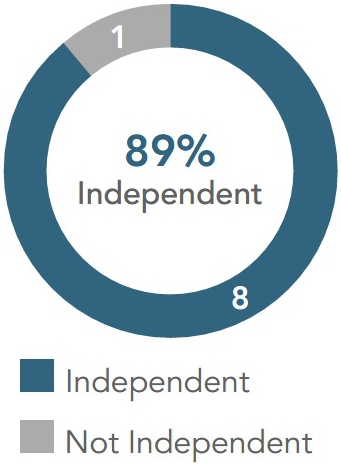 |
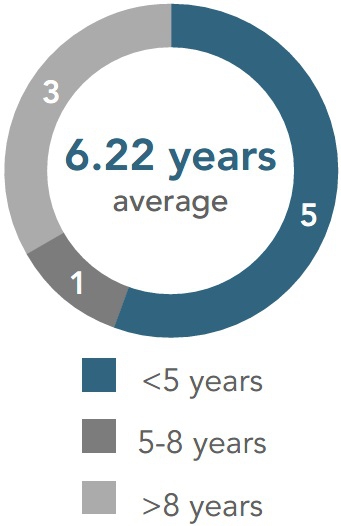 |
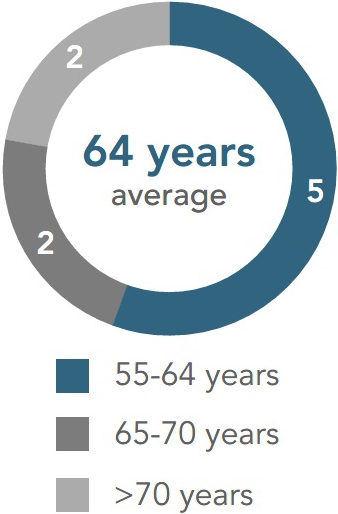 |
| Race/Ethnicity | Gender | |||
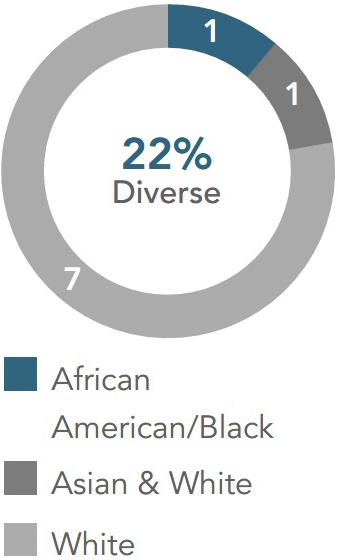 |
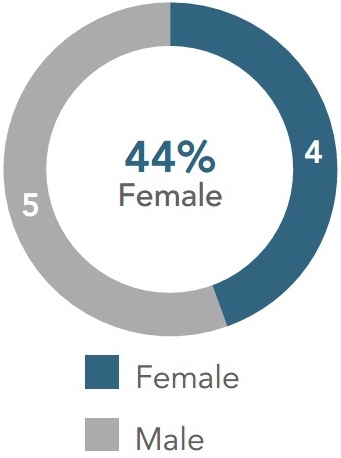 |
| Core Competencies |
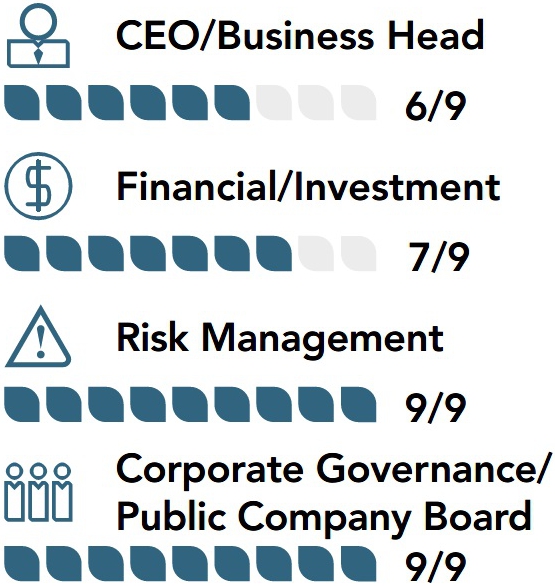 |
| Strategic Skills |
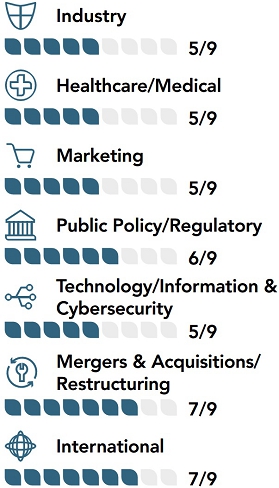 |
For more information on our directors’ skills and why these skills are important to the Board and Genworth’s business, please see Skills Matrix on page 28.
| 10 | Genworth Financial, Inc. |
| Proxy Statement Summary |
Corporate Governance Highlights
Our corporate governance practices are designed to help advance the interests of our stockholders, provide for strong Board and management oversight and accountability and provide guidelines for responsible decision-making. Some of our key governance principles and practices are set forth below, and more information can be found in the Corporate Governance at Genworth section of this Proxy Statement.
|
Board Independence and Composition
✓Board committees consist entirely of independent directors
✓Separate Independent Chair and CEO
✓Female Leadership Key Roles
○Non-Executive Chair of Board
○50% of Committee Chairs
|
Board Performance
✓All directors attended at least 75% of meetings held in 2023
✓Independent directors meet regularly in executive session
✓Annual Board and Committee self-evaluations
|
|||
|
Stockholder Rights
✓Annual election of all directors
✓Majority voting for directors in uncontested elections
✓Stockholder ability to call special meeting
✓No poison pill
|
Policies, Programs and Guidelines
✓Code of Ethics with annual employee acknowledgement
✓Stock ownership requirements for directors and executive officers
✓Anti-hedging and anti-pledging policies for directors and executive officers
✓“Environment, Social and Governance” section of our corporate website and annual Sustainability Report
|
| 2024 Proxy Statement | 11 |
| Proxy Statement Summary |
Executive Compensation Highlights
Compensation Program Features
Our 2023 annual executive compensation program consisted of the following key elements: base salary, annual incentive, and annual long-term incentive grants (which includes performance stock units (“PSUs”) and restricted stock units (“RSUs”)). A significant portion of target executive compensation is completely at risk.
| 2023 CEO Target Compensation | 2023 Other NEO Target Compensation | |
 |
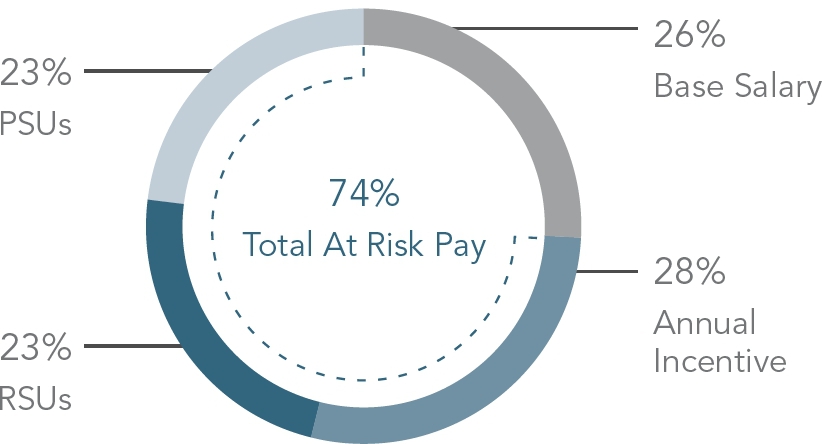 |
Funding Outcomes for Incentive Pay Programs
| Payout Funding | Results Summary | ||||
|
Key Annual Incentive Financial Objectives |
 |
Above Target |
The Enact mortgage insurance business exceeded its goals for adjusted operating income, adjusted return on equity and expense ratio.
The U.S. Life Insurance business exceeded its internal targets in 2023 for IFA approvals and premium rate actions filed under our multi-year rate action plan, GLIC core pre-tax statutory income and customer service experience and operations.
Investments income, purchase yields, and impairments performance all exceeded targets. | ||
|
Key Annual Incentive Non-Financial Objectives |
 |
Above Target |
The company returned capital to stockholders through share buybacks, opportunistically repurchased debt, and managed the company’s leverage ratio below 25%.
Strengthened and expanded the focus on human capital through enhancing employee engagement, diversity, equity, and inclusion efforts, and received “Top Workplace” designation in Richmond, Virginia and Stamford, Connecticut. | ||
|
Long-Term Financial Objectives |
 |
Above Target |
Our 2021-2023 PSU awards payout was driven by Adjusted Operating Income and strong Total Shareholder Return (“TSR”). | ||
| 12 | Genworth Financial, Inc. |
| Proxy Statement Summary |
Stockholder Engagement
Our Board and management value the insights and feedback from our stockholders. We regularly communicate with our stockholders through a variety of channels, including quarterly earnings calls and investor meetings and conferences, and we also actively engage with them throughout the year to discuss matters significant to our business. We seek our stockholders’ input on a variety of matters, including corporate governance, executive compensation and sustainability, among other matters.
Stockholder engagement usually involves a cross-functional team, representing investor relations, sustainability, corporate governance and compensation and benefits, to ensure key topics are covered. Management provides regular updates to the Board throughout the year on stockholder engagement, including insights and feedback received from our stockholders.
During 2023, we engaged in a stockholder outreach campaign to understand our key investors’ views on our strategy, performance, governance practices, Board composition and oversight, compensation programs, and sustainability initiatives, among other topics. In our outreach campaign, we targeted our top 20 stockholders, representing 54% of shares outstanding.
Through our stockholder engagement, we strive to be responsive to our stockholders and use the input received from our stockholders to help inform our strategies and priorities.
| Outreach to our Stockholders Representing 54% of Shares Outstanding |
|
Discussed the following key topics:
●Director Compensation
●Pay-versus-Performance Disclosures
●Corporate Governance, Board Composition and Oversight of Risk
●Executive Compensation Programs
●Officer Exculpation
●Sustainability
●Implementation of New U.S. GAAP Accounting Guidance
|
| 2024 Proxy Statement | 13 |
| Proxy Statement Summary |
Sustainable Compassion & Care
Building on our foundation of robust governance practices, we strive to create long-term value for our key stakeholders – executing with competence, compassion, and care.
We believe our sustainability efforts contribute meaningfully to our success as a company and we remain committed to continuing to integrate our sustainability strategy into our business strategy. We invite you to review our 2023 Sustainability Report to learn more about our collective accomplishments and plans to continue serving our customers, our colleagues and our community.
 |
Our People | |
|
We are committed to helping families become more financially secure, self-reliant and prepared for the future, and that philosophy extends to our employees. We take a holistic approach to human capital management, including attracting and retaining talent with comprehensive benefits and compensation packages, providing professional development and learning opportunities, facilitating access to dedicated resources that foster an equitable and inclusive environment and encouraging a sincere commitment to community service and involvement. | |||
| Total Rewards
Our compensation package, including salary, bonus and long-term incentives, aligns employee and stockholder interests.
In addition to a competitive compensation program, we also offer our employees benefits such as life and health insurance, paid time off, paid family leave, identity theft protection, financial planning and a retirement savings plan.
|
Well-Being
To further support our employees, we continue to provide financial, health and wellbeing resources, as well as a flexible work schedule to allow employees additional time for self-care and the care of family members. | ||
|
In 2023, we introduced a new rewards and recognition platform that encourages our employees to recognize one another for exemplifying our values to make it human, make it about others, make it happen, and make it better as they serve our current and future customers. | |||
|
Learning & Development
We offer a multitude of professional development and career enrichment opportunities, including building leadership skills, professional skills training and industry-specific matters, as well as education reimbursement benefits and student loan repayments to aid career progression.
Additionally, we facilitate an annual organization-wide talent management process to support career development, progression and succession planning. |
Social Responsibility
We use our outreach platforms, including the Genworth Foundation, to extend our very purposeful impact in our communities through grants, program sponsorships, paid volunteer time for our employees, and employee-directed charitable giving. We align philanthropic efforts with our primary business focus areas, our commitment to sustainability, and other programs that are important to our employees. | ||
| 14 | Genworth Financial, Inc. |
| Proxy Statement Summary |
|
Our Culture
We are committed to fostering an inclusive work environment that encourages employees to be their authentic selves. Our executive leadership established a diversity, equity, and inclusion (DE&I) executive steering committee to emphasize the importance of Genworth’s diversity philosophy. We have built and continue to actively engage strong community connections and partnerships with diverse organizations to promote equitable opportunities and have implemented training initiatives to enhance employee inclusivity and self-awareness.
We empower our employees to embrace their differences and commonalities to contribute to a culture of belonging. To help in this important work, we have 13 Employee Resource Groups (ERGs) that connect associates who share affinities, characteristics, life experiences, or who are interested in supporting these groups as allies. Our ERGs are voluntary associate-led groups that host events and learning opportunities to celebrate the culture, heritage and contributions of the communities they represent.
We are proud to embrace a future where the diversity of our associates, leadership and executives contribute to a culture of belonging and inclusion. As of December 31, 2023, we employed approximately 2,700 full-time and part-time employees globally, none of which are subject to a collective bargaining agreement. Women comprised approximately 61% of our total U.S. employee population, while 34% of our employees in the U.S. were ethnically diverse. Among people leaders in the U.S., 46% were women and 24% were ethnically diverse and for our senior management, which we designate based on internal human resource compensation levels, 32% were women and 22% were ethnically diverse. With respect to the eight members of our non-management Board of Directors, four are women and two are ethnically diverse. In addition, as of January 1, 2024, of the five senior leaders of our top business lines and our investments group, three are women and four are ethnically diverse. |
 |
Our Community | |
|
Care-Centered Philanthropic Platform
We are committed to active and meaningful community engagement to support health, vitality, and economic empowerment. In 2023, our primary areas of philanthropic focus included Healthy Aging and Caregiving, Senior Affordable Housing and Homelessness, and Sustainability. Genworth contributed almost $1 million in sponsorships to organizations that align with our philanthropic focus areas in 2023. |
|
Employee Engagement
We support civic engagement through paid volunteer time for our employees, our event sponsorship program, employee-directed charitable gifts through the Genworth Foundation, and our commitment to environmental sustainability.
Including matching gifts, Genworth employees donated nearly $870,000 to non-profit organizations globally and volunteered close to 5,500 hours during 2023. | |
|
Genworth Foundation
The Genworth Foundation awarded grants and other funding totaling over $2.4 million in 2023. Our foundation also contributed more than $351,000 in matching gifts, employee volunteer rewards, and other service donations. |
| 2024 Proxy Statement | 15 |
| Proxy Statement Summary |
 |
The Environment | |
|
Assessing Climate Risk
Genworth has engaged in both qualitative and quantitative analyses to assess climate risk exposure and again achieved a “B” (Management) score on our 2023 CDP (Carbon Disclosure Project) submission (reflecting efforts and initiatives undertaken in 2022). |
|
Investing Purposefully and Responsibly
We understand that sustainability begins with our fiduciary responsibility to honor the promises to our policyholders. Accordingly, we integrate environmental, social and governance (“ESG”) considerations into our analysis of investments that fall within our core investment parameters and provide sustainable market returns. As of December 31, 2023, Genworth held more than $775 million in sustainable investments and investment commitments, including $515 million in green, social, sustainability, and sustainability-linked bonds with $235 million invested in hydro, wind, solar, and energy-efficiency projects and a $25 million commitment to an energy transition private equity fund.
|
 |
Our Board Oversight of Sustainability | |
| We believe that effective corporate governance helps promote the long-term interests of our stockholders and strengthens Board and management oversight and accountability. We have created a governance framework that ensures we have a culture of management accountability, which helps us to uphold Genworth’s commitment to corporate responsibility and protects the interests of our stakeholders. |
|
Governance Committee The Nominating and Corporate Governance Committee has general oversight of our ESG policies and practices and regularly reviews our sustainability platform. In addition, this committee has specific oversight responsibilities over our: ●Political contributions and expenditures, including periodically reviewing the nature and amount of the company’s political contributions and expenditures, the operations of the company’s Political Action Committee and the company’s public disclosure regarding such activities;
●Philanthropic programs and financial and other support of charitable, education and cultural organizations as well as the company’s community volunteer activities; and
●Environmental policy and practices.
|
|
Compensation Committee
The Management Development and Compensation Committee (the “Compensation Committee”) has oversight responsibility relating to executive compensation and succession planning. This committee also oversees matters related to Genworth’s human capital management strategy. In 2023, this committee received updates on our diversity and inclusion initiatives as well as on the recruitment, retention, and engagement of our associates. In addition, this committee also oversees our Human Rights Policy. |
|
Risk Committee
The Risk Committee is responsible for oversight of enterprise risk management, our information security programs, and our investment portfolio and strategy, among other things. This committee considers climate-related risks in its assessments of standard operational risks, including risks related to the regulatory environment, technology, and Genworth’s reputation. In 2023, the Risk Committee received regular updates related to data security and cybersecurity matters and discussed emerging risks including artificial intelligence and the potential impact of climate risk.
|
| 16 | Genworth Financial, Inc. |
Genworth Board of Directors
|
Proposal 1
Election of Nine Directors Named in the Proxy
Statement |
At the 2024 Annual Meeting, nine directors are to be elected to hold office until the 2025 Annual Meeting of Stockholders and until their successors have been duly elected and qualified or until the earlier of their resignation or removal in a manner provided for in our Bylaws. Our Board has nominated Sen. Conrad, Lt. Gen. Dyson, Ms. Goodman, Ms. Higgins, Mr. McInerney, Mr. Mills, Mr. Restrepo, Ms. Sarsynski and Mr. Smith to be elected by the holders of our common stock at the 2024 Annual Meeting. Each of the Board’s nine director nominees currently serves on our Board. We are not aware of any reason why any Board nominee would be unable to serve as a director. If a nominee is unable to serve, the shares represented by all valid proxies will be voted for the election of any other person that our Board may nominate as a substitute.
The Board’s nine nominees for election at the 2024 Annual Meeting are individuals with diverse experience at policy-making levels in business and government and in other areas that are relevant to our company. As discussed in the following pages, each of the Board’s director nominees was nominated on the basis of the unique set of qualities, experience and skills he or she brings to the Board, as well as how those qualities, experience and skills blend with those of the other directors on the Board as a whole. The combination of these nominees’ diverse qualities, experience and skills ensures that issues facing our company are examined and addressed with the benefit of a broad array of perspectives and expertise. The Board has determined that eight of the nine nominees are independent directors under the NYSE listing requirements and our Governance Principles, which are discussed below under Corporate Governance Policies and Procedures.
 |
The Board recommends that stockholders vote FOR the election of Sen. Conrad, Lt. Gen. Dyson, Ms. Goodman, Ms. Higgins, Mr. McInerney, Mr. Mills, Mr. Restrepo, Ms. Sarsynski and Mr. Smith. |

| 2024 Proxy Statement | 17 |
| Genworth Board of Directors |
Board’s Nominees
Director Bios
Former U.S. Senator

Committees: ●Nominating and Corporate Governance (Chair)
●Risk
Director Since: March 2013 |
QUALIFICATIONS
Sen. Conrad brings to the Board extensive knowledge of and insights into public policy, fiscal affairs, government relations and regulatory affairs through his 26 years serving as a U.S. Senator for North Dakota. During his service as a United States senator, Sen. Conrad successfully negotiated the budget for the United States as Chairman of the Senate Budget Committee, oversaw Social Security and Medicare programs and U.S. tax policy as a Senior Member of the Senate Finance Committee, and helped oversee the Intelligence function of the United States as a member of the Senate Select Committee on Intelligence. Sen. Conrad’s formidable experience in both Federal and State government positions brings significant leadership experience and a valuable perspective to his role as Chair of the Nominating and Corporate Governance Committee, as well as the Board’s handling of governance, risk, and regulatory issues, and the company’s engagement with regulators on certain public policy issues. | |||||
| SKILLS | ||||||
 |
Risk Management |
 |
Corporate Governance/ Public Company Board |
 |
Healthcare/Medical | |
 |
Public Policy/Regulatory |
 |
International | |||
|
|
||||||
| ● | Strategic advisor to Molina Healthcare, Inc. since 2014 |
| ● | Advisor to the CEO of the Baltimore Orioles since 2020 |
| ● | U.S. Senator representing the State of North Dakota from January 1987 to January 2013 |
| ● | Chairman or Ranking Member of the Senate Budget Committee for 12 years, Senior Member of the Senate Finance Committee and Member of the Senate Select Committee on Intelligence |
| ● | Tax Commissioner for the State of North Dakota from 1981 to 1986 and Assistant to the Tax Commissioner from 1974 to 1980 |
| ● | Co-chair of the Economic Advisory Board for The American Edge Project since 2022 |
| ● | Member of the board of directors of the Committee for a Responsible Federal Budget since 2014 |
| ● | Senior Fellow for the Bipartisan Policy Center since 2014 |
| 18 | Genworth Financial, Inc. |
| Genworth Board of Directors |
Lieutenant General, U.S. Army, Retired
 Committees: ●Audit
●Management Development and Compensation (Chair)
Director Since: December 2020 |
QUALIFICATIONS
Lt. Gen. Karen Dyson is a qualified financial expert, whose distinguished military career spanned more than 35 years. During her career, she led efforts building, executing and reporting on the Army’s multi-appropriation budget; commanded units and led troops in war operations; and led strategic transformation initiatives. Lt. Gen. Dyson is a strategic leader with corporate governance, risk oversight and management development and compensation experience. Her extensive financial management and board experience also provide the Board with critical insight into corporate financials, macroeconomic trends and risk mitigation. Her background in financial oversight, talent development and succession planning in the U.S. Army, along with her development of the framework for the Army’s first ever financial statements audit, position her well to chair the Management Development and Compensation Committee and serve on the Audit Committee. | |||||||
| SKILLS | ||||||||
 |
Financial/ Investment |
 |
Risk Management |
 |
Corporate Governance/ Public Company Board |
 |
Public Policy/ Regulatory | |
 |
Technology/ Information & Cybersecurity |
 |
Mergers and Acquisition/ Restructuring |
 |
International | |||
| |
||||||||
| ● | Military Deputy to the Assistant Secretary of the Army for Financial Management and Comptroller from August 2014 to August 2017 |
| ● | First female finance officer to achieve three-star general officer rank in August 2014 |
| ● | National Association of Corporate Directors (NACD) Directorship Certified |
| ● | Director of USAA Federal Savings Bank since October 2017 (serving as nominations and governance committee chair) |
| ● | Director of CALIBRE Systems, Inc. since October 2018 (serving as audit committee chair) |
| ● | Director of Army Emergency Relief Organization since 2020 |
| 2024 Proxy Statement | 19 |
| Genworth Board of Directors |
Managing Director, Foros Advisors LLC
 Committees:
●Management Development and Compensation
●Nominating and Corporate Governance
Director Since: March 2021 |
QUALIFICATIONS
Ms. Goodman has a distinguished background in strategic advisory work, with more than 25 years of experience advising corporations on mergers and acquisitions, including issues related to capital structure and financing. As a result of these experiences, she has a sharp understanding of how to assess organic business plans and create and execute concrete plans to enhance long-term value creation. As a former corporate and securities lawyer, Ms. Goodman also brings important insights in those areas to the Board. Given her particular expertise in complex corporate governance matters and long history in the boardroom as both a director and advisor, she is a valuable member of both the Nominating and Corporate Governance and Management Development and Compensation Committees. | |||||
| SKILLS | ||||||
 |
CEO/Business Head |
 |
Financial/Investment |
 |
Risk Management | |
 |
Corporate Governance/ |
 |
Healthcare/ Medical |  |
Mergers and Acquisition/ Restructuring | |
|
|
||||||
| ● | Managing Director of Foros Advisors LLC, a strategic financial and mergers and acquisitions advisory firm, since November 2013 |
| ● | Managing Director and Head, Special Committee and Fiduciary Practice—U.S. at Rothschild & Co. from 2010 to October 2013 |
| ● | Managing Director in the Mergers & Acquisitions and Strategic Advisory Group of, and various prior positions with, Lazard from 1998 to 2010 |
| ● | Director of Cboe Global Markets, Inc. (BATS: CBOE), a leading provider of trading, clearing and investment solutions to market participants around the world, since 2012 (serving as finance and strategy committee chair and as a member of the executive and nominating and governance committees) |
| ● | Director of Cover Genius Pty Ltd, a private global insurance technology company, since February 2022 (serving as audit and risk committee chair and as a member of the compensation committee) |
| 20 | Genworth Financial, Inc. |
| Genworth Board of Directors |
Former Partner, The Goldman Sachs Group, Inc.
 Committees:
●Audit
●Management, Development and Compensation
Director Since: September 2013 |
QUALIFICATIONS
Ms. Higgins is a qualified financial expert and has extensive financial services and investment experience. Having spent nearly 20 years building and leading a successful investment business at Goldman Sachs, Ms. Higgins is well-versed in portfolio management, assessing market risks and building businesses. During her tenure on the Board, Ms. Higgins has also served on all of Genworth’s standing Board committees. Ms. Higgins’ skills, extensive experience on numerous public and private companies’ boards and service on all of the Board’s standing committees, are valuable in her role as Board Chair and as a member of the Audit and Management Development and Compensation Committees. | |||||||
| SKILLS | ||||||||
 |
CEO/Business Head |
 |
Financial/ Investment |
 |
Risk Management |
 |
Corporate Governance/ Public Company Board | |
 |
Healthcare/ Medical |
 |
Mergers and Acquisition/ Restructuring |
 |
International | |||
| |
||||||||
| ● | Retired in 2010 from a nearly 20-year career in various positions at The Goldman Sachs Group, Inc., where she served as Managing Director from 2001 and as Partner from 2002 |
| ● | Other notable positions during her tenure include Head of the Americas for Private Debt; Co-Chairperson of the Investment Advisory Committee for the GS Mezzanine Partners funds; and a member of the Investment Committee for the Principal Investment Area (one of the largest alternative asset managers in the world), which oversaw and approved global private equity and private debt investments |
| ● | Director of Viatris Inc. (Nasdaq: VTRS) since November 2020 (serving as non-executive chair, finance committee chair and executive committee chair) |
| ● | Non-Executive Chair of the Board of Antares Midco, Inc. since January 2016 |
| ● | Member of the Women’s Leadership Board of Harvard University’s John F. Kennedy School of Government since March 2015 |
| ● | Former director of Mylan N.V. (Nasdaq: MYL) from February 2013 to November 2020 |
| ● | Former director of NextGen Acquisition Corp. II (Nasdaq: NGCA) from March 2021 to December 2021 |
| 2024 Proxy Statement | 21 |
| Genworth Board of Directors |
President and Chief Executive Officer, Genworth Financial, Inc.

Committees: None
Director Since: January 2013 |
QUALIFICATIONS
Mr. McInerney brings to his role extensive knowledge of the insurance and financial services industries and risk management within those industries through his more than 40 years of experience, including previous leadership roles at ING Groep NV, Aetna and Boston Consulting Group, Inc. Mr. McInerney’s broad operating experience over many decades leading complex global insurance businesses provides Genworth with important, well-informed insights into navigating market dynamics, establishing new business lines and leading organizations through significant change. | |||||||
| SKILLS | ||||||||
 |
CEO/Business Head |
 |
Financial/ Investment |
 |
Risk Management |
 |
Corporate Governance/ Public Company Board | |
 |
Industry |
 |
Healthcare/ Medical |
 |
Marketing |
 |
Public Policy/ Regulatory | |
 |
Mergers and Acquisition/ Restructuring |
 |
International | |||||
| ● | President and Chief Executive Officer of Genworth since January 2013 |
| ● | Senior Advisor to the Boston Consulting Group, Inc. from June 2011 to December 2012, providing consulting and advisory services to leading insurance and financial services companies in the United States and Canada |
| ● | Member of ING Groep NV’s Management Board for Insurance from October 2009 to December 2010, where he was the Chief Operating Officer of ING Groep NV’s insurance and investment management business worldwide |
| ● | Variety of senior roles with ING Groep NV and leadership positions with Aetna Inc., where he began his career as an insurance underwriter in June 1978 |
| ● | Director of Enact Holdings, Inc. (Nasdaq: ACT), a majority-owned subsidiary of Genworth, since its IPO in September 2021 |
| ● | Director of United Way Worldwide since 2023 |
| ● | Director of Virginia Learns since 2022 |
| ● | Director of Global Research Institute at William & Mary since 2021 |
| ● | Chair of the Board at Virginia Ready since 2023 |
| ● | Member of the American Council of Life Insurers since 1995 and serves, and has served, on its CEO Steering Committees and Board |
| 22 | Genworth Financial, Inc. |
| Genworth Board of Directors |
Executive Vice President of Business Development and External Affairs, beeXact
 Committees: ●Nominating and Corporate Governance
●Risk
Director Since: March 2021 |
QUALIFICATIONS Mr. Mills has extensive experience leading global insurance regulatory functions for both private and government entities, including at Deloitte LLP as Global Insurance Regulatory Leader and as Superintendent of the New York State Insurance Department. During his tenure as Superintendent, Mr. Mills worked closely with insurance companies to advance critical regulations and led the New York Department’s transition to risk-based examinations. As Senior Advisor to McKinsey & Company, Mr. Mills advises boards and executives on regulatory and reputational risk, executive positioning, strategy, environmental, social and governance (“ESG”) matters, financial communications, crisis management, mergers and acquisitions and public policy, allowing him to provide significant insights to the Board on these topics. Mr. Mills also brings to the Nominating and Corporate Governance and Risk Committees a keen understanding of state insurance regulatory frameworks and agencies, as well as various aspects of risk preparedness, including enterprise risk and strategic risk. | |||||||
| SKILLS | ||||||||
 |
Risk Management |
 |
Corporate Governance/ Public Company Board |
 |
Industry |  |
Healthcare/ | |
 |
Marketing |
 |
Public Policy/ Regulatory |
 |
Technology/ Information & Cybersecurity |
 |
International | |
| |
||||||||
| ● | Executive Vice President of Business Development and External Affairs of beeXact, a geospatial data management/EngineeringTech company that designs fiber optic networks and provides municipal digital twin services, since 2021 |
| ● | Senior Advisor to McKinsey & Company since 2021 |
| ● | Managing Director and Global Insurance Regulatory Leader at Deloitte LLP from 2007 to May 2019, serving Deloitte LLP’s largest U.S. and global insurance clients |
| ● | Superintendent of the New York State Insurance Department from 2005 to 2006 |
| ● | Served three terms in the New York State Assembly from 1999 to 2004, where he was Deputy Minority Leader and a member of the National Council of Insurance Legislators |
| ● | NACD Governance Fellow |
| ● | Director of The Doctors Company Group since May 2019, the largest physician-owned medical liability insurer in the U.S. (serving as a member of the audit committee and technology and cybersecurity committee) |
| ● | President and Director of the Insurance Federation of New York since 2020 |
| ● | Trustee of The Institutes Griffith Insurance Education Foundation since 2011 |
| ● | Former director of Ensight, a SaaS insurance sales platform, from June 2019 to January 2022 |
| 2024 Proxy Statement | 23 |
| Genworth Board of Directors |
Former Chairman and President and Chief Executive Officer, State Auto Financial Corporation

Committees: ●Audit (Chair)
●Management Development and Compensation
Director Since:
December 2016 |
QUALIFICATIONS
Mr. Restrepo is a qualified financial expert and has more than 40 years of insurance, finance and risk management experience after serving as the Chairman, President and Chief Executive Officer of State Auto Financial Corporation and holding other roles at several of the country’s leading insurers. Mr. Restrepo brings to the Board deep knowledge of and perspective on leading corporate governance, organizational management, strategic planning and risk mitigation. His extensive experience leading large insurance companies is vital to his role as Chair of the Audit Committee and his service on the Management Development and Compensation Committee. | |||||||
| SKILLS | ||||||||
 |
CEO/Business Head |
 |
Financial/ Investment |
 |
Risk Management |
 |
Corporate Governance/ Public Company Board | |
 |
Industry |
 |
Marketing |
 |
Public Policy/ Regulatory |
 |
Technology/ | |
 |
Mergers and Acquisition/ Restructuring |
|||||||
| ● | Retired from State Auto Financial Corporation in 2015, having served as its Chairman from 2006 to December 2015 and as its President and Chief Executive Officer from 2006 to May 2015 |
| ● | Over 40 years of insurance industry experience, having held executive roles at Main Street America Group, Inc., The Hanover Insurance Group Inc. (formerly Allmerica Financial Corp.), The Travelers Companies, Inc. and Aetna Inc. |
| ● | NACD Directorship Certified |
| ● | Professional Director – Public Company credential from the American College of Corporate Directors |
| ● | Director of RLI Corp. (NYSE: RLI), a property and casualty insurance company, since July 2016 (serving as chair of the nominating/governance committee and as a member of the finance and investment committee) |
| ● | Director of Enact Holdings, Inc. (Nasdaq: ACT), a majority-owned subsidiary of Genworth, since its IPO in September 2021 (serving as a member of the audit and nominating and corporate governance committees) |
| ● | Director of The Larry H. Miller Group of Companies since November 2015 |
| ● | Former director of Majesco, a provider of insurance software and consulting services, from August 2015 to September 2020 |
| 24 | Genworth Financial, Inc. |
| Genworth Board of Directors |
Former Chairwoman, Chief Executive Officer and President, MassMutual International

Committees: ●Audit
●Risk (Chair)
Director Since: March 2022 |
QUALIFICATIONS
Ms. Sarsynski is a qualified financial expert and has extensive experience as both an executive and director at certain of the nation’s largest insurance companies, including MassMutual and Aetna. In her decades of service at both public and private companies, she has led strategic turnarounds for global businesses and overseen significant growth and risks across business units and geographies. Ms. Sarsynski provides the Board with strong experience in financial services, insurance, compliance, risk management, operations, investments and real estate. These experiences position her well to chair the Risk Committee and serve on the Audit Committee. | |||||||
| SKILLS | ||||||||
 |
CEO/Business Head |
 |
Financial/ Investment |
 |
Risk Management |
 |
Corporate Governance/ Public Company Board | |
 |
Industry |
 |
Marketing |
 |
Public Policy/ Regulatory |
 |
Technology/ | |
 |
Mergers and Acquisition/ Restructuring |
 |
International | |||||
| ● | Chairwoman, Chief Executive Officer and President of MassMutual International from 2006 to 2017 |
| ● | President of MassMutual Retirement Services from 2008 to 2016 |
| ● | Executive Vice President from 2006 to 2017 of MassMutual, member of MassMutual’s Office of the Chief Executive Officer from 2008 to 2017 and Chief Administrative Officer of MassMutual from September 2005 to 2008 |
| ● | Managing Director at Babson Capital Management LLC, a MassMutual subsidiary in 2005 |
| ● | Served two elected terms as First Selectman for the town of Suffield, Connecticut from 2001 to 2005 |
| ● | Founded Sun Consulting Group LLC in 1998, offering real estate advisory and consulting services |
| ● | Multiple senior management positions for 17 years at Aetna Inc., overseeing segments of the company’s Investments Division and leading the Corporate Finance Department |
| ● | NACD CERT certificate in Cybersecurity Oversight earned in 2023 |
| ● | FINRA Registrations for Series 7 and 24 from 2009 to 2019 |
| ● | Director of TI Fluid Systems PLC (LSE: TIFS) since 2018 |
| ● | Director of Horizon Technology Finance Corporation (Nasdaq: HRZN, NYSE: HTFB, HFTC) since 2012 |
| ● | Director of Horace Mann Educators Corporation (NYSE: HMN) since 2021 |
| ● | Former director of AXA S.A. from 2018 to 2021 |
| 2024 Proxy Statement | 25 |
| Genworth Board of Directors |
Founder and Chief Executive Officer, ALEX.fyi
 Committees:
●Nominating and
Corporate Governance
●Risk
Director Since: March 2021 |
QUALIFICATIONS
Mr. Smith has extensive experience in securities and annuities businesses, having spent more than 20 years leading equity derivatives teams and as a mergers and acquisitions analyst with The Goldman Sachs Group, Inc. and Credit Suisse AG, respectively, as well as founding and leading ALEX.fyi, a retirement solutions company, and ALEXIncome, a retirement consulting company. His experience developing and launching a new business venture provides valuable insight as the company pursues growth and establishes new business lines. Mr. Smith brings to the Board, along with the Nominating and Corporate Governance and Risk Committees, a deep understanding of risk management, finance and insurance markets. | |||||||
| SKILLS | ||||||||
 |
CEO/Business Head |
 |
Financial/ Investment |
 |
Risk Management |
 |
Corporate Governance/ Public Company Board | |
 |
Industry |
 |
Marketing |
 |
Public Policy/ Regulatory |
 |
Technology/ | |
 |
Mergers and Acquisition/ Restructuring |

|
International | |||||
| ● | Founder and CEO of ALEX.fyi, a retirement solutions company, since 2016 and founding partner of ALEXIncome, a retirement consulting company, since 2023 |
| ● |
Various positions at The Goldman Sachs Group, Inc. for two decades from 1995 to 2016, most recently as Managing Director, Equity Derivative Sales, Head of Insurance
○Built out the Life Insurance business at The Goldman Sachs Group, Inc. from 2007 to 2016 |
| ● | Analyst at Credit Suisse AG from 1990 to 1993 |
| ● |
Active in philanthropic activities, including serving on the Board of Sponsors for Educational Opportunity since 2008 and previously serving for 6 years on the Board of Trustees at the Dalton School in New York City |
| 26 | Genworth Financial, Inc. |
| Genworth Board of Directors |
Board’s Director Nominee Selection
Board Composition
The number of directors of our company is fixed from time to time by a resolution adopted by our Board, but will not be less than one nor more than 15. Our Governance Principles state that the size of the Board should generally be in the range of seven to 15 directors and the actual size will be affected by practical considerations as the needs of the Board evolve over time. Our Board currently consists of nine members, eight of whom the Board has affirmatively determined are independent. Each of our current directors has been nominated by the Board to stand for election.
Each director elected by the holders of our common stock will serve until the 2025 Annual Meeting and until his or her successor is duly elected and qualified, or until the earlier of his or her resignation or removal in a manner provided for in the Bylaws.
We believe the Board’s director nominees are a talented group of individuals with a variety of relevant qualities, experience, skills and professional backgrounds, as reflected in their biographies beginning on pages 18-26. We believe our Board benefits significantly from this diversity of experience, as well as the tenure, racial/ethnic and gender diversity of its members.
Director Selection
Our Governance Committee oversees the director selection and nomination process by considering potential candidates and evaluating such candidates’ independence, qualities, experience and skills, including in the context of the full Board. In recommending the Board’s director nominees, our Governance Committee considers, among other things, the qualities, experience and skills discussed below and in Section 3 of our Governance Principles, which are available on our website: investor.genworth.com/corporate-governance/governance-documents. Our Governance Committee and Board believe that each of the Board’s director nominees possesses the core qualities discussed below and brings a unique set of qualities, experience and skills that are reflected below in the skills matrix.
Independence
In consultation with our Governance Committee, our Board assesses independence for each director when the director is first elected to the Board and annually thereafter for all director nominees.
For a director to be independent, the Board must determine that the director does not have any material relationship with Genworth either directly or as a partner, stockholder or officer of an organization that has a relationship with Genworth.
The Board has established guidelines to assist it in determining director independence, which conform to, or are more exacting than, the independence requirements in the applicable rules and listing standards of the NYSE. The independence guidelines are set forth in Section 6 of our Governance Principles, which are available on our website: investor.genworth.com/corporate-governance/governance-documents. The Board also will consider all relevant facts and circumstances in making an independence determination, and not merely from the standpoint of the director, but also from that of persons or organizations with which the director has an affiliation. Our Board has determined that the purchase of Genworth products and services on the same terms available to unaffiliated entities or persons does not impair a director’s independence and therefore such purchases are not considered by our Board when making independence determinations.
Our Board has determined that Sen. Conrad, Lt. Gen. Dyson, Ms. Goodman, Ms. Higgins, Mr. Mills, Mr. Restrepo, Ms. Sarsynski and Mr. Smith satisfy the NYSE’s independence requirements and Genworth’s independence guidelines.
| 2024 Proxy Statement | 27 |
| Genworth Board of Directors |
Core Qualities
Our Board looks for directors who possess the following core qualities that the Board believes assist it in overseeing our operations and developing and pursuing our strategic objectives:
●highest personal and professional ethics, integrity and values;
●commitment to representing the long-term interests of our stockholders;
●inquisitive and objective perspective, practical wisdom and mature judgment;
●a distinct skill set of value to the Board and the company when viewed alone and in combination with the skills of other directors;
●willingness and ability to devote sufficient time to carrying out his or her duties and responsibilities effectively; and
●commitment to serve on the Board for an extended period of time. |
Additional Qualities
In addition to the core qualities discussed above, the Board identifies certain key qualities, experience and skills, from time to time, that it believes are currently important to Genworth’s business, and therefore, significant to have represented on the Board as a whole.
These qualities, experience and skills are among the items considered by the Governance Committee in evaluating the Board’s director nominees. Each director nominee is not expected to possess every attribute – rather the attributes of each director nominee are considered in the context of the Board’s overall make-up of qualities, experience and skills. The blend of our directors’ qualities, experience and skills helps ensure that our Board is well-positioned to examine, address and provide oversight of the issues facing the company and its business. We believe that the Board’s director nominees have demonstrated leadership, sound judgment and integrity in a variety of positions across various professions and industries.
Skills Matrix
The skills matrix below is intended as a high-level summary and not an exhaustive list of each director’s skills or contributions to the Board. Additional information about each director nominee’s qualities, experience and skills can be found under Director Bios. Also summarized below is why these key qualities, experience and skills are important to the Board and Genworth’s business.
| 28 | Genworth Financial, Inc. |
| Genworth Board of Directors |
CORE COMPETENCIES
●CEO/Business Head: Provides leadership perspectives with practical understanding of organizations, operations, strategy and risk management.
●Financial/Investment: Assists our directors in understanding and overseeing our financial reporting and internal controls, as well as evaluating our financial statements and investment strategy.
●Risk Management: Provides critical perspectives for the Board’s role in overseeing the risks facing Genworth.
●Corporate Governance/Public Company Board: Supports our goals of strong governance with Board and management accountability, transparency and protection of stockholder interests.
STRATEGIC SKILLS ●Industry: Provides insight on issues specific to our businesses within the financial services industry.
●Healthcare/Medical: Assists our directors in understanding and reviewing our business and strategy.
●Marketing: Supports Genworth as it seeks to identify and develop new markets for its financial products and services.
●Public Policy/Regulatory: Provides valuable insight and guidance to Genworth to help navigate governmental and regulatory actions that impact our businesses.
●Technology/Information & Cybersecurity: Provides relevant insight as Genworth looks for ways to enhance the customer experience and internal operations and oversee technology/information & cybersecurity risk.
●Mergers and Acquisitions/Restructuring: Provides experience to assist Genworth with a practical understanding of developing, implementing and assessing our operating plan and business strategy.
●International: Provides helpful perspectives as Genworth evaluates growing our business outside of the United States. |
| 2024 Proxy Statement | 29 |
| Genworth Board of Directors |
 |
 |
 |
 |
 |
 |
 |
 |
 | |||
 |
 |
CEO/Business Head |  |
 |
 |
 |
 |
 | |||
 |
Financial/Investment |  |
 |
 |
 |
 |
 |
 | |||
 |
Risk Management |  |
 |
 |
 |
 |
 |
 |
 |
 | |
 |
Corporate Governance/Public Company Board |  |
 |
 |
 |
 |
 |
 |
 |
 | |
 |
 |
Industry |  |
 |
 |
 |
 | ||||
 |
Healthcare/Medical |  |
 |
 |
 |
 |
|||||
 |
Marketing |  |
 |
 |
 |
 | |||||
 |
Public Policy/Regulatory |  |
 |
 |
 |
 |
 |
||||
 |
Technology/Information & Cybersecurity |  |
 |
 |
 |
 | |||||
 |
Mergers and Acquisition/Restructuring |  |
 |
 |
 |
 |
 |
 | |||
 |
International |  |
 |
 |
 |
 |
 |
 | |||
| 30 | Genworth Financial, Inc. |
| Genworth Board of Directors |
Board Diversity
Our Board believes that director diversity is important to serving the long-term interests of stockholders. Our Governance Committee, as a matter of practice, takes diversity factors into account when considering potential director nominees and actively seeks to achieve a diversity of occupational and personal backgrounds, viewpoints, education and skills on the Board, including diversity with respect to demographics such as gender, race, ethnicity, national origin and age. Our Governance Committee strives to have a board representing diverse experience at policy-making levels in other areas that are relevant to the company’s businesses.
In addition, our Board believes that a range of tenures helps foster a diversity of perspectives and experience as longer-tenured directors provide continuity and important historical insights into the company and its operations, while newer directors bring fresh perspectives. However, the Board does not believe that arbitrary term limits on directors’ service are appropriate. In 2023, the Board revised our Governance Principles to eliminate a specific suggested retirement age, while continuing to annually review director age and tenure, along with experience, qualifications and other relevant criteria in the overall mix of the Board when considering director nominations. As discussed above, our Governance Committee and the Board regularly review the appropriate experience, skills, attributes, qualifications, age and tenure required for directors in the context of the current make-up of the Board and needs of the company. This process includes considering feedback received on director performance during the self-evaluation process when deciding whether to renominate a director for election.
The current attributes of the Board’s director nominees are set forth below.
| Independence | Tenure | Age |
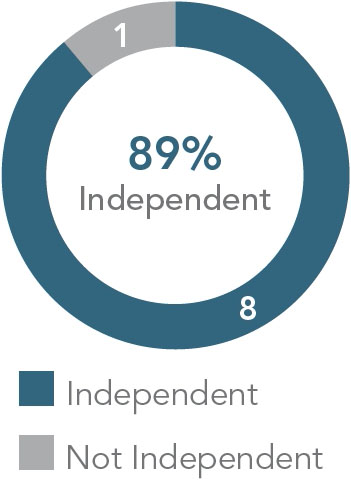 |
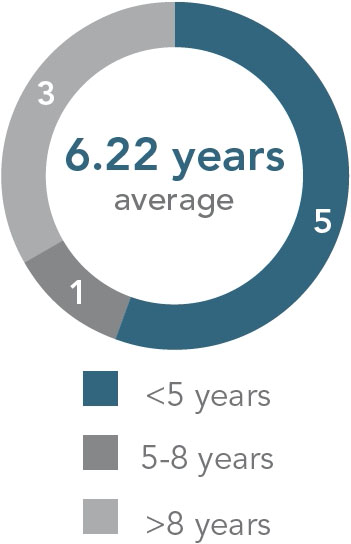 |
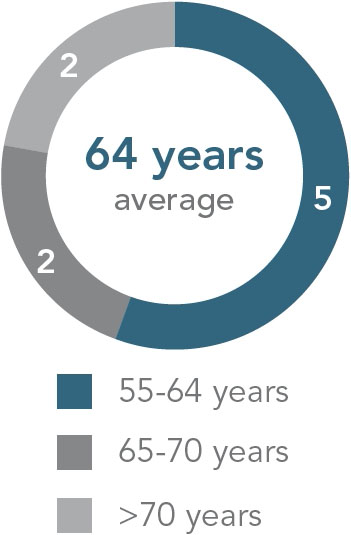 |
| Race/Ethnicity | Gender |
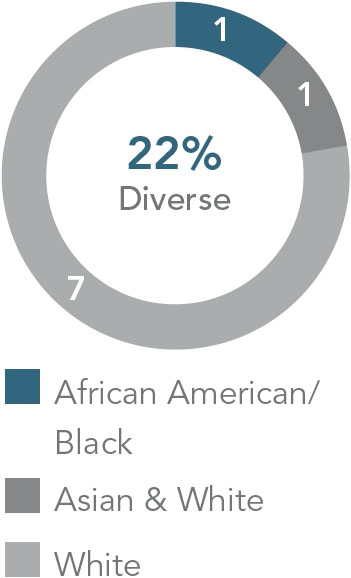 |
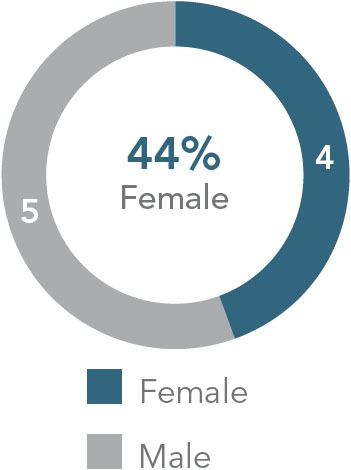 |
| 2024 Proxy Statement | 31 |
| Genworth Board of Directors |
Selection Process Highlights
Our Governance Committee considers candidates suggested by stockholders, current directors, company officers, employees and others. We have also historically engaged an outside search firm to assist us in identifying and evaluating potential director candidates. Our Governance Committee recommends director candidates to the Board for election, and our Board nominates director candidates and makes voting recommendations to our stockholders. Our Governance Committee typically carries out this responsibility through the multi-faceted process described below.
| Succession Planning |
The Governance Committee regularly and actively evaluates the Board’s and committees’ composition and maintains a “pipeline” of prospective candidates in the event of the sudden/unexpected departure of one or more directors. |
 |
|
| Candidate Selection |
Identification of Candidates
Generally, an external search firm is engaged to assist in identifying potential director candidates. All recommendations for director candidates from stockholders, current directors, officers, employees and others are also considered. Background Due Diligence Due diligence is conducted, including a background screening and questionnaire process, to identify and verify information that can be used to support the qualifications and independence of the potential director candidate. Evaluation of Qualifications With the assistance of an external search firm, the Governance Committee meets to assess the qualifications, experience, qualities, skills, age and tenure of the director candidate. The Governance Committee also assesses each director candidate in the context of the full Board to help ensure that the director candidate’s experience and skillset assists the Board in overseeing Genworth’s operations and developing and pursuing its strategic objectives. Meet with Candidates After completing a preliminary screening with satisfactory results, a director candidate is interviewed by the Chair and members of the Governance Committee, the Board Chair, the CEO and, from time to time, other selected members of the Board and senior leadership team. |
 |
|
| Decision and Recommendation |
The Governance Committee reviews and analyzes all due diligence results and, if acceptable, will recommend the director candidate for Board consideration. |
 |
|
| Appointment/ Election |
The Board reviews the recommendation of the Governance Committee and approves the director candidate’s appointment to the Board until Genworth’s next annual meeting of stockholders. Stockholders vote on director nominees to serve one-year terms at our annual meeting. |
| 32 | Genworth Financial, Inc. |
| Genworth Board of Directors |
Director Candidate Recommendations
Our Governance Committee will consider all stockholder recommendations for candidates to the Board. The Governance Committee will evaluate stockholder-recommended candidates in the same manner it evaluates candidates from all other sources. The minimum qualifications and specific qualities and skills required for directors are set forth in the Board’s Director Nominee Selection section above and in Section 3 of our Governance Principles, which are available on our website.
To recommend a candidate for the Board, a stockholder must submit the recommendation in writing to:
|
Nominating and Corporate Governance Committee
c/o Corporate Secretary Genworth Financial, Inc. 6620 West Broad Street, Building #1 Richmond, Virginia 23230 |
| 2024 Proxy Statement | 33 |
| Genworth Board of Directors |
Board Refreshment
Our Governance Committee regularly and actively evaluates the Board’s and each committee’s composition to help ensure that we maintain a cohesive Board with a diversity of qualities, experience, skills, age and tenure to meet the current needs of the company and its business. Our Board succession planning and refreshment practices are carried out through various thoughtful steps throughout the year. For example, among other things, our Governance Committee and Board:
| ● | Regularly review the appropriate experience, skills, attributes, qualifications, age and tenure for directors in the context of the current make-up of the Board and needs of the company, |
| ● | Assess our current directors’ experience, skills, attributes, qualifications, independence, age and tenure, and |
| ● | Consider the results of our Board and committee self-evaluation process when evaluating Board and committee composition. |
Over the last four years, we have added five new independent directors to our Board, representing approximately 56% of our Board. These directors bring a variety of qualities, experiences, skills and new perspectives to the Board, helping the Board continue to provide effective oversight of the company and its businesses.

| 34 | Genworth Financial, Inc. |
Corporate Governance at Genworth
| Corporate Governance Policies and Procedures | 36 |
| Board Orientation, Continuing Education and Engagement | 39 |
| Board Self-Evaluation | 41 |
| Board Structure | 43 |
| Board Responsibilities | 50 |
| Communications with the Board of Directors | 53 |
| Compensation of Directors | 54 |
| 2024 Proxy Statement | 35 |
| Corporate Governance at Genworth |
Corporate Governance Policies and Procedures
Our Governance Principles, Code of Ethics and charters of our Board
committees, provide the framework for the governance of Genworth. We believe that effective corporate governance helps promote the
long-term interests of our stockholders and strengthens Board and management oversight and accountability. The Board regularly reviews
corporate governance developments and may modify these documents as warranted. Any modifications will be reflected in the documents
on Genworth’s website.
We encourage you to access the following corporate governance documents
on our website at investor.genworth.com/corporate-governance/governance-documents:
Board Committee Charters
Corporate Governance Principles Code of Ethics |
| Governance Principles | |
|
✔Reviewed
at least annually by our Board.
|
✔Address,
among other things:
●key functions of the Board,
●Board composition and leadership,
●Board committees,
●director independence,
●Board and committee self-evaluations,
●director orientation and continuing education,
●stock ownership, and
●succession planning.
|
| Code of Ethics | |
|
✔Board
approved and periodically reviewed.
|
✔Includes our Guiding Principles and the policies that help us implement these Principles.
|
✔Applies to:
●our directors, officers and employees, including our principal executive officer, principal financial officer, principal accounting officer and controller;
●our subsidiaries and entities in which Genworth owns more than 50% of the voting rights or otherwise has the right to control; and
●suppliers and other third parties who work on our behalf, where applicable. |
✔Contains the basic information we must understand to comply with applicable laws, employ a consistent approach to key integrity issues and conduct ourselves appropriately by addressing, among other things:
●employment practices,
●safeguarding information,
●conflicts of interest,
●corporate opportunities,
●protection of company assets, and
●compliance with laws. |
✔Our directors and employees must annually acknowledge understanding of and compliance with our Code of Ethics. |
✔Under our Governance Principles, the Board will not permit any waiver of any ethics policy for any director or executive officer.
✔Within
the time period required by the SEC and NYSE, we will post on our website at www.genworth.com any
amendment to our Code of Ethics. |
| 36 | Genworth Financial, Inc. |
| Corporate Governance at Genworth |
| Related Person Transactions Policy | |
|
✔Written
policy that applies to all transactions with related persons (including any transactions requiring disclosure under Item 404 of
Regulation S-K of the Securities Exchange Act of 1934, as amended (the "Exchange Act")), including any proposed material changes to
any previously approved transactions, other than transactions available to all employees generally, and transactions involving the
payment or compensation or the entry into compensatory agreements or arrangements that are approved by the Compensation Committee,
or paid pursuant to an agreement, plan or arrangement approved by the Compensation Committee.
|
✔Related person means:
●our executive officers, directors or nominees for director,
●any persons known by us to beneficially own more than 5% of any class of our voting securities,
●an
immediate family member of the foregoing and any person sharing the household of the foregoing, and
●any firm, corporation or other entity in which any of the foregoing is an executive officer, general partner, principal or in a similar position or in which such person is deemed to have a 10% or greater beneficial ownership interest.
|
|
✔No consummation of related person transactions unless reviewed and approved by the Audit Committee in accordance with the Related Person Transactions Policy. |
✔No consummation of related person transaction unless:
●there is a verifiable Genworth business interest supporting the transaction, and
●the transaction otherwise meets Genworth's standards that apply to similar transactions with unaffiliated entities or persons.
|
✔Related person transactions are reported to Genworth's General Counsel, along with all relevant information. |
✔General Counsel may review and approve, and report to the Audit Committee on, any related person transaction that is less than or equal to $120,000 or that involves the purchase of products and services from Genworth or its subsidiaries on terms that are available to unaffiliated entities or persons.
|
✔Audit Committee or Chair of the Audit Committee, as appropriate, will review all other related person transactions. |
✔No personal loans or extensions of credit to directors or executive officers, and no provision of services for compensation to Genworth by non-management directors, other than in connection with serving as a Genworth director. |
✔All transactions with related persons in fiscal year 2023 were reviewed and approved in accordance with our Related Person Transactions Policy. There have been no transactions or proposed transactions with related persons since the beginning of fiscal year 2023 required to be reported under Item 404(a) of Regulation S-K of the Exchange Act. |
|
| 2024 Proxy Statement | 37 |
| Corporate Governance at Genworth |
| Procedures for Reporting Concerns | |
|
✔Concerns relating to accounting, internal accounting controls, auditing matters or officer conduct ("Accounting Concerns") may be reported orally or in writing, including anonymously, to our Audit Committee and non-management directors.
✔Accounting Concerns will be sent to the Audit Committee Chair. The Audit Committee Chair may direct that certain matters be presented to the full Audit Committee or the full Board and also may direct special treatment, including but not limited to the retention of outside advisors or counsel.
|
✔Other concerns, including related to compliance with the law, Genworth policies and government contracting requirements, may be reported orally or in writing, including anonymously, to the Corporate Ombuds Office.
✔Additional
information on how to report Accounting Concerns can be found in the contact the Board section of our website: https://investor.genworth.com/corporate-governance/contact-the-board.
|
| 38 | Genworth Financial, Inc. |
| Corporate Governance at Genworth |
Board Orientation, Continuing Education and Engagement
 |
Onboarding and Orientation |
|
Director education begins when a director joins the Board. As part of the orientation process, each new director receives educational briefings by senior management on the company’s strategic plans, financial statements and key policies and practices. Orientation also may include site visits to company headquarters and other business locations. The onboarding process provides a fundamental foundation for a new director to learn about our company and businesses, meet our leadership team and more quickly integrate with the Board to meaningfully contribute and engage fully. | |
 |
Meeting Attendance |
| Per our Governance Principles, directors are expected to attend the annual meeting of stockholders, including the 2024 Annual Meeting, and all Board meetings and meetings of the committees on which they serve. Directors are expected to review in advance of each meeting any pre-meeting materials that have been distributed. | |
✔All
directors attended the 2023 Annual Meeting of Stockholders.
✔All
directors attended >75% of Board and Committee meetings in 2023.
|
 |
Internal Education Sessions |
|
On an ongoing basis, directors receive materials or briefing sessions on subjects that assist them in discharging their duties, which may be customized for a particular director’s needs. These presentations may be provided during Board meetings, standing committee meetings or in information sessions. In addition, “deep dives” on certain areas of interest or of particular importance to the company and its businesses are provided to the Board, standing committees or an individual director, from time to time. | |
✔In 2023, Board education sessions covered executive leadership succession, senior sensitivity training, CareScout and LDTI U.S. GAAP accounting, among other topics.
✔Several directors also engaged in multiple small group discussions with employees in operations.
|
 |
Stakeholder Engagement |
|
From time to time, directors participate in events we host for certain of our employees, providing valuable insights on leadership skills and developments. Directors also represent the company to stakeholders at industry events. | |
| 2024 Proxy Statement | 39 |
| Corporate Governance at Genworth |
|
✔In 2023, all independent directors participated in our internal management Annual Leadership Meeting, leading discussions on leadership skills and development.
✔All female directors also participated in our internal Women in Leadership Panels.
✔Several directors represented the company at Genworth's 2023 Long-Term Care Insurance Symposium and the Women's Forum of New York Breakfast of Champions.
✔A director attended events held by the National Association of Insurance Commissioners on the company's behalf.
|
 |
Continuing Education |
| Directors are encouraged to participate in external continuing education courses and seminars to help them stay abreast of key topics and evolving responsibilities. Directors are reimbursed for registration and other fees and for airfare, as well as other reasonable travel, lodging and dining expenses for attendance at approved education seminars. | |
 |
Site Visits |
|
From time to time, directors visit our business locations to better understand the company’s business and culture. | |
✔In 2023, our Board visited our New York City CareScout offices to meet with CareScout leaders and colleagues and participate in small group discussions regarding credentialing & network management, provider & policyholder experiences, competitive intelligence and marketing and brand updates.
|
Limitation on Other Board and Committee Service
The Board expects that each director devote sufficient time to carrying out their duties and responsibilities as a director effectively. Our Governance Principles and Audit Committee Charter establish the following limits on our directors serving on public company boards and audit committees.
| Director Category | Limit on Public Company Board and Committee Services, including Genworth* |
| Directors who also serve as chief executive officers or in equivalent positions for other public companies | Two boards |
| All other directors | Four boards |
| Directors who serve on our audit committee | Three audit committees |
| * | Service on a board of a public company that is a majority-owned subsidiary of Genworth does not count as a board or committee of a public company in addition to the Genworth Board or committee. |
| 40 | Genworth Financial, Inc. |
| Corporate Governance at Genworth |
Pursuant to our Governance Principles, directors must inform the Chair of the Board and the Chair of the Governance Committee and offer to tender their resignation in the event of any significant change in their personal circumstances, including a change in their principal job responsibilities. Directors are also expected to notify the Chair of the Board and the Chair of the Governance Committee before accepting an invitation to serve on the board of a public company, private company or charitable organization.
This policy has been adopted because directors are expected to devote sufficient time to carrying out their Board duties and responsibilities effectively and a significant change in a director’s personal circumstances could adversely impact his or her ability to devote such time. Directors are annually sent a reminder of this policy, as well as potential issues to be reviewed in the event of such a change in personal circumstances.
In evaluating these changes, the Governance Committee and the Board consider, among other matters, impacts on director independence and the independence of our independent auditor, antitrust laws, Private Mortgage Insurer Eligibility Rules, conflicts of interest, related person transactions and overboarding. The Governance Committee considers the matter and recommends an appropriate course of action to the Board.
Board Self-Evaluation
The Board believes that a robust self-evaluation process is a key element of good corporate governance, as well as Board and committee effectiveness. Pursuant to our Governance Principles and our committee charters, the Board and each of its committees annually conduct a self-evaluation process, overseen by the Governance Committee, to determine their effectiveness and opportunities for improvement. The self-evaluation process focuses on how the Board can improve its key functions of overseeing personnel development, financial statements, and other major issues of strategy, risk, integrity, reputation and governance. During the self-evaluation process, directors can provide anonymous and confidential feedback on topics including:
| ● | Board and committee composition and structure, |
| ● | Board and committee meetings and materials, |
| ● | Board and committee effectiveness and responsibilities, |
| ● | Board interaction with management, |
| ● | Board education opportunities, and |
| ● | Individual director performance. |
Feedback received on director performance during the self-evaluation process is also considered by the Governance Committee and the Board when deciding whether to renominate a director for election.
| 2024 Proxy Statement | 41 |
| Corporate Governance at Genworth |
In 2023, the Board followed the self-evaluation process described below:
| Planning |
●Governance Committee annually determines self-evaluation topics and process taking into consideration Board and committee key oversight functions
●Board Chair and Governance Committee Chair oversee Board and Committee evaluation process
| |
 | ||
| Questionnaire |
●Questions are developed to allow for thoughtful reflection on the effectiveness of the Board and committees and opportunities for improvement
●Directors may request additional questions or topics be discussed as a part of the Board and committee evaluation process
●Questions are distributed for directors to complete anonymously | |
 | ||
Individual Interviews |
●Governance Committee Chair interviews each director to discuss, among other things, feedback for and evaluation of the other directors, including the Board Chair
| |
 | ||
Discussion |
●Board Chair and Governance Committee Chair lead Board discussion of results of Board evaluation in executive session
●Each Committee Chair leads discussion of results of committee evaluation in executive session
●Directors can also have private discussions with Committee Chairs or Board Chair | |
 | ||
Feedback |
●Board Chair works with Committee Chairs to organize comments received regarding potential actionable items
●After discussion, the Board and each committee coordinate any necessary follow-up actions
| |
 | ||
| Implementation |
●Board Chair oversees tracking and implementation of any new Board and committee priorities and actionable items
●Board is informed throughout the following year regarding follow-up items and/or progress on actionable items
| |
 | ||
| Ongoing | ●Directors are encouraged to convey feedback to Board Chair and Committee Chairs throughout the year
| |
| 42 | Genworth Financial, Inc. |
| Corporate Governance at Genworth |
Board Structure
Board Leadership Structure
Our Board functions in a collaborative fashion that emphasizes active participation and leadership by all of its members. Our Bylaws require our Board to appoint a Chair of the Board but give it the flexibility to appoint as Chair (i) our CEO, (ii) an independent director or (iii) a non-independent director other than the CEO. If the roles of Chair of the Board and CEO are combined or the Chair of the Board is not otherwise independent, the independent directors will designate a lead director from among the independent directors. Our Board, based on the recommendation of our Governance Committee, annually determines who to appoint as our Chair based on the knowledge and experience of our then-serving directors and CEO and chooses the person whom it believes best meets the needs of our company and our stockholders at that time.
Our Board has determined that having an independent Non-Executive Chair of the Board is the appropriate leadership structure for our company at this time. Our Board believes that separating the Chair of the Board and CEO positions effectively distributes responsibility, oversight and leadership between management and the independent directors. This structure allows our CEO to focus primarily on the day-to-day leadership of the company and the execution of the company’s strategy, while our Non-Executive Chair of the Board leads our Board’s oversight of management, risks and corporate governance matters and supports communication between our Board and management. By serving as a director, our CEO also is able to provide valuable insights on the company’s operations and management’s perspective to the Board. Our Board believes that it is important to retain flexibility with respect to its leadership structure in order to best fulfill the needs and opportunities of the company at that time. Our Governance Committee and Board reevaluates our Board leadership structure at least annually, taking into consideration many factors, including the company’s business and operating environment, strategic goals, risks and opportunities, and current and future needs, as well as each director’s qualifications, skills and experiences and the interests of our stockholders.
Currently, Mr. Thomas J. McInerney serves as our CEO and a director and Melina E. Higgins serves as our Non-Executive Chair of the Board.
 |
Melina E. Higgins
Non-Executive Chair of the Board
In May 2021, our Board selected Ms. Higgins, one of our independent directors since 2013, to serve as our Non-Executive Chair of the Board and has since re-appointed her annually. Ms. Higgins is a qualified financial expert and has broad financial services and investment experience. In addition, she has extensive experience on numerous public and private company boards, and during her tenure on our Board, has served on each of the Board’s standing committees. Our Board believes that Ms. Higgins’ service with and knowledge of our company and her significant leadership experience enable Ms. Higgins to help facilitate effective oversight of, and collaborative communications with, management and to provide important historical perspectives on the company. Our Board has also determined that Ms. Higgins continues to have the interest and capacity to meet the time requirements to serve effectively as Non-Executive Chair of the Board. |
Non-Executive Chair of the Board
The responsibilities and authority of the Non-Executive Chair, as set forth in our Governance Principles, include:
●Convening and Presiding at Meetings. Periodically calling meetings of the non-management and independent directors, including at the request of such directors, and presiding at all meetings of the Board, stockholders and non-management and independent directors.
●Director Liaison. Serving as a liaison between the CEO and the non-management and independent directors and regularly engaging with standing committees of the Board and individual directors to facilitate efficient Board operations.
●CEO Advisor. Regularly communicating with the CEO to provide advice and counsel and to share information about recent developments.
●Meeting Schedules, Agendas and Information. Consulting on the meeting calendar and schedules, agendas and meeting materials to ensure that our Board has sufficient time and information for discussion.
●Stockholder Engagement. Working with the CEO to respond to stockholder inquiries involving the Board. | |
| 2024 Proxy Statement | 43 |
| Corporate Governance at Genworth |
Meeting Attendance
Directors are expected to attend the annual meeting of stockholders and all scheduled Board meetings and meetings of the committees on which they serve. During 2023, our Board held 7 meetings. Each of our then current directors attended more than 75% of the aggregate of (1) the total number of meetings of the Board (held during the period for which he or she served as a director) and (2) the total number of meetings held by all committees of the Board on which he or she served (during the periods that he or she served). All of our current directors attended the 2023 Annual Meeting of Stockholders (the “2023 Annual Meeting”).
| 7 Board Meetings in 2023 | 2023 Director Meeting Attendance | |
|
●All directors attended the 2023 Annual Meeting
●All directors attended >75% of Board and Committee Meetings |
Executive Sessions
Our Governance Principles require our non-management directors to meet regularly without management present. If our non-management directors include individuals who are not independent, as determined in accordance with the NYSE listing standards and our Governance Principles, then the independent directors on our Board will separately meet at least once each year. The Non-Executive Chair of the Board, currently Ms. Higgins, will preside at the meetings of the non-management directors and the independent directors; in the absence of Ms. Higgins, the non-management directors present will select an independent committee chair to preside at such session. The independent Non-Executive Chair of the Board may periodically call meetings of the non-management and independent directors, including at the request of the non-management or independent directors.
All of our current non-management directors are independent (as determined in accordance with the NYSE listing standards and our Governance Principles) and our non-management directors met without management present at regularly scheduled Board meetings during 2023. Mr. McInerney, our CEO, is currently the only employee of the company who serves on our Board. Our committees also regularly conducted executive sessions at committee meetings, which were presided over by the Chair of the respective committee.
| 44 | Genworth Financial, Inc. |
| Corporate Governance at Genworth |
Board Committees
The four standing committees of the Board are the Audit Committee, Compensation Committee, Governance Committee and Risk Committee. Our Board may also establish various other standing or special committees as required or appropriate for purposes of executing any delegated responsibilities from the Board.
The Board has adopted written charters for each of its four standing committees. Each committee’s responsibilities are more fully set forth in its charter, which can be found in the corporate governance section of our website: investor.genworth.com/corporate-governance/governance-documents.
Our Governance Committee annually reviews our Board’s committee structure and recommends to the Board for its approval directors to serve as members and chairs of each committee. The four standing committees of the Board are described below.
| Audit Committee | ||||
100% Independent
100% Audit Committee Financial Experts
Meetings in 2023: 12 |

Robert P. Restrepo Jr., Chair |

Karen E. Dyson |

Melina E. Higgins |

Elaine A. Sarsynski |
Purpose
The purpose of the Audit Committee is to assist the Board in its oversight of the integrity of the company’s financial statements, the company’s compliance with legal and regulatory requirements, the independent auditor’s qualifications and independence, and the performance of the company’s internal audit function and independent auditor.
Principal Responsibilities
| ● | Discussing with management and our independent auditor our annual and quarterly financial statements, earnings releases and financial information and earnings guidance provided to analysts and rating agencies |
| ● | Recommending the annual audited financial statements be included in the Annual Report on Form 10-K |
| ● | Reviewing reports regarding any significant deficiencies or material weaknesses in internal controls |
| ● | Reviewing reports regarding any fraud involving management or other employees who have a significant role in the company’s internal controls |
| ● | Selecting our independent registered public accounting firm and approving its engagement terms |
| ● | Reviewing and discussing with management and our independent auditor, as appropriate, critical audit matters and any other matters required to be discussed under applicable regulations, including any audit problems or difficulties and management’s response |
| ● | Overseeing the company’s compliance with legal and regulatory requirements relating to the company’s financial statements |
| 2024 Proxy Statement | 45 |
| Corporate Governance at Genworth |
| ● | Overseeing risks associated with financial accounting and reporting, including the system of internal control, independently or with the Risk Committee |
| ● | Reviewing our financial reporting and accounting standards and principles |
| ● | Overseeing our internal audit function |
| ● | Reviewing our internal system of financial controls and the results of internal audits |
| ● | Obtaining and reviewing formal written reports from our independent auditor regarding its internal quality-control procedures |
| ● | Evaluating our independent auditor’s qualifications, performance and independence |
| ● | Reviewing and overseeing the investigation of any matters pertaining to the integrity of management, including conflicts of interest or adherence to standards of business conduct |
| ● | Preparing and publishing a committee report for inclusion in the proxy statement |
| ● | Establishing policies for the hiring of employees or former employees of our independent auditor |
| ● | Establishing procedures for the receipt, retention and treatment of complaints on accounting, internal accounting controls or auditing matters, including on a confidential, anonymous basis |
| ● | Establishing and overseeing policies and procedures for the review, approval and ratification of related person transactions |
Additional Membership Requirements
Members of the Audit Committee must satisfy additional independence requirements established by the SEC and the NYSE. Specifically, they may not accept, directly or indirectly, any consulting, advisory or other compensatory fee from Genworth or any of its subsidiaries other than their directors’ compensation, and they may not be affiliated with Genworth or any of its subsidiaries. However, a director of both Genworth and an affiliate of Genworth who otherwise satisfies the independence requirements may serve on the Audit Committee pursuant to the exemption provided in Rule 10A-3 under the Exchange Act. The Board has determined that the Audit Committee consists solely of “independent” directors as defined by the applicable rules of the SEC, NYSE and our Governance Principles.
The Audit Committee has determined that in view of the increased demands and responsibilities of the committee, its members generally should not serve on more than two additional audit committees of other public companies. Service on a board of directors or audit committee of a public company related as a majority-owned subsidiary of Genworth will not count as a board of directors or audit committee of a public company in addition to the Genworth Board or the Audit Committee.
| Additional information regarding the Audit Committee is also provided in the Report of the Audit Committee on page 108 of this Proxy Statement and Board Responsibilities – Board Oversight of Risk on page 50 of this Proxy Statement. |
| 46 | Genworth Financial, Inc. |
| Corporate Governance at Genworth |
| Management Development and Compensation Committee | ||||
100% Independent
Meetings in 2023: 7 |

Karen E. Dyson, Chair |

Jill R. Goodman |

Melina E. Higgins |

Robert P. Restrepo, Jr. |
Purpose
The principal purpose of the Compensation Committee is to carry out the Board’s overall responsibility relating to executive compensation and succession planning. Under its charter, the Compensation Committee has authority to delegate any of its responsibilities to subcommittees as the Compensation Committee may deem appropriate in its sole discretion.
Principal Responsibilities
| ● | Reviewing and approving annually the corporate goals and objectives with respect to our CEO’s compensation, evaluating our CEO’s performance in light of these goals and objectives and setting our CEO’s compensation based on such evaluation |
| ● | Reviewing and approving annually the evaluation process and compensation structure for our other executive officers, including evaluating and setting the compensation for our executive officers |
| ● | Reviewing, amending, approving or terminating our variable incentive compensation and other stock-based compensation plans |
| ● | Developing, adopting and monitoring a policy for executive compensation recovery or clawback |
| ● | Reviewing and approving employment and severance arrangements and agreements for executive officers |
| ● | Assisting the Board in developing and evaluating potential candidates for executive positions, including the CEO, and overseeing the development of executive succession plans |
| ● | Assessing the structure and composition of the leadership of the company |
| ● | Assessing the results of the most recent advisory vote on executive compensation when evaluating and determining executive compensation |
| ● | Reviewing and discussing our Compensation Discussion and Analysis, recommending to the Board its inclusion in our annual reports and proxy statements and publishing a committee report |
| ● | Overseeing the assessment of the risks relating to our compensation policies and programs |
| ● | Determining whether the work of any compensation consultant raised any conflict of interest |
| ● | Overseeing specific and significant matters pertaining to our human capital management strategy, which may include diversity and inclusion and recruitment, retention and engagement of employees |
Additional Membership Requirements
In affirmatively determining the independence of any director who will serve on the Compensation Committee, the Board also considers all factors specifically relevant to determining whether a director has a relationship to Genworth that is material to that director’s ability to be independent from management in connection with the duties of a member of the Compensation Committee, including: (1) the source of compensation of the director, including any consulting, advisory or other compensatory fee paid by Genworth to such director; and (2) whether the director is affiliated with Genworth, its subsidiaries or affiliates. The Board has determined that the Compensation Committee consists solely of “independent” directors as defined by the applicable rules of the SEC, NYSE and our Governance Principles.
| Additional information regarding the Compensation Committee is also provided in the Report of the Management Development and Compensation Committee on page 58 of this Proxy Statement and Board Responsibilities – Board Oversight of Risk on page 50 of this Proxy Statement.
Additional information regarding the Compensation Committee’s processes and procedures for consideration of executive compensation is provided in the Compensation Discussion and Analysis on page 60 of this Proxy Statement. |
| 2024 Proxy Statement | 47 |
| Corporate Governance at Genworth |
| Nominating and Corporate Governance Committee | ||||
100% Independent
Meetings in 2023: 6 |

G. Kent Conrad, Chair |

Jill R. Goodman |

Howard D. Mills, III |

Ramsey D. Smith |
Purpose
The principal purpose of the Governance Committee is to assist the Board in identifying qualified individuals to become Board members, determining the composition of the Board and its committees, overseeing the evaluation of Board effectiveness and developing and implementing the company’s corporate governance guidelines.
Principal Responsibilities
| ● | Leading the search for, identifying and screening individuals qualified to become members of our Board and reviewing the skills, experience, characteristics and other criteria for identifying directors in the context of the current make-up of the Board | |
| ● | Reviewing the Board’s committee structure and recommending committee members and chairs | |
| ● | Recommending the size, structure, composition and functioning of the Board and its committees as well as the Board’s leadership structure | |
| ● | Annually reviewing our Governance Principles | |
| ● | Overseeing the evaluation of the Board by developing and recommending to the Board for its approval an annual self-evaluation process for assessing the effectiveness of the Board and its committees | |
| ● | Overseeing risks related to corporate governance | |
| ● | Reviewing annually director compensation and benefits | |
| ● | Approving and reviewing policies related to reimbursements for certain director expenses | |
| ● | Overseeing an orientation program for newly elected directors and continuing education programs for all directors | |
| ● | Periodically reviewing the ESG policies and practices of the company, including overseeing: | |
| ○ | political contributions and expenditures, including periodically reviewing the nature and amount of our political contributions and expenditures, the operations of our Political Action Committee and our public disclosure regarding such activities | |
| ○ | philanthropic programs and financial and other support of charitable, education and cultural organizations as well as our community volunteer activities | |
| ○ | environmental policy and practices | |
| Additional information regarding the Governance Committee is also provided in Board Responsibilities – Board Oversight of Risk on page 50 of this Proxy Statement. |
| 48 | Genworth Financial, Inc. |
| Corporate Governance at Genworth |
| Risk Committee | ||||
100% Independent
Meetings in 2023: 5 |

Elaine A. Sarsynski, Chair |

G. Kent Conrad |

Howard D. Mills, III |

Ramsey D. Smith |
Purpose
The purpose of the Risk Committee is to assist the Board in its oversight relating to the company’s (i) enterprise risk management policy and the related risk profile, (ii) compliance program, (iii) information security program, and (iv) investment portfolio and strategy. The Risk Committee will periodically review the company’s top risks and be apprised of the following major risk exposures for the company: credit risks, market risks, insurance risks, housing risks, operational risks, model risks, information technology risks and any other risk that poses a material threat to the viability of the company.
Principal Responsibilities
| ● | Reviewing and recommending annually for Board approval the company’s enterprise risk management policy and risk appetite, and overseeing the implementation and maintenance of such policy and appetite |
| ● | Receiving regular reports from management on the efforts to implement and comply with regulatory requirements related to enterprise risk management |
| ● | Reviewing and overseeing the control, management and mitigation processes relating to the company’s enterprise risk management policy and risk appetite |
| ● | Reviewing the company’s ability to assess and manage significant and emerging risks, like climate risk |
| ● | Reviewing and analyzing the company’s major risk exposures, strategies and mitigation processes, with accompanying stress tests |
| ● | Reviewing and overseeing the company’s internal risk function |
| ● | Periodically reviewing and overseeing the company’s compliance program with respect to applicable legal and regulatory requirements and consumer matters, including our Code of Ethics and its policies and procedures to facilitate compliance |
| ● | Periodically reviewing and overseeing the company’s information security program and receiving regular updates related to data security and cybersecurity matters |
| ● | Receiving reports regarding risks associated with litigation and investigations/regulatory matters involving the company |
| ● | Discussing with management the company’s overall investment portfolio and investment strategies |
To facilitate its risk oversight, the Risk Committee receives reports on ESG-related items including emerging risk frameworks, climate risks and investment policies.
| Additional information regarding the Risk Committee is also provided in Board Responsibilities – Board Oversight of Risk on page 50 of this Proxy Statement. |
| 2024 Proxy Statement | 49 |
| Corporate Governance at Genworth |
Board Responsibilities
Board Oversight of Strategy
One of the Board’s primary responsibilities is overseeing the company’s strategy. The business of Genworth is conducted by its employees, managers and officers, under the direction of its CEO and the oversight of the Board, to enhance the long-term value of Genworth and its stockholders. The Board is elected by stockholders to oversee management and to ensure that the long-term interests of the stockholders are being served.
The full Board reviews, monitors and, where appropriate, approves fundamental financial and business strategies and major corporate actions. The Board reviews and evaluates Genworth’s strategy at each regularly scheduled meeting and receives updates on significant events, opportunities and risks impacting the business and strategies. The Board frequently engages with management and outside advisors regarding the competitive landscape, regulatory environment, operational challenges and opportunities, and strategic alternatives to ensure Genworth pursues and makes progress on its strategic plan.
Board Oversight of Risk
Our Board recognizes that, although risk management is primarily the responsibility of Genworth’s management, the Board plays a critical role in the oversight of risk. As a financial services company, the very nature of our business involves the underwriting, management and assumption of risks on behalf of our customers. The Board believes it is an important part of its responsibilities to oversee the company’s overall risk assessment processes and management thereof. Our Board, our committees and management each play an important role in this process.
We believe that our risk oversight structure is supported by our current Board leadership structure, with the Non-Executive Chair of the Board working together with our independent Risk Committee and our other standing committees. Our Board and committees, as appropriate, receive and discuss regular updates from management on material short-, medium- and long-term risks facing the company, as well as associated risk mitigation efforts and opportunities arising from these risks. The full Board has historically discussed with management specific business risks as part of its regular reviews of the individual business units and also on a company-wide basis as part of its strategic reviews. Our Board and committees provide feedback on management’s identification, assessment, monitoring and mitigation of these risks and help to regularly assess the company’s approach to these risks. To the extent risks are reviewed at the committee-level, the committee provides regular reports to the full Board on these matters. Additional information regarding our Board leadership structure and standing committees is also provided in Board Leadership Structure on page 43 of this Proxy Statement and Board Committees on page 45 of this Proxy Statement.
| 50 | Genworth Financial, Inc. |
| Corporate Governance at Genworth |
Below is a high-level summary of the key responsibilities and roles for Board oversight of risk at Genworth.
Board
Our Board is responsible for the ultimate oversight of the company’s risk assessment processes and management thereof. The committees of the Board assist in fulfilling this critical role.
●Our Board is comprised of directors with experience in identifying, assessing and managing risk exposures of large, complex firms.
●Our Board established the Risk Committee to be specifically responsible for overseeing Genworth’s enterprise risk management policy and related risk profile.
●The Board also utilizes its other committees to oversee specific risks and receives regular reports from the committees on the areas of risk for which they have oversight. |

Risk Committee
●The Risk Committee is responsible for overseeing Genworth’s enterprise risk management policy and related risk profile, including but not limited to the following major risk exposures: credit risks, market risks, insurance risks, housing risks, operational risks, model risks, information technology risks, and any other risk that poses a material threat to the viability of Genworth, including significant and emerging risks like climate risk.
●In connection with reviewing and overseeing the control, management and mitigation processes relating to Genworth’s enterprise management policy and risk appetite, the Risk Committee recommends annually for Board approval: (i) the enterprise risk management policy; and (ii) the risk appetite of the company. The Risk Committee oversees the implementation and maintenance of such policy and appetite.
All directors serving on the Risk Committee are independent, and Genworth’s Chief Risk Officer has a direct reporting obligation to the Risk Committee. |
||||
Audit Committee
The Audit Committee has responsibility for oversight of risks associated with financial accounting and reporting, including the company’s system of internal control. |
Compensation Committee
The Compensation Committee oversees the risks relating to compensation plans and programs, management development and leadership succession in the company’s various business units, and human capital management strategy. |
Governance Committee
The Governance Committee is responsible for the oversight of risks relating to corporate governance, as well as the ESG policies and practices of the company. |
||

Management
●Management is responsible for risk management on a day-to-day basis, including implementing the company’s enterprise risk management policy.
●Management regularly reports to the Board and its committees, as appropriate, regarding the company’s material risks and opportunities, as well as the implementation of the company’s enterprise risk management policy. |
| 2024 Proxy Statement | 51 |
| Corporate Governance at Genworth |
Spotlight on Enterprise Risk Management Program
Our Enterprise Risk Management (“ERM”) program is designed to provide the Board with information about the material short-, medium- and long-term risks facing the company, as well as whether management’s processes, procedures and practices for mitigating these risks are effective. Our ERM program is intended to establish a company-wide approach to evaluating and mitigating significant areas of risk, as well as to identify emerging, significant risks and address them appropriately to facilitate better strategic business decision-making.
Annually, management conducts an ERM assessment to identify material risks on a company-wide basis and across individual business units. The Risk Committee and full Board review the results of the ERM assessment, as well as management’s plans to mitigate these risks. Management continues to report regularly to the
Board and other committees, as appropriate, throughout the year on the material risks identified in the ERM assessment and
management’s associated mitigation processes. |
Board Oversight of Cybersecurity
Genworth’s risk management framework recognizes the significant operational risk, including risk of losses, from cyber incidents and the importance of a strong cybersecurity program for effective risk management. Our Board recognizes the importance of maintaining the privacy and security of customer information, as well as the availability of our systems and consequently dedicates meaningful time and attention to oversight of cybersecurity risk.
While we believe that everyone at Genworth plays a role in cybersecurity and maintaining the privacy and security of customer information, oversight responsibility for these issues is allocated among the Board, the Risk Committee and management.
| Responsible Party | Oversight Area for Cybersecurity | |
| Board | Oversight of the company’s information technology. | |
| Risk Committee | Primary oversight responsibility for the company’s processes for identifying, assessing and managing technology and cybersecurity risk. | |
| Management | Our Chief Information Security Officer (“CISO”) and Chief Risk Officer (“CRO”) support the cybersecurity risk oversight responsibilities of the Board and Risk Committee and involve applicable management personnel in cybersecurity risk management. |
Our cybersecurity programs and practices include:
| ● | Frequent Board and Committee Updates. The Risk Committee receives periodic reports from the CISO and CRO on the company’s technology and cybersecurity risk profiles, information security program and key cybersecurity initiatives. In addition, the CISO and CRO follow a risk-based escalation process to notify the Risk Committee outside of the regular reporting cycle when they identify potential substantive cybersecurity risks or issues. The Board receives periodic briefings on cybersecurity threats and participates in cybersecurity preparedness exercises. |
| ● | Data Security and Cybersecurity Program (“DSCP”). The DSCP sets policy expectations, ensures broad coverage over information technology risks, integrates the Information Security and Information Technology Risk Management Framework into our broader risk management systems, establishes clear roles and governance, and aligns control expectations to the National Institute of Standards and Technology. Key features of the DSCP include access controls, security training, system security testing, dedicated security personnel, security event monitoring, and when necessary, consultation with third-party data security experts. |
| ● | Awareness Training. Our information security team conducts annual information security awareness training for employees involved in our systems and processes that handle customer data. We have conducted cybersecurity awareness training with management, including a tabletop exercise to simulate a response to a cybersecurity incident. |
| 52 | Genworth Financial, Inc. |
| Corporate Governance at Genworth |
| ● | Procedures for Responding to Potential Incidents. We have procedures set forth in the DSCP for reporting and responding to potential security incidents as well as determining applicable disclosure requirements. |
For more information about our cybersecurity risk management and governance, see Part I, Item 1C of our Annual Report on Form 10-K for the fiscal year ended December 31, 2023.
Board Oversight of Succession Planning for CEO and Senior Executives
Our Board recognizes the importance of ensuring that the company has a high-performing team of senior executives, which necessitates that the company have effective emergency and long-term succession plans. Our Board, Compensation Committee and management work together to help meet this goal.
| Responsible Party | Oversight Area for Succession Planning | |
| Board | Oversight of succession plans for the CEO, including both short- and long-term contingency plans. | |
| Compensation Committee | Primary oversight responsibility for CEO and senior executive succession plans. | |
| Management | Our Chief Human Resources Officer supports the oversight responsibilities related to succession planning for senior executives and other key roles and involves applicable management personnel to develop and implement programs to attract and develop talent for future leadership positions. In addition, our CEO provides important input in succession planning for senior executive positions. |
Communications with the Board of Directors
The Board has established a process for stockholders and other interested persons to communicate directly with Genworth and its non-management directors. Information regarding this process, including how to email or write our non-management directors, may be found on our website: investor.genworth.com/corporate-governance/contact-the-board. Concerns relating to accounting, internal accounting controls and auditing matters may also be submitted confidentially and anonymously through the methods specified on our website. You may direct your communications to our non-management directors as a group or individually, or to any committee of the Board. The Corporate Secretary or Genworth’s ombudsperson monitor, review and sort all written communications to the non-management directors. Communications related to matters that are within the scope of the responsibilities of the Board are forwarded to the Board, the relevant committee of the Board or an individual director, as appropriate.
The Corporate Secretary or Genworth’s ombudsperson forward correspondence related to routine business and customer service matters to the appropriate management personnel. The Corporate Secretary or Genworth’s ombudsperson will immediately consult with the Audit Committee Chair, who will determine whether to communicate further with the Audit Committee and/or the full Board with respect to any correspondence received relating to accounting, internal accounting controls, auditing matters or officer conduct.
| Non-Management Directors (as a group or individually) |
Genworth | Genworth Ombuds Office | ||
| c/o Corporate Secretary Genworth Financial, Inc. 6620 West Broad Street, Building #1 Richmond, Virginia 23230 |
c/o Corporate Secretary or Investor Relations Genworth Financial, Inc. 6620 West Broad Street, Building #1 Richmond, Virginia 23230 |
c/o Genworth Ombudsperson Genworth Financial, Inc. 6620 West Broad Street, Building #1 Richmond, Virginia 23230 |
| 2024 Proxy Statement | 53 |
| Corporate Governance at Genworth |
Compensation of Directors
The Governance Committee has the responsibility for annually reviewing and recommending to the Board compensation and benefits for “non-management directors.” Non-management directors are those directors who are not executive officers of Genworth or its affiliates. Accordingly, all directors, other than Mr. McInerney, are regarded as non-management directors. Mr. McInerney does not receive any compensation for serving as a director.
2023 Changes to Director Compensation
As part of the Governance Committee’s review for 2023 compensation, Meridian Compensation Partners, LLC was engaged to provide competitive market data and advice regarding non-management director compensation. The Governance Committee believes it is best practice to utilize the same compensation consultant advising the Compensation Committee to ensure consistency and alignment with the market data and analysis. Based on its review, the Governance Committee recommended to the Board, and the Board adopted, an updated compensation structure for non-management directors effective in 2023.
To simplify the company’s non-management director compensation and benefits program and better align with general market practice, the Governance Committee and the Board approved a change in the form, frequency and timing of non-management director equity grants, effective as of the date of the 2023 Annual Meeting of Stockholders. Specifically, the Governance Committee and the Board approved:
| ● | a change in the form of non-management director equity grants from deferred stock units (“DSUs”) to RSUs; |
| ● | a change from quarterly equity grants to an annual equity grant aligned with the date of the Annual Meeting of Stockholders; and |
| ● | a change from equity grants being awarded in arrears for prior service to equity grants being awarded on a prospective basis for future service, subject to a one-year vesting requirement. |
Changed in 2023
●Equity Grants
●Changed to RSUs
●Awarded annually
●Awarded on prospective basis
●Audit Committee Chair retainer increased by $10,000
●No other changes to Director Compensation made |
To facilitate the transition, the Governance Committee and the Board approved a pro rata grant of DSUs for the period from April 1, 2023 to May 18, 2023 (the “bridge grant”). The amount reported in the “Stock Awards” column of the 2023 Director Compensation Table below reflects this transition and includes the following:
| ● | one quarterly grant of DSUs in the first quarter of fiscal 2023, |
| ● | the “bridge grant” of DSUs, and |
| ● | the prospective annual grant of RSUs awarded following the 2023 Annual Meeting of Stockholders. |
The Governance Committee and the Board also increased the Audit Committee Chair retainer from $25,000 to $35,000, effective January 1, 2023. No other changes to non-management directors’ pay levels were approved.
| PAY COMPONENT(1)(5) | FROM | TO | DESCRIPTION
OF 2023 CHANGE | |||
| Annual Cash Retainer(2) | $120,000 | $120,000 | No Change | |||
| Annual Equity Retainer(3) | $150,000 DSUs(4) |
$150,000 RSUs |
Change in Form, Frequency and Timing Only | |||
| Annual Retainer Total | $270,000 | $270,000 | No Change | |||
| Committee Chair Retainers(2) | ||||||
| Audit | $25,000 | $35,000 | $10,000 increase | |||
| MDCC | $22,500 | $22,500 | No Change | |||
| Other Committees | $20,000 | $20,000 | No Change | |||
| Additional Non-Executive Chair Cash Retainer(2) | $80,000 | $80,000 | No Change | |||
| Additional Non-Executive Chair Equity Retainer(3) | $120,000 DSUs(4) |
$120,000 RSUs |
Change in Form, Frequency and Timing Only |
| 54 | Genworth Financial, Inc. |
| Corporate Governance at Genworth |
| (1) | Limit on Maximum Number of Shares. Pursuant to the 2021 Omnibus Incentive Plan, the maximum number of shares that may be granted in any calendar year to any non-management director is limited to a number that, combined with any cash fees or other compensation paid to such non-management director, shall not exceed $750,000 in total value. |
| (2) | Timing of Retainer Cash Payments. Each non-management director is paid the annual cash retainer in quarterly installments following the end of each quarter of service. As additional compensation for service as chair of a committee, each chair receives an additional annual cash retainer payable in quarterly installments. As additional compensation for service as Non-Executive Chair, the Non-Executive Chair receives the Non-Executive Chair cash retainer in quarterly installments following the end of each quarter of service. Instead of receiving cash payments, non-management directors and the Non-Executive Chair may elect to have 100% of the annual cash retainer and the Additional Non-Executive Chair Cash Retainer paid in RSUs. |
| (3) | Equity Retainer. The annual equity retainer for non-management directors and additional Non-Executive Chair Equity Retainer are paid in RSUs, awarded annually on a prospective basis on the date of the Annual Meeting of Stockholders. The number of RSUs granted is determined by dividing the RSU value to be delivered by the average closing price of our common stock on the 20 trading days preceding the date of grant. Each RSU represents the right to receive one share of our common stock in the future, subject to a one-year vesting period. RSUs accumulate regular quarterly dividends, if any, which are reinvested in additional RSUs. As elected by each director, RSUs will be settled in shares of common stock on a one-for-one basis (i) upon vesting on the one-year anniversary of the grant date (or earlier upon termination of service as a director due to retirement (pro rata), death or disability, or a Change of Control, as defined in the 2021 Genworth Financial, Inc. Omnibus Incentive Plan), (ii) if elected by the director, upon termination of service as a director, or (iii) if elected by the director, in a year selected by the director (or earlier upon death or a Change of Control). |
| (4) | DSUs. As noted above, prior to the 2023 Annual Stockholders Meeting, equity awards to non-management directors were granted in the form of DSUs. The number of DSUs granted was determined by dividing the DSU value to be delivered by the average closing price of our common stock on the 20 trading days preceding the date of grant. Each DSU represents the right to receive one share of our common stock in the future, following termination of service as a director, as set forth below. DSUs accumulate regular quarterly dividends, if any, which are reinvested in additional DSUs. The DSUs will be settled in shares of common stock on a one-for-one basis beginning one year after the director leaves the Board in a single installment or installments over ten years, at the election of the director. Additionally, grants of DSUs, regardless of whether a non-management director elects to convert his DSUs on a single date or in a series of annual installments, will convert and settle in shares of common stock earlier upon the death of the non-management director. |
| (5) | The company also offers a matching gift program that provides for the matching of employee and director charitable contributions pursuant to contribution guidelines established by the Genworth Foundation. Each non-management director is eligible for such charitable contributions to be matched on a 50% basis, up to a maximum matching contribution of $10,000 during any calendar year. Non-management directors are also reimbursed for reasonable travel and other Board-related expenses, including expenses to attend Board and committee meetings, other business-related events and director education seminars, in accordance with policies approved from time to time. |
The table below illustrates the transition of our non-management director equity grants. The table shows an increase in non-management director compensation from 2022 to 2023 due to the transition from awards of DSUs granted in arrears to awards of RSUs granted on a prospective basis. This increase in 2023 was an anomaly, and after the transition period of 2023, non-management director compensation will normalize and be comparable year-over-year, subject to any further actions taken by the Governance Committee and the Board. Although not included in the illustration table, the same transition in form, frequency and timing also occurred with respect to the additional non-executive chair equity retainer received by Melina Higgins, resulting in a similar increase in 2023.
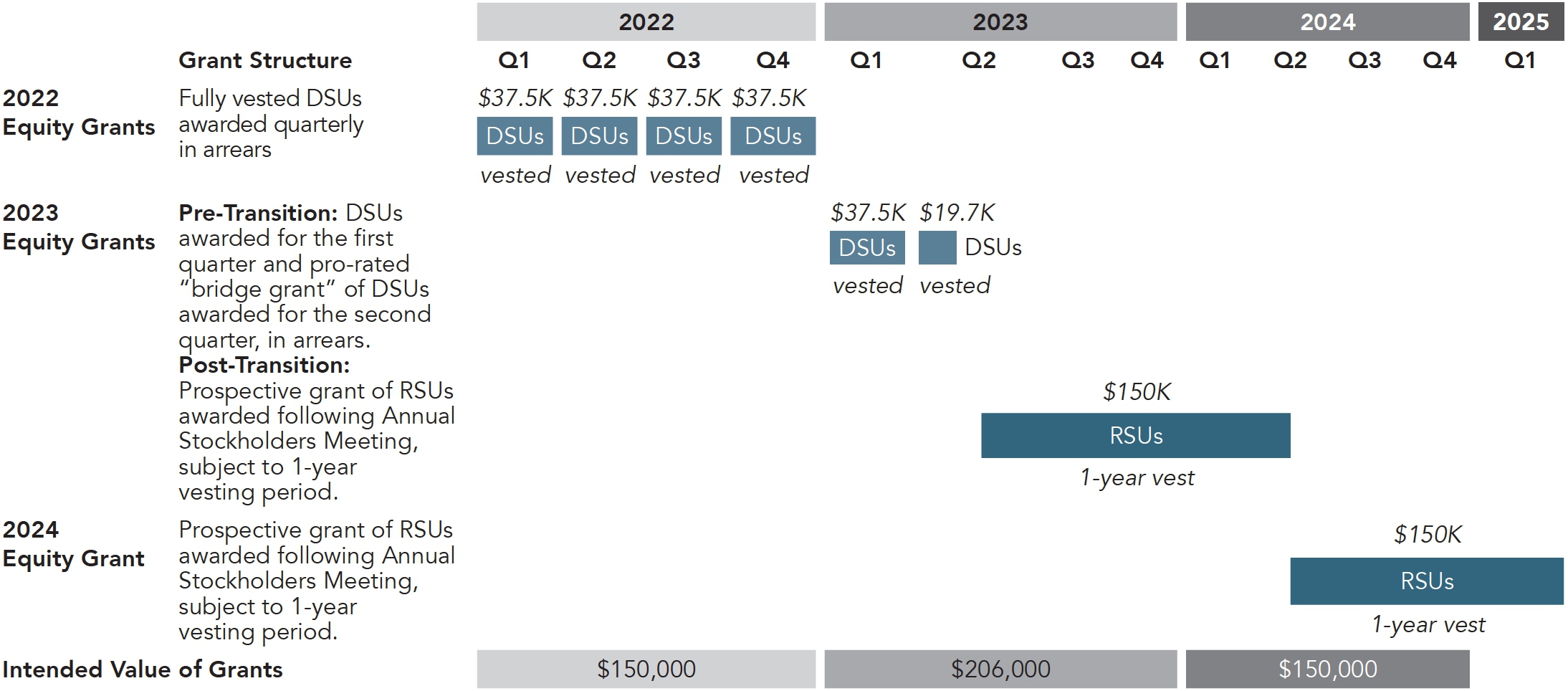
| 2024 Proxy Statement | 55 |
| Corporate Governance at Genworth |
2023 Director Compensation Table
The following table sets forth information concerning compensation paid or accrued by us in 2023 to our non-management directors:
| Name | Fees Earned or Paid in Cash ($)(1) |
Stock Awards ($)(2)(3) |
All Other Compensation ($)(4) |
Total ($)(5) | |||
| G. Kent Conrad | 140,000 | 195,357 | 7,750 | 343,107 | |||
| Karen E. Dyson | 142,500 | 195,357 | 10,000 | 347,857 | |||
| Jill R. Goodman | 120,000 | 195,357 | — | 315,357 | |||
| Melina E. Higgins | 200,000 | 351,642 | 10,000 | 561,642 | |||
| Howard D. Mills, III | 120,000 | 195,357 | — | 315,357 | |||
| Robert P. Restrepo Jr. | 155,000 | 195,357 | 5,000 | 355,357 | |||
| Elaine A. Sarsynski | 65,495 | 320,357 | — | 385,852 | |||
| Ramsey D. Smith | 120,000 | 195,357 | 1,250 | 316,607 |
| (1) | Amounts include the portion of the annual retainer (described above) that was paid in cash. Amounts also include applicable committee chair fees and the cash portion of the retainer for the Non-Executive Chair of the Board of Directors. Ms. Sarsynski received her 2023-2024 annual cash retainer as stock awards. Ms. Sarsynski’s 2023 cash earnings include Q1 and prorated Q2 payments made prior to 2023-2024 annual cash retainer. |
| (2) | Reflects the aggregate grant date fair value of DSUs and RSUs, determined in accordance with FASB ASC Topic 718. The fair value of stock unit awards under Topic 718 typically equals the price of the underlying stock on the date of grant; however, amounts in the table are lower because the DSUs do not convert to transferable shares until one year after the director leaves the Board of Directors, and Topic 718 provides that the impact of transferability restrictions that remain in place after an award of stock based compensation vests may be considered when determining the fair value of the award for accounting purposes. The Finnerty option pricing model was, therefore, used to factor in these post-vest holding requirements with the following assumptions: (i) expected post vesting restriction period of (1-24) years; (ii) expected volatility of 82.0%; (iii) risk-free interest rate of 1.60%; (iv) expected dividend yield of 0.00%; and (v) calculated discount for post vest restriction period of 30.34%. Value of stock awards was higher in 2023 due to the transition from quarterly DSUs to annual RSUs and will normalize in 2024. For more information, see 2023 Changes to Director Compensation above. |
| (3) | The following table shows for each non-management director the total number of RSUs and DSUs held as of December 31, 2023 (rounded down to the nearest whole share): |
| Name | Total
Number of DSUs Held as of December 31, 2023 |
Total
Number of RSUs Held as of December 31, 2023 | ||
| G. Kent Conrad | 263,530 | 27,412 | ||
| Karen E. Dyson | 72,659 | 27,412 | ||
| Jill R. Goodman | 70,009 | 27,412 | ||
| Melina E. Higgins | 311,169 | 49,342 | ||
| Howard D. Mills, III | 70,009 | 27,412 | ||
| Robert P. Restrepo Jr. | 192,102 | 27,412 | ||
| Elaine A. Sarsynski | 40,698 | 49,342 | ||
| Ramsey D. Smith | 70,009 | 27,412 |
| (4) | Amounts reflect company charitable match contributions. |
| (5) | Amounts reflect the 2023 changes to non-management director compensation. See illustration table above regarding the transition of our non-management director equity grants from awards of DSUs granted in arrears to awards of RSUs granted on a prospective basis to show the anomaly in increased compensation in 2023. Although not included in the illustration table, the same transition in form, frequency and timing also occurred with respect to the additional non-executive chair equity retainer received by Melina Higgins, resulting in a similar increase in 2023. |
| 56 | Genworth Financial, Inc. |
| Corporate Governance at Genworth |
Director Stock Ownership Policy
To help promote the alignment of the personal interests of the company’s non-management directors with the interests of our stockholders, we have established a robust stock ownership policy for all non-management directors. Under the policy, each non-management director is expected to accumulate and hold shares of Genworth common stock having a value equal to five times the value of the cash portion of the annual retainer payable to non-management directors, which is currently $120,000. Therefore, the ownership guideline is $600,000.
| 5x annual cash retainer | $600,000 in 2023 |
Non-management directors may satisfy this ownership guideline with common stock (and rights to receive common stock) through ownership in the following categories: (i) shares owned directly, (ii) shares owned indirectly (e.g., by a spouse or a trust) and (iii) restricted stock, restricted stock units and deferred stock units. Non-management directors are expected to satisfy this ownership guideline over time after their initial appointment to the Board, and are not permitted to sell any shares of Genworth common stock received from the company until the ownership guideline has been met (except that non-management directors may sell shares for the sole purpose of satisfying any tax liabilities relating to the settlement of restricted stock units into shares of common stock).
The following table shows the stock ownership as of March 1, 2024, of our current non-management directors, the percentage of the ownership guideline that they have reached, and the number of years that have elapsed since the director was initially made subject to the policy. The value of each non-management director’s stock ownership is based on the closing price of our common stock on March 1, 2024 ($6.13).
| Name | Number of Shares / DSUs / RSUs Held (#)(1) |
Value as of March 1, 2024 ($) |
Stock Held as % of Ownership Guideline |
Years Subject to Ownership Policy | ||||
| G. Kent Conrad | 290,942 | $ | 1,783,474 | >100% | 11 | |||
| Karen E. Dyson | 100,072 | $ | 613,441 | >100% | 4 | |||
| Jill R. Goodman | 97,421 | $ | 597,191 | 99.5% | 3 | |||
| Melina E. Higgins | 360,511 | $ | 2,209,932 | >100% | 11 | |||
| Howard D. Mills, III | 97,421 | $ | 597,191 | 99.5% | 3 | |||
| Robert P. Restrepo Jr. | 269,514 | $ | 1,652,121 | >100% | 8 | |||
| Elaine A. Sarsynski | 90,040 | $ | 551,945 | 92% | 2 | |||
| Ramsey D. Smith | 97,421 | $ | 597,191 | 99.5% | 3 | |||
| (1) | The rounding of shares (up or down) to the nearest whole share may result in a slight variation in amounts shown. |
| 2024 Proxy Statement | 57 |
Executive Compensation
Report of the Management Development and Compensation Committee
The Management Development and Compensation Committee of the Board of Directors oversees the compensation programs of Genworth Financial, Inc. on behalf of the Board. In fulfilling its oversight responsibilities, the committee reviewed and discussed with management the Compensation Discussion and Analysis included in this document.
In reliance on the review and discussion referred to above, the Management Development and Compensation Committee recommended to the Board of Directors that the Compensation Discussion and Analysis be included in Genworth’s Annual Proxy Statement on Schedule 14A to be filed in connection with Genworth’s 2024 Annual Meeting of Stockholders, which will be filed with the U.S. Securities and Exchange Commission.
This report shall not be deemed to be incorporated by reference by any general statement incorporating by reference into any filing under the Securities Act of 1933, as amended, or the Securities Exchange Act of 1934, as amended, and shall not otherwise be deemed filed under such acts. This report is provided by the following independent directors, who constitute the committee:
Karen E. Dyson, Chair
Jill R. Goodman
Melina E. Higgins
Robert P. Restrepo Jr.
| 58 | Genworth Financial, Inc. |
| Executive Compensation |
|
Proposal 2
Advisory Vote to Approve Named Executive Officer Compensation |
Pursuant to Section 14A of the Exchange Act (which was added by the Dodd-Frank Wall Street Reform and Consumer Protection Act), we are required to provide our stockholders with the opportunity to vote to approve, on an advisory, non-binding basis, the compensation of our named executive officers as disclosed in this Proxy Statement in accordance with the SEC’s rules.
As described in detail in the Compensation Discussion and Analysis section below, our executive compensation programs are designed to attract, retain and motivate employees of superior ability who are dedicated to the long-term interests of our stockholders. Under these programs, our named executive officers are rewarded for the achievement of specific annual financial and strategic goals, long-term corporate goals and the realization of increased stockholder value. Highlights of our executive compensation program, as described in the Compensation Discussion and Analysis section, include:
| ● | compensation programs that are performance-based and align executive officer incentives with stockholder interests over multiple time frames; |
| ● | annual incentives that are earned based on performance measured against specific financial and non-financial objectives for an executive’s area of responsibility, together with a qualitative assessment of performance; |
| ● | at-risk pay and compensation design that reflect an executive officer’s impact on company performance over time; and |
| ● | appropriate risk management practices, including a clawback policy, anti-hedging policy, anti-pledging policy, stock ownership requirements, and a net share retention ratio with respect to equity grants. |
We are asking our stockholders to indicate their support for our named executive officer compensation as described in this Proxy Statement. This proposal, commonly known as a “say-on-pay” proposal, gives our stockholders the opportunity to express their views on our named executive officers’ compensation. This vote is not intended to address any specific item of compensation, but rather the overall compensation of our named executive officers and the philosophy, policies and practices described in this Proxy Statement. Accordingly, we will ask our stockholders to vote FOR the approval, on an advisory basis, of the compensation of our named executive officers, as disclosed in this Proxy Statement for the 2024 Annual Meeting pursuant to the compensation disclosure rules of the SEC, including the Compensation Discussion and Analysis section, the 2023 Summary Compensation Table and the other related tables and narrative discussion.
The say-on-pay vote is advisory, and therefore not binding on Genworth, the Compensation Committee or our Board of Directors. However, our Board of Directors and the Compensation Committee value the opinions of our stockholders, and the Compensation Committee will review the voting results and take them into consideration when making future decisions regarding executive compensation as it deems appropriate.
At the 2023 Annual Meeting, our stockholders selected, on a non-binding, advisory basis, an annual vote on the frequency at which we should include a say-on-pay proposal in our proxy statement for stockholder consideration. In light of this result and other factors, our Board of Directors determined that we will hold say-on-pay votes every year until the next required non-binding, advisory vote on the frequency of such votes, which is required to be held no later than our 2029 Annual Meeting.
 |
The Board of Directors recommends that stockholders vote FOR the approval of the compensation of our named executive officers, as disclosed in this Proxy Statement pursuant to the compensation disclosure rules of the SEC. |
| 2024 Proxy Statement | 59 |
| Executive Compensation |
Compensation Discussion and Analysis
Named Executive Officers
This section provides an overview and analysis of our compensation programs and policies, including the material compensation decisions made under the programs with respect to the following executive officers, whom we refer to as our “named executive officers” or “NEOs:”
 |
 |
 |
 |
 |
 |
Thomas
J. McInerney President and Chief Executive Chief Executive Officer (“CEO”) |
Jerome
T. Upton Executive Vice President
and Chief Financial Officer (“CFO”)(1) |
Kelly
A. Saltzgaber Executive Vice President and Chief Investment Officer
(“CIO”)(2) |
Gregory
S. Karawan Executive Vice President and General Counsel |
Brian
K. Haendiges Former Executive Vice President—U.S. Life Insurance(3) |
Daniel
J. Sheehan IV Former Executive Vice President,
Chief Financial Officer & Chief Investment Officer(4) |
We refer to the subset of our named executive officers excluding Mr. Sheehan, who left the company in 2023, as our “continuing named executive officers,” or “continuing NEOs.” Information regarding Mr. Sheehan’s separation arrangements in 2023 is provided under the Executive Compensation – Separation Benefits to our Former Chief Financial Officer and Chief Investment Officer section later in the document.
| (1) | Mr. Upton was appointed Executive Vice President and CFO effective March 1, 2023. |
| (2) | Ms. Saltzgaber was appointed Executive Vice President and Chief Investment Officer effective March 1, 2023. |
| (3) | Mr. Haendiges resigned from his role as Executive Vice President—U.S. Life Insurance effective December 31, 2023, and retired from Genworth in April 2024. |
| (4) | Mr. Sheehan transitioned from the combined role of Chief Financial Officer and Chief Investment Officer effective March 1, 2023, and remained with the company in an advisory role until March 31, 2023. |
| 60 | Genworth Financial, Inc. |
| Executive Compensation |
2023 Company Performance
In 2023, Genworth met or exceeded key financial, non-financial, and operational objectives across its business portfolio due to strong execution and performance in Enact as well as solid progress in our U.S. Life Insurance business.
Delivering
Financial Performance Enact exceeded its financial objectives, including its targets for adjusted operating
income, adjusted return on equity (“ROE”) and expense ratio.
U.S. Life Insurance exceeded its internal targets for in-force rate action (“IFA”)
approvals on our legacy blocks of long-term care insurance (“LTC”) in execution of our multi-year rate action plan. Achieved
$354 million in premium rate increases, well above the goal of $275 million for the year. Significant progress in our Multi-Year Rate
Action Plan (“MYRAP”) with the cumulative progress to $28.0 billion in approval on a net present value basis since 2012,
reflecting progress of 84% toward our latest $33.3 billion estimate for the net present value of rate increases and benefit reductions.
Completed 144 in-force premium filings in 43 states.
Exceeded our target for core pre-tax statutory income for Genworth Life Insurance
Company (“GLIC”) and its consolidated life insurance subsidiaries achieving $296 million versus a target of $270 million. |
Further
Strengthening LTC Financial and Operations Capabilities To Address Customer Needs
Exceeded the targets for long-term care operational excellence and customer service
for timeliness in phone speed to answer, claims eligibility, inventory, and payments. |
Developing
Innovative Aging Care Services and Solutions
Advanced the development and implementation of CareScout Services business by
launching the CareScout Quality Network in Texas and several other states. Network is differentiated from others in the long-term
care industry by having quality credentialling standards and negotiated discounted rates. Work continues in developing insurance and
funding solutions to help Americans afford LTC. |
Return
of Capital Driving Long Term Stockholder Value
Returned capital to stockholders through the repurchase of $295 million worth of our outstanding shares at an average price less than $5.70 per share under our share repurchase program in 2023.
Expanded our existing share repurchase program by an additional $350 million reflecting the transformative progress the company has made in recent years. The total amount authorized under the share repurchase program is $700 million.
Completed a successful consent solicitation from bondholders representing the majority in principal amount of our outstanding senior notes due 2034 to permit the repayment, redemption or repurchase of our outstanding fixed-to-floating rate junior subordinated notes due 2066, and opportunistically reduced outstanding holding company debt to $856 million. |
| 2024 Proxy Statement | 61 |
| Executive Compensation |
Positioning U.S. Life Insurance for Long-Term Sustainability Continued with the implementation of LTC litigation settlements. Full implementation of the new U.S. GAAP accounting guidance related to the recognition and measurement of long-duration insurance contracts, commonly known as Long-Duration Targeted Improvements (“LDTI”). |
Enhancing Human Capital Strengthened and expanded the focus on human capital through enhancing employee engagement, diversity, equity, and inclusion efforts and received designation as a “Top Workplace” in Richmond, Virginia, and Stamford, Connecticut. |
| Payout Funding | Results Summary | ||
| Key Annual Incentive Financial Objectives |  |
Above Target | The Enact mortgage insurance business exceeded its goals for adjusted operating income, adjusted return on equity and expense ratio. The U.S. Life Insurance business exceeded its internal targets in 2023 for IFA approvals and premium rate actions filed under our multi-year rate action plan, GLIC core pre-tax statutory income and customer service experience and operations. Investments income, purchase yields, and impairments performance all exceeded targets. |
| Key Annual Incentive Non-Financial Objectives |  |
Above Target | The company returned capital to stockholders through share buybacks, opportunistically repurchased debt, and managed the company’s leverage ratio below 25%. Strengthened and expanded the focus on human capital through enhancing employee engagement, diversity, equity, and inclusion efforts, and received “Top Workplace” designation in Richmond, Virginia and Stamford, Connecticut. |
| Long-Term Financial Objectives |  |
Above Target | Our 2021-2023 PSU awards payout was driven by Adjusted Operating Income and strong TSR. |
| 62 | Genworth Financial, Inc. |
| Executive Compensation |
Compensation Philosophy
Our objective in compensating executive officers is to attract, retain and motivate employees of superior ability who are dedicated to the long-term interests of our stockholders.
The following principles guide our compensation program design and individual compensation decisions. Additionally, we have highlighted below key elements of our compensation programs or policies for executive officers that illustrate how we support these principles in practice:
| Our Guiding Principles | Examples of Programs or Policies That Support Our Principles | ||
| Compensation should be primarily performance-based and align executive officer incentives with stockholder interests across multiple timeframes. | ●Annual incentives (short-term performance-based awards) are measurable and align with business
operating plans. ●Annual grants of long-term equity incentives to NEOs, including PSUs (which vest
based on company performance after three years) and RSUs (which vest over three-years based on continued employment, emphasizing long-term
stock appreciation and retention).
| ||
| At-risk pay and compensation design should reflect an executive officer’s impact on company performance over time. |
●A
majority of annual compensation of our executive officers is at risk. ●Our CEO has 87% of total target pay linked to company performance, through PSUs
and annual incentives for 2023. ●Our other continuing NEOs have an average of 74% of total target pay at risk
through PSUs, RSUs, and annual incentives for 2023. ●Annual long-term incentive grants constitute the largest component of target
compensation for executive officers. | ||
| Total compensation opportunities should be competitive within the relevant marketplace. | ●We review the composition of our compensation benchmarking peer group and leverage its compensation information to inform on competitiveness of pay levels for base, short term and long-term incentive pay. ●We strive to anchor our pay within a reasonable range of the median of the market,
taking into account a combination of benchmarking data, importance of role to the company and individual skill sets, among other factors. | ||
| Our incentive compensation should reward financial and operational performance and allow for qualitative assessment. | ●In determining annual incentive awards, the Compensation Committee measures performance against specific financial and non-financial objectives for the continuing NEO’s area of responsibility, together with a qualitative assessment of operational performance and other results. ●Our long-term equity awards reward achievement of specific longer-term company
objectives. | ||
| Plan designs and incentives should support appropriate risk management practices. | ●Executive officer stock ownership guidelines for our CEO (7x salary), our CFO (3x salary) and for our other executive officers (2x salary) are meaningful. ●50% retention ratio for net after-tax shares received from the vesting or exercise
of all equity incentive awards until executive officers’ stock ownership guidelines are met, ensuring significant personal assets
are aligned with long-term stockholder interests. ●Exercises of previously awarded stock options and stock appreciation rights (“SARs”)
are settled in stock and are subject to a nine-month net hold requirement. ●Clawback, anti-hedging and anti-pledging policies. |
| 2024 Proxy Statement | 63 |
| Executive Compensation |
Key Governance Practices
Compensation Decision-Making Process
How We Determine Program Design
Role of the Compensation Committee
The Compensation Committee seeks a collaborative relationship with management when determining executive compensation programs and performance. The Compensation Committee uses an independent third-party compensation consultant to provide for a more informed decision-making process and objective perspective in this important governance matter. The Compensation Committee performs the annual review process of the CEO and other executive officer performance and related compensation decisions, with input from the Board and support of its independent compensation consultant. The Compensation Committee regularly meets in executive session without management present and retains the final authority to approve all compensation policies, programs and amounts paid to our executive officers.
Role of Management
Our CEO and Executive Vice President—Chief Human Resources Officer regularly attend meetings of the Compensation Committee to provide analysis, details and recommendations regarding the company’s executive compensation programs and plan design. During full Board meetings, members of the Compensation Committee also receive business performance and strategy updates from other members of senior management that align with incentive compensation plan goals. Our CEO provides the Compensation Committee with performance assessments and compensation recommendations for individual executive officers (other than himself). The Compensation Committee, typically in the first quarter of each year, then determines and approves annual incentive award payouts for the prior year, any adjustments to base salary, target annual incentives for the upcoming year, and awards of long-term incentives to executive officers. For more information on the compensation decisions made in 2023, see the Key Compensation Program Elements section below.
| 64 | Genworth Financial, Inc. |
| Executive Compensation |
Role of Compensation Consultant
In 2023, the Compensation Committee retained Meridian Compensation Partners, LLC as its independent compensation consultant, to assist in reviewing and analyzing compensation data for our CEO and other executive officers. The independent compensation consultant regularly attends Compensation Committee meetings and meets with the Compensation Committee in executive session without management present. The Compensation Committee occasionally requests special studies, assessments of market trends and education regarding changing laws and regulations from the compensation consultant to assist the Compensation Committee in its decision-making processes for the CEO and other executive officers. The compensation consultant provides the Compensation Committee with advice, but does not determine the amount or form of compensation for our executive officers. In 2023, the Compensation Committee assessed the independence of the compensation consultant and other advisors pursuant to SEC rules and concluded that no conflict of interest exists that would prevent the compensation consultant or other advisors from independently advising the Compensation Committee.
Benchmarking
We generally evaluate market competitiveness of our programs as an input into the process of designing plans and setting target compensation levels for executive officers. We review each component of compensation for our executive officers separately and in the aggregate, and also consider the internal responsibilities among the executive officers to help determine appropriate pay levels. With respect to individual executive officers, we compare the total target compensation opportunities for our executive officers to target opportunities for similar positions at comparable companies. These benchmarks are a gauge for evaluating market competitiveness but are not given greater weight than other key factors when making compensation decisions. For example, individual executive officers may have higher or lower target compensation levels compared to market medians based on level of responsibility, individual experience and skills, performance trends, competitive dynamics, retention needs and internal equity considerations.
The Compensation Committee typically utilizes a combination of publicly available information related to a specific list of peer companies (the “Peer Group”), as well as information available through industry-specific market compensation surveys to provide a broad perspective of market practice. While no individual company matches our lines of business precisely, the Peer Group is intended to represent, in the aggregate, companies with revenue sources and talent demands similar to the company. With respect to size, we generally look at revenue or total assets as indicators of comparability, rather than market capitalization, due to the size and breadth of our legacy businesses and the assets we hold and invest for these businesses, the historic losses in our legacy LTC business and the potential for volatility year over year as stock prices change. The companies included in market surveys used by the company are not individually identifiable for a particular executive position (and therefore we are not benchmarking against any particular company within the survey), and also may change from year-to-year based on voluntary participation in the market surveys we use, mergers and divestitures, or changes in corporate structure.
To the extent we make changes to our business portfolio, or as peer companies adjust their own business lines or distribution channels, we will consider adding peers, or removing peers which no longer have revenue sources and talent demands similar to ours. The Compensation Committee will consider advice and recommendations developed by its compensation consultant to support our benchmarking principles.
| 2024 Proxy Statement | 65 |
| Executive Compensation |
As in prior years, the compensation consultant supported the Compensation Committee’s evaluation of the peer group to be used for benchmarking purposes by providing analysis of the Peer Group. Following its annual review of our Peer Group with the compensation consultant in 2022, Meridian Compensation Partners, the Compensation Committee removed Aflac, Inc., MGIC Investment Corp, and Radian Group, Inc., due to their size compared to the company. The Compensation Committee also added three new peers, Cincinnati Financial Corp., Kemper Corporation and Globe Life Inc., which were determined to be of appropriate size and a compatible business fit. The Peer Group listed below was used when considering 2023 target compensation levels:
| REMOVED |  |
2023 PEER GROUP |  |
ADDED |
|
Aflac Incorporated (larger size) MGIC Investment Corp (smaller size) Radian Group, Inc. (smaller size) |
American Financial Group Assurant Inc. Brighthouse Financial, Inc. Cincinnati Financial Corp. CNA Financial Corp. CNO Financial Group Inc. Fidelity National Financial, Inc. First American Financial Corp. Globe Life Inc. Hanover Insurance Group, Inc. Kemper Corporation Lincoln National Corp. Principal Financial Group Inc. Reinsurance Group of America Inc. Unum Group |
Cincinnati Financial Corp Kemper Corporation Globe Life Inc. | ||
The Compensation Committee, with advice from its independent compensation consultant, Meridian Compensation Partners, LLC, continues to evaluate and assess its Peer Group on an annual basis.
| 66 | Genworth Financial, Inc. |
| Executive Compensation |
Consideration of Last Year’s Advisory Stockholder Vote on Executive Compensation and Stockholder Engagement
Annual advisory votes to approve named executive officer compensation serve as a tool to help the Compensation Committee evaluate the alignment of our executive compensation programs with the interests of the company and our stockholders. At the 2023 Annual Meeting, approximately 95% of the shares voted were cast in favor of the compensation paid to the named executive officers in 2022.
While the vote was strongly in favor of our compensation programs, we continue to take steps to regularly, and proactively, engage with our stockholders throughout the year and solicit their views on our program. For example, during 2023, our outreach campaign targeted the top 20 stockholders, representing 54% of shares outstanding. The feedback pertaining to our executive compensation programs from our stockholders throughout 2022 and 2023 was shared with the Compensation Committee, as well as the full Board, and informed the Compensation Committee’s decisions with respect to certain elements of our 2023 compensation program, as well as our 2024 compensation program, as described below. Upon considering the results of the 2023 advisory votes and our recent history of advisory votes to approve named executive officer compensation, the Compensation Committee concluded that stockholders viewed our current program design favorably, and the committee will continue to review and consider feedback as the program continues to evolve over time. See below for the changes resulting from these conversations.
| What We Heard | What We Are Doing | |
| Compensation should be primarily performance-based and align executive officer incentives with stockholder interests across multiple timeframes |
●We are increasing the weighting of performance awards in our 2024 pay design for executive officers to further incentivize performance and alignment to market. | |
| Importance of linking pay with measures that have significance to stockholders and business |
●To further align to stockholders, we increased TSR weighting in our 2023 performance awards for executive officers. | |
| Peer group should be appropriate size and good business fit |
●We refreshed our peer group to ensure continued alignment with size-appropriate peers | |
| CEO life insurance program annual premium payments raised concerns |
●CEO voluntarily ceased participation in the executive life insurance programs during 2023 |
| 2024 Proxy Statement | 67 |
| Executive Compensation |
Key Compensation Program Elements
Our 2023 annual compensation program for continuing named executive officers consists of the following key elements: base salary, annual incentive, and annual long-term incentive grants (which includes PSUs for the CEO, and PSUs and RSUs for all other continuing NEOs). A significant portion of annual compensation of our continuing NEOs is completely at risk.
The charts below reflect the average target compensation mix for the CEO and other continuing NEOs. Additional details on their compensation elements are described on the following pages.
| 2023 CEO Target Compensation | 2023 Other NEO Target Compensation | |
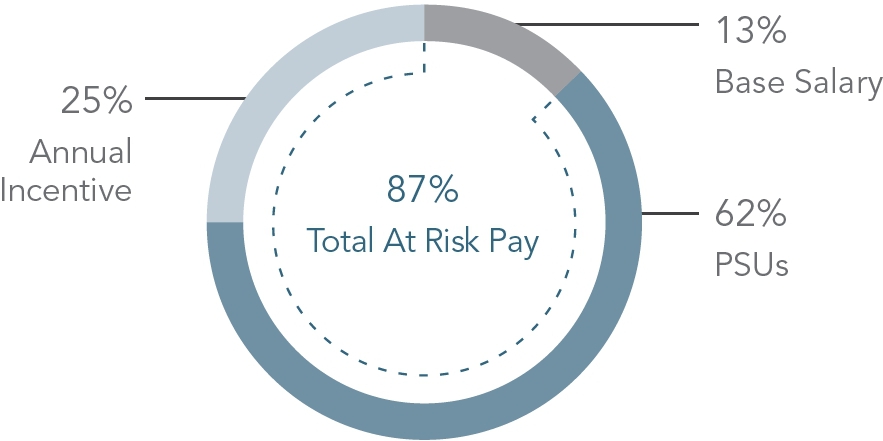 |
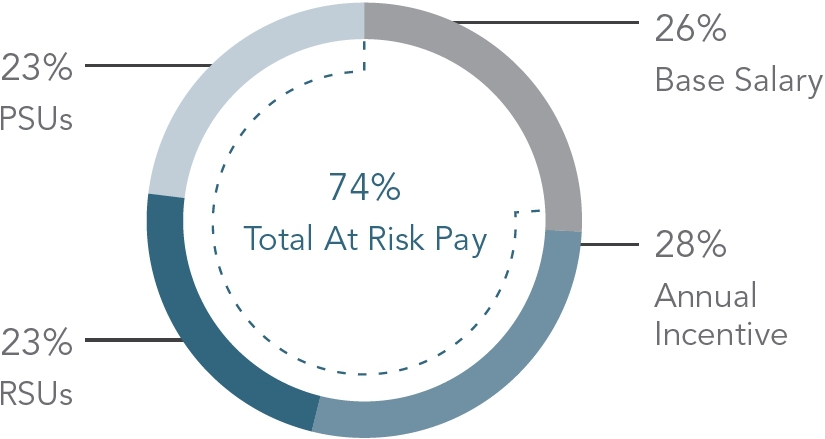 |
Base Salary
Base salaries are generally intended to reflect the scope of an executive officer’s responsibilities and level of experience, reward sustained performance over time and be market competitive. In February 2023, the Compensation Committee undertook its annual review of executive officer base salaries, while considering benchmarking data and advice provided by its compensation consultant. Mr. Upton, Mr. Karawan and Ms. Saltzgaber received a base salary increase as described below. The other continuing named executive officers did not receive any adjustments to their base salaries in 2023. The table below shows base salaries for our continuing NEOs in 2023 and describes the rationale for base salary increases:
| Named Executive Officer | 2023 Base Salary ($) |
Change from Prior Base Salary |
Rationale | |||||
| Mr. McInerney | $ | 1,000,000 | 0 | % | No Change | |||
| Mr. Upton | $ | 600,000 | 20 | % | Increased in connection with promotion to CFO | |||
| Mr. Haendiges | $ | 600,000 | 0 | % | No Change | |||
| Mr. Karawan | $ | 600,000 | 9 | % | Increased after evaluating market competitiveness | |||
| Ms. Saltzgaber | $ | 500,000 | 32 | % | Increased in connection with promotion to CIO | |||
| 68 | Genworth Financial, Inc. |
| Executive Compensation |
Annual Incentive
In our annual incentive program, we review performance against financial objectives, together with a qualitative assessment of operational objectives and other accomplishments toward non-financial priorities that are not necessarily reflected in annual financial results. We place a heavier weighting on the financial objectives, and the specific weightings for the financial and non-financial objectives are included in the individual scorecards for each continuing named executive officer below.
Each continuing named executive officer has an annual incentive target, expressed as a percentage of base salary. The 2023 target annual incentive opportunities for our continuing named executive officers ranged from 100% to 200% of base salary, and payout opportunities for 2023 ranged from zero to 200% of their individual target amount. Individual annual incentive targets are reported in the 2023 Grants of Plan-Based Awards Table. After review, the Compensation Committee determined to not make any adjustments to annual incentive target percentages for our continuing NEOs for 2023, as the existing targets were considered competitive within the marketplace for their roles.
Our annual incentive program is closely aligned with our annual business operating plan, which is reviewed by the Board of Directors. Generally, the Compensation Committee sets performance targets for the annual incentive program that align with achievement of certain performance measures contained in the business operating plan, with above target payouts for exceeding the plan and below target or no payouts for not meeting the plan. When setting the annual business operating plan, many factors and assumptions are considered, such as the competitive landscape, the global economic environment, market trends, interest rates, and regulatory considerations. As a result, performance targets within our annual incentive plan may not always increase on a yearly basis, and may even be set below the previous year’s targets or actual results.
Amounts earned and paid under our annual incentive program for 2023 are reported in the Non-Equity Incentive Plan Compensation column of the 2023 Summary Compensation Table.
How We Performed: Financial Objectives
The financial metrics chosen to measure 2023 performance, which are also disclosed in the individual continuing NEO scorecards below, were identified as key drivers of our business operating plans.
For example, with respect to financial objectives, Adjusted Operating Income and Operating Return on Equity continue to represent key measures of financial performance for Enact, while incremental premiums approved for LTC in-force rate actions and in-force premiums filed remain key priorities for our U.S. Life business.
| 2024 Proxy Statement | 69 |
| Executive Compensation |
| Performance Unit | Key Financial Objective | Unit | Threshold | Target | Maximum | 2023 Results | ||||||||||||||
| U.S. Life Insurance | LTC In-Force Rate Actions Gross Incremental Premium Approval(1) |
$million | $ | 225 | $ | 275 | $ | 350 | $ | 354 | ||||||||||
| LTC In-Force Premiums Filed(2) | $million | $ | 750 | $ | 900 | $ | 1,050 | $ | 1,114 | |||||||||||
| Core Pre-Tax Statutory Income(3) | $million | $ | 215 | $ | 270 | $ | 325 | $ | 296 | |||||||||||
| Operational Excellence and Customer Service |
% | 50 | % | 100 | % | 200 | % | 125 | % | |||||||||||
| Enact | Levered Operating Return on Equity(4)(5) |
% | 5.1 | % | 10.9 | % | 14.1 | % | 15.5 | % | ||||||||||
| Investments | Net Investment Income | $million | $ | 2,763 | $ | 3,070 | $ | 3,377 | $ | 3,183 | ||||||||||
| U.S. Life Purchase Yield v. External Benchmark(6) |
% | 5.00 | % | 5.55 | % | 6.11 | % | 5.85 | % | |||||||||||
| Enact Purchase Yield v. External Benchmark(7) |
% | 4.91 | % | 5.45 | % | 6.00 | % | 5.61 | % | |||||||||||
| U.S. Life Statutory Impairments and Trading Gains / Losses and Capital/ Credit Migration Impact(8) |
$million | ($165) | ($115) | ($65) | ($84) | |||||||||||||||
| (1) | The LTC in-force gross incremental premiums approved metric measures the weighted average increase on annualized LTC in-force premiums resulting from rate actions approved in 2023. |
| (2) | This metric measured the LTC in-force premiums rate action requests filed with the states in 2023. 2023 results include actuals plus a $125 million adjustment for filings that could not be pursued given positive approval outcomes or specific states' directives to delay submission. |
| (3) | Pre-Tax Statutory Income is based on Genworth Life Insurance Company (GLIC) and its consolidating life insurance subsidiaries that has been prepared on the basis of statutory accounting principles (SAP). Statutory Net Income is reflected in the “Summary of Operations” within the statutory filings of Genworth’s U.S. Life Insurance Companies. Due to differences in methodology between SAP and U.S. GAAP, the values for assets, liabilities and equity reflected in financial statements prepared in accordance with U.S. GAAP are materially different from those reflected in financial statements prepared under SAP. The Pre-Tax Statutory Income of $433 million in 2023 has been adjusted to "Core Pre-Tax Statutory Income" which excludes the impacts from in-force reserve changes from future period assumption changes, methodology changes, market impact to annuity products, conversion cost associated with third party outsourcing, impacts from COVID-19, court-driven impacts on IFA settlement timing, state-specific court or administrative ruling, model refinements, reinsurance transactions and regulatory changes. |
| (4) | Reflects Genworth ownership amount excluding noncontrolling interests. |
| (5) | Levered Operating Return on Equity for Enact equals adjusted levered operating income for the year divided by average equity for the most recent year. |
| (6) | Benchmark based on Barclays’ Intermediate Corporate Index. |
| (7) | Benchmark based on Barclays’ Long Corporate Index. |
| (8) | Investment impairments and trading losses are calculated in accordance with statutory accounting rules and the capital/credit migration impact represents statutory risk-based capital impact to U.S. life insurance companies primarily from changes in National Association of Insurance Commissioners rating of invested assets shown at a 150% multiple. |
| 70 | Genworth Financial, Inc. |
| Executive Compensation |
How We Performed: Non-Financial Objectives
The Compensation Committee also established key non-financial priorities for 2023 designed to have an impact on company financial performance and stockholder value.
The chart below outlines the non-financial priorities used in determining 2023 annual incentive program payouts for our continuing NEOs. For applicable use and weighting of these metrics for each continuing NEO, please see each continuing NEO’s individual scorecard later in this document.
During February 2024, the Compensation Committee reviewed overall performance results against the applicable objectives in the previously set scorecards and also considered the performance of each continuing NEO in their respective area of responsibility in determining the actual payouts of annual incentives.
| Key Non-Financial Priority | 2023 Accomplishments/Results |
| Corporate Non-Financial Priorities ●Mr. McInerney
●Mr. Upton
●Mr. Karawan |
●Returned capital to stockholders through the repurchase of $295 million worth of our outstanding shares at an average price less than $5.70 per share under our share repurchase program in 2023.
●Expanded our existing share repurchase program by an additional $350 million reflecting the transformative progress the company has made in recent years. The total amount authorized under the share repurchase program is $700 million.
●Completed a successful consent solicitation from bondholders representing the majority in principal amount of our outstanding senior notes due 2034 to permit the repayment, redemption or repurchase of our outstanding fixed-to-floating rate junior subordinated notes due 2066, and opportunistically reduced outstanding holding company debt to $856 million.
●Advanced the development and implementation of CareScout Services business by launching the CareScout Quality Network in Texas and several other states. Network is differentiated from others in the long-term care industry by having quality credentialling standards and negotiated discounted rates. Work continues in developing insurance and funding solutions to help Americans pay for LTC.
●Strengthened and expanded the focus on human capital through enhancing employee engagement, talent and performance management, succession planning, and diversity, equity, and inclusion efforts.
●Received designation as a “Top Workplace” in Richmond, Virginia, and Stamford, Connecticut.
●The Compensation Committee determined above target funding was warranted. |
| U.S. Life Non-Financial Priorities ●Mr. Haendiges |
●Continued with the successful implementation of LTC litigation settlements. Settlements have reduced our tail-risk associated with our LTC legacy book. Policyholders have elected to reduce their benefits in order to reduce or eliminate their premiums.
●Full implementation of the new U.S. GAAP accounting guidance related to the recognition and measurement of long-duration insurance contracts, commonly known as LDTI.
●The Compensation Committee determined target funding was warranted. |
| Investments
Non-Financial Priorities ●Ms. Saltzgaber |
●Executed $1.2B repositioning program to enhance income and improve Asset Liability Management (ALM).
●Executed $2B in interest rate hedges, improving ALM in historically attractive yield environment.
●Increased production in middle market loans given strong relative value.
●The Compensation Committee determined above target funding was warranted. |
| 2024 Proxy Statement | 71 |
| Executive Compensation |
NEO 2023 Scorecard Results
 |
Thomas J. McInerney
Mr. McInerney’s annual incentive award could range from 0% of target to 200% of target based on results versus applicable performance targets. His 2023 target was $2,000,000 (or, 200% of base pay). Mr. McInerney’s approved annual incentive award for 2023 was $3,200,000, or approximately 160% of his targeted amount, based on the achievement of the financial and non-financial measures indicated below. |
Financial Objectives 70%
| ($ millions) Performance Unit |
Key Financial Objective ($ Millions) | Weighting | 2023 Target |
2023 Results |
Funding % | ||||||
| Enact(1) | Adjusted Operating Return on Equity | 25% | 10.9 | % | 15.5 | % | 200 | % | |||
| U.S. Life Insurance | Core Pre-Tax Statutory Income ($MM) | 25% | $270 | $296 | 147 | % | |||||
| LTC In-Force Rate Actions Gross Incremental Premium Approved |
20% | $275 | $354 | 200 | % | ||||||
| Total Funding For Financial Objectives | 127 | % | |||||||||
Non-Financial Objectives 30%
| Areas of Focus included: | |||
●Return
Capital to Stockholders;
●CareScout
Growth Initiatives; and
●Human
Capital, Succession Planning and Talent Management |
33 | % | |
| Overall Funding % | 160 | % |
| (1) | Reflects Genworth ownership amount excluding noncontrolling interests. |
| 72 | Genworth Financial, Inc. |
| Executive Compensation |
 |
Jerome T. Upton
Mr. Upton’s annual incentive award could range from 0% of target to 200% of target based on results versus applicable performance targets. His 2023 target was $750,000 (or, 125% of base pay). Mr. Upton’s approved annual incentive award for 2023 was $1,200,000, or approximately 160% of his targeted amount, based on the achievement of the financial and non-financial measures indicated below. |
Financial Objectives 70%
| ($ millions) Performance Unit |
Key Financial Objective ($ Millions) | Weighting | 2023 Target |
2023 Results |
Funding % | ||||||
| Enact(1) | Adjusted Operating Return on Equity | 25% | 10.9 | % | 15.5 | % | 200 | % | |||
| U.S. Life Insurance | Core Pre-Tax Statutory Income ($MM) | 25% | $270 | $296 | 147 | % | |||||
| LTC In-Force Rate Actions Gross Incremental Premium Approved |
20% | $275 | $354 | 200 | % | ||||||
| Total Funding For Financial Objectives | 127 | % | |||||||||
Non-Financial Objectives 30%
| Areas of Focus included: | |||
●Return
Capital to Stockholders;
●CareScout
Growth Initiatives; and
●Human
Capital, Succession Planning and Talent Management |
33 | % | |
| Overall Funding % | 160 | % |
| (1) | Reflects Genworth ownership amount excluding noncontrolling interests. |
| 2024 Proxy Statement | 73 |
| Executive Compensation |
 |
Gregory S. Karawan
Mr. Karawan’s annual incentive award could range from 0% of target to 200% of target based on results versus applicable performance targets. His 2023 target was $600,000 (or, 100% of base pay). Mr. Karawan’s approved annual incentive award for 2023 was $960,000, or approximately 160% of his targeted amount, based on the achievement of the financial and non-financial measures indicated below. |
Financial Objectives 70%
| ($ millions) Performance Unit |
Key Financial Objective ($ Millions) | Weighting | 2023 Target |
2023 Results |
Funding % | ||||||
| Enact(1) | Adjusted Operating Return on Equity | 25% | 10.9 | % | 15.5 | % | 200 | % | |||
| U.S. Life Insurance | Core Pre-Tax Statutory Income ($MM) | 25% | $270 | $296 | 147 | % | |||||
| LTC In-Force Rate Actions Gross Incremental Premium Approved |
20% | $275 | $354 | 200 | % | ||||||
| Total Funding For Financial Objectives | 127 | % | |||||||||
Non-Financial Objectives 30%
| Areas of Focus included: | |||
●Return
Capital to Stockholders;
●CareScout
Growth Initiatives; and
●Human
Capital, Succession Planning and Talent Management |
33 | % | |
| Overall Funding % | 160 | % |
| (1) | Reflects Genworth ownership amount excluding noncontrolling interests. |
| 74 | Genworth Financial, Inc. |
| Executive Compensation |
 |
Kelly A. Saltzgaber
Ms. Saltzgaber’s annual incentive award could range from 0% of target to 200% of target based on results versus applicable performance. Her 2023 target was $625,000 (or, 125% of base pay). Ms. Saltzgaber’s approved annual incentive award for 2023 was $1,000,000, or approximately 160% of her targeted amount, based on the achievement of the following financial and non-financial measures: |
Financial Objectives 70%
| ($ millions) Performance Unit |
Key Financial Objective ($ Millions) | Weighting | 2023 Target |
2023 Results |
Funding % |
|||||||
| Investments | Net Investment Income | 20 | % | $3,070 | $3,183 | 137 | % | |||||
| U.S. Life Purchase Yield v. External Benchmark | 15 | % | 5.55 | % | 5.85 | % | 154 | % | ||||
| Enact Purchase Yield v. External Benchmark | 10 | % | 5.45 | % | 5.61 | % | 129 | % | ||||
| U.S. Life Statutory Impairments and Trading Gains / Losses and Capital / Credit Migration Impact(1) | 25 | % | ($115 | ) | ($84 | ) | 163 | % | ||||
| Total Funding For Financial Objectives | 104 | % | ||||||||||
Non-Financial Objectives 30%
| Areas of Focus included: | |||
●Limited
Partnership / Middle Market Loan Production;
●Portfolio
Repositioning; and
●Derivatives
– Forward Starting Swaps / Forward Treasuries |
56 | % | |
| Overall Funding % | 160 | % |
| (1) | Investment impairments and trading losses are calculated in accordance with statutory accounting rules and the capital/credit migration impact represents statutory risk-based capital impact to U.S. life insurance companies primarily from changes in National Association of Insurance Commissioners rating of invested assets shown at a 150% multiple. |
| 2024 Proxy Statement | 75 |
| Executive Compensation |
 |
Brian K. Haendiges Mr. Haendiges’ annual incentive award could range from 0% of target to 200% of target based on results versus applicable performance. His 2023 target was $600,000 (or, 100% of base pay). Mr. Haendiges’ approved annual incentive award for 2023 was $900,000, or approximately 150% of his targeted amount, based on the achievement of the following financial and non-financial measures: |
Financial Objectives 70%
| ($
millions) Performance Unit |
Key Financial Objective ($ Millions) | Weighting | 2023 Target |
2023 Results |
Funding % | |||||||
| U.S. Life Insurance | LTC In-Force Rate Actions Gross Incremental Premium Approved | 25 | % | $275 | $354 | 200 | % | |||||
| LTC In-Force Rate Action Premium Filed | 10 | % | $900 | $1,114 | 200 | % | ||||||
| Genworth Life Insurance Company Core Pre-Tax Statutory Income | 25 | % | $270 | $296 | 147 | % | ||||||
| Operational Excellence and Customer Service | 10 | % | 100 | % | 125 | % | 125 | % | ||||
| Total Funding For Financial Objectives | 120 | % | ||||||||||
Non-Financial Objectives 30%
| Areas of Focus included: | |||
●Execution
Of In-Force Strategic Initiatives;
●Successfully
Implementing LDTI; and
●Human
Capital and Enhancing Engagement With Stakeholders |
30 | % | |
| Overall Funding % | 150 | % |
Long-Term Incentives
We believe that the largest component of our annual compensation opportunities for continuing named executive officers should be in the form of longer-term incentives, including annual long-term equity grants.
Our long-term incentive program is closely aligned with a multi-year business plan, which is reviewed by the Board of Directors. The Compensation Committee sets performance targets for the performance-based awards in our long-term incentive program that align with achievement of certain components in our multi-year business plan, with above target payouts for exceeding the plan and below target or no payouts for not meeting the plan. When setting the multi-year business plan, many factors and assumptions are considered, such as the competitive landscape, the global economic environment, market trends, interest rates, and regulatory considerations. As a result, performance targets within our long-term incentive plan may not always increase on a yearly basis, and may even be set below the previous year’s targets or actual results.
To determine annual long-term equity grant awards for the CEO, the Compensation Committee works with its independent compensation consultant. To determine long-term equity grant awards to all other executive officers, the CEO prepares a recommendation for each such executive officer for the Compensation Committee’s consideration and approval. In addition, when determining long-term equity award values for each executive officer (including our CEO), the Compensation Committee considers competitive pay levels, alignment of total pay at risk with the individual’s ability to impact long-term company performance, the individual’s sustained performance over time, and long-term succession and retention needs.
| 76 | Genworth Financial, Inc. |
| Executive Compensation |
For the 2023-2025 PSUs and RSUs, our Compensation Committee reviewed the proposed compensation values for all executive officers, determined aggregate award sizes based on the approach described above using an estimated share value and granted the awards, including performance goals and targets for the PSUs, in February 2023.
NEO LTI Target Amounts
The 2023 target annual long-term incentive intended values for our continuing named executive officers average 53% of target compensation.
The intended value of the annual long-term incentive awards made in 2023 to our continuing NEOs were as follows:
| Named Executive Officer | Reported Year |
Approximate Compensation Value Intended to be Delivered(1) |
# of RSUs Awarded |
“Target” # of PSUs Awarded(2) | |||||
| Mr. McInerney | 2023 | $ | 5,000,000 | — | 783,028 | ||||
| Mr. Upton | 2023 | $ | 1,250,000 | 109,457 | 97,878 | ||||
| Mr. Karawan | 2023 | $ | 750,000 | 65,674 | 58,727 | ||||
| Ms. Saltzgaber | 2023 | $ | 750,000 | 65,674 | 58,727 | ||||
| Mr. Haendiges | 2023 | $ | 1,250,000 | 109,457 | 97,878 | ||||
| (1) | Due to differences in how the grant-date fair value of awards is determined for accounting purposes, these amounts will differ from the amounts reflected as the grant date fair value of the awards for 2023 in the 2023 Summary Compensation Table. |
| (2) | Regarding the 2023 awards, although the continuing NEOs other than the CEO received their intended value split evenly between RSUs and PSUs, their awarded number of PSUs were lower than the awarded number of RSUs because the PSU valuation for 2023 contains an adjustment for stock price volatility based on TSR Monte Carlo valuation projections. |
Long-Term Incentive Award Design
Our long-term incentives awarded to executive officers have included, over time, different combinations of SARs, PSUs and RSUs.

For 2023, our continuing named executive officers’ long-term equity grants were awarded 100% in PSUs for our CEO and 50% PSUs and 50% RSUs for our other continuing named executive officers. Taken together, we believe our annual long-term incentive grants provide our named executive officers with effective retention value and appropriate incentives to achieve long-term company performance objectives, while aligning our executive officer compensation program with the long-term interests of our stockholders.
The 2023 PSU design incorporates relative Total Shareholder Return at 30%, Adjusted Operating Income (Enact Segment) at 20%, and Core Pre-Tax Statutory Net Income (USLI) at 50%. The relative Total Shareholder Return increased in 2023 from 20% in response to shareholder feedback.
| 2024 Proxy Statement | 77 |
| Executive Compensation |
Additional Information Regarding Awards of Performance Stock Units
| ● | Payout for performance is interpolated on a straight-line basis between each of threshold and target payouts and between target and maximum payouts. |
| ● | No payout shall be earned for performance below threshold level for the performance measurement period. |
| ● | Notwithstanding the level of achievement of the performance goals for each outstanding award, the Compensation Committee may exercise negative discretion to pay out a lesser amount, or no amount at all, under the Performance Stock Unit Award, based on such considerations as the Compensation Committee deems appropriate. |
| ● | The target number of PSUs noted on page 77 was fixed for each participant at the time of grant. |
Additional Information Regarding Awards of Restricted Stock Units
| ● | RSUs vest 33% per year, beginning on the first anniversary of the grant date. |
Additional Information Regarding Long-Term Incentive Awards
| ● | Net after-tax shares acquired by named executive officers through the grant or exercise of all company equity incentive awards are subject to a 50% retention ratio until stock ownership guidelines are met. |
| ● | Outstanding long-term incentive awards are generally forfeited upon termination of employment with the company prior to vesting, except for limited instances described in the Executive Compensation—Potential Payments upon Termination or Change of Control section below. |
| ● | The Compensation Committee approves a rounded number of shares based on the planned compensation value using the 20-day historical trading average price up to and including the date of grant. The use of a 20-day historical trading average price mitigates the impact of short-term fluctuations in stock price on award levels, allows for clear understanding of both share levels and approximate compensation values at the time of Compensation Committee approval, and facilitates delivering rounded award amounts. |
| 78 | Genworth Financial, Inc. |
| Executive Compensation |
Performance Stock Incentive Awards Status
| Performance Period and Measure | Performance Levels | Status | |
| 2021-2023 (1)(2)(3)(4)(5)(6) |
●Results were certified in February 2024
●Adjusted Operating Income and Total Shareholder Return both achieved maximum performance levels. Final payout was certified at 200% based on Company performance.
| ||
| 80% Adjusted Operating Income (Loss) - $M |
 | ||
| 20% Total Shareholder Return (“TSR”) |
 | ||
| 2022-2024 (5)(6)(7)(8)(9)(10) |
●As of December 31, 2023, payout was projected between Threshold and Target levels.
●Results will be certified in February 2025 based on Company performance.
| ||
| 60% U.S. Life - Statutory Net Income - $M |
 | ||
| 20% Enact - Adjusted Operating Income (Loss) - $M |
 | ||
| 20% Total Shareholder Return (“TSR”) |
 | ||
| 2023-2025 (6)(8)(10)(11)(12)(13) |
●As of December 31, 2023, payout was projected between Threshold and Target level.
●Results will be certified in February 2026 based on Company performance.
| ||
| 50% U.S. Life Insurance Companies - Core Pre-Tax Statutory Income - $M |
 | ||
| 30% Total Shareholder Return (“TSR”) |
 | ||
| 20% Enact - Adjusted Operating Income (Loss) - $M |
 |
| (1) | “Adjusted Operating Income (Loss)” shall mean U.S. GAAP income (loss) from continuing operations excluding the after-tax effects of income (loss) from continuing operations attributable to noncontrolling interests, net investment gains (losses), goodwill impairments, gains (losses)on the sale of businesses, gains (losses) on the early extinguishment of debt, gains (losses) on insurance block transactions, restructuring costs and other adjustments, net of taxes. Adjusted Operating Income (Loss) was adjusted for purposes of management performance evaluation to exclude the impacts from in-force reserve changes from future period assumption changes, methodology changes, changes in foreign exchange rates, tax changes based on updated regulations, guidance, assessments, or refinements related to technical areas of the Tax Cuts and Jobs Act of 2017 (the “Tax Cuts and Jobs Act”), legal fees and settlement costs related to merger & acquisition litigation, any strategic deal-related expenses (e.g. 3rd party legal, actuarial or reinsurance support for negotiating or implementing a transaction), and professional fees related to the implementation of the Long Duration Targeted Improvements (“LDTI”) accounting standard. Adjustment to the 3-year cumulative measurement was applied based on strategic transactions in 2021, 2022 or 2023 that are not included in forecast assumptions. |
| (2) | Adjusted Operating Income (Loss) was measured as follows: for Enact and corporate and other activities, January 1, 2021 through December 31, 2023; for the U.S. Life and runoff segments, January 1, 2021 through December 31, 2022. New accounting guidance related to LDTI was effective for us on January 1, 2023 (with transition adjustments as of January 1, 2021), and this guidance was expected to have extensive changes primarily impacting U.S. Life Insurance. Accordingly, the 2023 Adjusted Operating Income (Loss) for U.S. Life Insurance has been excluded from the 2023 target. |
| (3) | In evaluating performance, the Compensation Committee excluded the impact, if any, on reported financial results of any of the following events that occurred during the performance period: a) acquisitions and divestitures, b) stockholder dividends or common stock repurchases and c) changes in accounting principles, including LDTI, or other laws or provisions. |
| 2024 Proxy Statement | 79 |
| Executive Compensation |
| (4) | The payout that may be earned based on the TSR portion of this Award’s goal was determined based on the company’s Percentile Ranking relative to its Peer Group; provided, however, that in no event did the total dollar value of the Confirmed Units with respect to the TSR-goal portion of the Award exceed 800% of grant date fair value of the TSR-goal portion of the Award. |
| (5) | “Peer Group” shall mean the constituents of the S&P 400 Financials Sector on the Grant Date (each such constituent, a “Peer Company”). |
| (6) | TSR performance results were calculated as follows: (i)(a) the 20-trading day average closing price of the applicable entity’s common stock as of the last trading day of the performance period, minus (b) the 20-trading day average closing price of the applicable entity’s common stock as of the first day of the performance period, plus (c) the sum of all dividends and other distributions paid on such entity’s common stock during the performance period, on a per share basis, divided by (ii) the 20-trading day average closing price of the applicable entity’s common stock as of the first day of the performance period. |
| (7) | “Enact - Adjusted Operating Income (Loss)” shall mean U.S. GAAP income (loss) from continuing operations excluding the after-tax effects of income (loss) from continuing operations attributable to noncontrolling interests, net investment gains (losses), goodwill impairments, gains (losses) on the sale of businesses, gains (losses) on the early extinguishment of debt, gains (losses) on insurance block transactions, restructuring costs and other adjustments, net of taxes. Enact -Adjusted Operating Income (Loss) may be adjusted for purposes of management performance evaluation to exclude the impacts from in-force reserve changes from future period assumption changes (e.g. interest rate, expense, lapse), methodology changes (e.g. changes that would arise from a system conversion), changes in foreign exchange rates, tax changes based on updated regulations, guidance, assessments, or refinements related to technical areas of the Tax Cuts and Jobs Act, legal fees and settlement costs related to merger & acquisition litigation, any strategic deal-related expenses (e.g. 3rd party legal, actuarial or reinsurance support for negotiating or implementing a transaction). Adjustment to the 3-year cumulative measurement will be applied based on strategic transactions in 2022, 2023 or 2024 that are not included in forecast assumptions. |
| (8) | In evaluating performance, the Compensation Committee shall exclude the impact, if any, on reported financial results of any of the following events that occur during the performance period: a) acquisitions and divestitures, b) shareholder dividends or common stock repurchases and c) changes in accounting principles or other laws or provisions. |
| (9) | “U.S. Life - Statutory Net Income” shall mean Net Income based on Genworth Life Insurance Company (GLIC) and its consolidating life insurance subsidiaries that has been prepared on the basis of statutory accounting principles (SAP). Statutory Net Income is reflected in the “Summary of Operations” within the statutory filings of Genworth’s U.S. Life Insurance Companies. Due to differences in methodology between SAP and U.S. GAAP, the values for assets, liabilities and equity reflected in financial statements prepared in accordance with U.S. GAAP are materially different from those reflected in financial statements prepared under SAP. U.S. Life Insurance Companies Statutory Net Income may be adjusted for purposes of management performance evaluation to exclude the impacts from in-force reserve changes from future period assumption changes, methodology changes, changes in foreign exchange rates, tax changes based on updated regulations, guidance, assessments, or refinements related to technical areas of the Tax Cuts and Jobs Act, legal fees and settlement costs related to merger & acquisition litigation, any strategic deal-related expenses (e.g. 3rd party legal, actuarial or reinsurance support for negotiating or implementing a transaction), changes to variable annuity reserves related to changes in interest rates and equity markets and corresponding realized gains and losses on variable annuity hedges. Adjustment to the 3-year cumulative measurement will be applied based on strategic transactions in 2022, 2023 or 2024 that are not included in forecast assumptions. |
| (10) | The payout that may be earned based on the TSR portion of this Award’s goal will be determined based on the company’s Percentile Ranking relative to its Peer Group; provided, however, that in no event will the total dollar value of the Confirmed Units with respect to the TSR-goal portion of the Award exceed 800% of grant date fair value of the TSR-goal portion of the Award. |
| (11) | “Enact - Adjusted Operating Income (Loss)” shall mean U.S. GAAP income (loss) from continuing operations excluding the after-tax effects of income (loss) from continuing operations attributable to noncontrolling interests, net investment gains (losses), gains (losses) on the sale of businesses, gains (losses) on the early extinguishment of debt, initial gains (losses) on insurance block transactions, restructuring costs and infrequent or unusual non-operating items. Adjustments to reconcile net income (loss) to adjusted operating income (loss) assume a 21% tax rate and are net of the portion attributable to noncontrolling interests. Enact - Adjusted Operating Income (Loss) may be adjusted for purposes of management performance evaluation to exclude methodology changes (e.g. changes that would arise from a system conversion), changes in foreign exchange rates, tax changes based on updated regulations, guidance, assessments, or refinements related to technical areas of the Tax Cuts and Jobs Act, legal fees and settlement costs related to merger & acquisition litigation, any strategic deal-related expenses (e.g. 3rd party legal, actuarial or reinsurance support for negotiating or implementing a transaction). Adjustment to the 3-year cumulative measurement will be applied based on strategic transactions in 2023, 2024 or 2025 that are not included in forecast assumptions. |
| (12) | “U.S. Life Insurance Companies Core Pre-Tax Statutory Income” shall mean Pre-Tax Statutory Income based on Genworth Life Insurance Company (GLIC) and its consolidating life insurance subsidiaries that may be adjusted for purposes of management performance evaluation to exclude the impacts from in-force reserve changes from future period assumption changes, methodology changes, market impact to annuity products, conversion cost associated with third party outsourcing, impacts from COVID-19, court-driven impacts on IFA settlement timing, state-specific court or administrative ruling, model refinements, reinsurance transactions and regulatory changes. |
| (13) | “Peer Group” shall mean the constituents of the S&P 600 Insurance Index on the Grant Date (each such constituent, a “Peer Company”). |
| 80 | Genworth Financial, Inc. |
| Executive Compensation |
Other Benefit Programs
Severance Benefits—Involuntary Termination without a Change of Control
The company maintains the Amended and Restated Senior Executive Severance Plan (the “Senior Executive Severance Plan”), which is designed to offer competitive termination benefits, promote retention of a selected group of key employees (including our continuing named executive officers) and provide key protections to the company in the form of restrictive covenants. The Compensation Committee periodically reviews the plan provisions and participants in order to monitor competitiveness and appropriate levels of benefits to meet the plan objectives. The specific terms of the Senior Executive Severance Plan, and the potential payments and benefits upon a termination of employment without “cause” or by the executive for “good reason” for each of our continuing named executive officers are described more fully in the Executive Compensation—Potential Payments upon Termination or Change of Control section below.
Severance Benefits—Involuntary Termination Following a Change of Control
The company maintains the 2014 Change of Control Plan (the “Change of Control Plan”), which is designed to provide change of control severance benefits for a select group of key executives, including our continuing named executive officers, in the event that the executive’s employment is terminated without “cause” or by the executive for “good reason” within two years following a change of control of the company (each a “Qualified Termination”).
The change of control severance benefits are intended to keep participating key leaders neutral to the possibility of corporate transactions in the best interests of stockholders by removing the fear of job loss and other distractions that may result from potential, rumored or actual changes of control of the company. All benefits under the Change of Control Plan are “double-trigger” benefits, meaning that no compensation will be paid to participants solely upon the occurrence of a change of control, so as to not create an unintended incentive. We believe that this structure is appropriate for executives whose jobs are in fact terminated in such a transaction, without providing a windfall to those who continue employment following the transaction.
The Compensation Committee periodically reviews the plan provisions and participants to monitor competitiveness and appropriate levels of benefits to meet plan objectives. The specific terms of the Change of Control Plan, and the potential payments and benefits upon a Qualified Termination for each of our continuing named executive officers are described more fully in the Executive Compensation—Potential Payments upon Termination or Change of Control section below.
| 2024 Proxy Statement | 81 |
| Executive Compensation |
Retirement Benefits
Retirement benefits also fulfill an important role within our overall executive compensation program because they provide a competitive financial security component that supports the attraction and retention of talent. We maintain the Genworth Financial, Inc. Retirement and Savings Plan (the “Retirement and Savings Plan”), a tax-qualified, defined contribution plan in which our U.S. employees, including our continuing named executive officers, are eligible to participate. The Retirement and Savings Plan has two features: the “401(k) Savings Feature,” in which participants can defer savings on a pre-tax or Roth (after-tax) basis and receive company matching contributions, subject to certain Internal Revenue Service limits, and a “Retirement Account Feature,” which includes only annual company non-elective contributions. In addition, we offer the following non-qualified retirement and deferred compensation plans:
| ● | Genworth Financial, Inc. Supplemental Executive Retirement Plan (the “SERP”), which is a defined benefit plan that was closed to new participants after December 31, 2009, and for which benefit accruals were frozen as of December 31, 2020; and |
| ● | Genworth Financial, Inc. Retirement and Savings Restoration Plan (the “Restoration Plan”), which is a defined contribution plan. |
We continually assess our benefit offerings and seek to align them with competitive market levels. It is important to us to keep our benefit design and costs competitive with our peers so that we can continue to attract and retain talent while managing our expenses. Each of the SERP and Restoration Plan is described in more detail in the Executive Compensation—Pension Benefits and Non-Qualified Deferred Compensation sections below.
Other Benefits and Perquisites
We regularly review the benefits and perquisites provided to our executive officers to ensure that our programs align with our overall principles of providing competitive compensation and benefits that maximize the interests of our stockholders. We provide executive officers with an individually-owned universal life insurance policy (the “Leadership Life Program”) that is available to all of our U.S.-based executives and an enhanced company-owned life insurance program (the “Executive Life Program”). During 2023, Mr. McInerney voluntarily ceased participation in the Leadership Life and Executive Life Programs while serving as President and CEO of the company. The decision to end participation in 2023 was made after the semi-annual premiums were assessed. There will be no premium or benefit in 2024 and beyond for the CEO.
We also provide a limited number of perquisites intended to keep executive officers healthy and focused on company business with minimal distraction, which include the opportunity to receive financial counseling and annual physical examinations.
In addition, we provide certain benefits in the event of death, total disability or sale of a business unit to a successor employer. Amounts payable to our continuing named executive officers under these circumstances are described in more detail in the Executive Compensation—Potential Payments upon Termination or Change of Control section below.
| 82 | Genworth Financial, Inc. |
| Executive Compensation |
Other Key Compensation Governance Policies
In addition to our compensation programs described above, the company maintains the following policies and practices intended to strengthen the overall long-term stockholder alignment and governance of our compensation programs.
Executive Officer Stock Ownership Guidelines and Retention Ratio
The company maintains stock ownership guidelines for the amount of common stock that must be held by the company’s executive officers. The stock ownership guidelines specify the value of company stock, as a multiple of the executive officer’s base salary, which must be held by each executive officer.
| Position | Multiple | ||
| CEO | 7x Salary |
 | |
| CFO | 3x Salary |
 | |
| Other Executive Officers | 2x Salary |
 |
The ownership multiple is used semi-annually to calculate a target number of shares for each designated executive officer as of January 1 and July 1 of each year (or, in the case of a newly-designated executive officer, as of the date such executive officer first becomes subject to the ownership guidelines). The target number of shares is individually determined by multiplying the executive officer’s then-current annual base salary by the applicable multiple and dividing the result by the average closing price of the company’s common stock during the 60 trading days immediately preceding the semi-annual measurement date.
Compliance with the stock ownership requirements is measured as of January 1 and July 1 of each year. In the event that an executive officer has not reached the required level of stock ownership as of any measurement date, the executive officer will be subject to a 50% retention ratio that requires the executive officer to retain (and not sell or transfer) at least 50% of the net shares resulting from the grant or exercise of all company equity incentive awards until the next measurement date.
In order to meet this stock ownership requirement, an executive officer may count (i) all shares of common stock owned by the executive officer, including common stock held in the company’s Retirement and Savings Plan, (ii) shares of stock owned indirectly (for example, by spouse, dependent child or in trust), and (iii) any outstanding RSUs, but excluding any unvested RSUs that vest based on achievement of performance goals (such as PSUs).
| 2024 Proxy Statement | 83 |
| Executive Compensation |
The following table shows the number of shares of common stock considered to be held, and the applicable stock ownership requirements, for each of our continuing NEOs, as of January 1, 2024:
| Named Executive Officer | Stock Requirement as of January 1, 2024, based on $6.08 average closing stock price (#) |
Number of Shares Deemed Held as of January 1, 2024 (#) |
Stock Held as a % of Guidelines as of January 1, 2024 |
Subject to 50% Net Share Retention Ratio until July 1, 2024 | |||||
| Mr. McInerney | 1,150,716 | 4,249,974 | >100 | % | No | ||||
| Mr. Upton | 295,899 | 375,756 | >100 | % | No | ||||
| Mr. Karawan | 197,266 | 318,456 | >100 | % | No | ||||
| Ms. Saltzgaber | 164,388 | 67,194 | 41 | % | Yes | ||||
| Mr. Haendiges | 197,266 | 384,682 | >100 | % | No | ||||
| Retention Ratio |
| An executive officer is subject to retain 50% of net shares if the executive officer has not reached the required level of stock ownership as of any measurement date. |
Anti-Hedging and Anti-Pledging Policies for Directors and Executive Officers
The company maintains an anti-hedging policy, which prohibits executive officers and directors from buying or selling options (puts or calls) on Genworth securities on an exchange or in any other organized market, and also prohibits certain forms of hedging or monetization transactions with respect to Genworth securities, such as prepaid variable forward contracts, equity swaps, collars, forward sale contracts and exchange funds. The company also maintains an anti-pledging policy, which prohibits its executive officers and directors from holding Genworth securities in a margin account or otherwise pledging Genworth securities as collateral for a loan.
Clawback Policy
Following the SEC’s approval of the NYSE’s clawback listing standards in June 2023, the Compensation Committee adopted a new incentive compensation clawback policy which complies with the new listing standards. Under the company’s Incentive-Based Compensation Recovery Policy, in the event there is an accounting restatement, the Compensation Committee will recover from any current or former executive officers’ incentive-based compensation that was erroneously awarded during the three years preceding the date the company is required to prepare such accounting restatement. A copy of the company’s Incentive-Based Compensation Recovery Policy was filed with its most recent Form 10-K for the year ended December 31, 2023.
In addition, the company maintains a supplemental discretionary clawback policy under which the company will seek to recover, at the discretion and direction of the Compensation Committee, incentive compensation earned by, awarded or paid to an executive officer, if the result of a performance measure upon which the award was based or paid is subsequently restated or otherwise adjusted in a manner that would reduce the size of the award or payment (other than an “Accounting Restatement” as defined under the company’s Incentive-Based Compensation Recovery Policy, or adjustment due to a change in applicable accounting
| 84 | Genworth Financial, Inc. |
| Executive Compensation |
principles, rules or interpretations). In addition, if an executive officer engaged in certain detrimental conduct, including fraud or misconduct, the company may take remedial and recovery action against any award or payment of incentive compensation, as determined at the discretion and direction of the Compensation Committee.
Evaluation of Compensation Program Risks
The Compensation Committee annually reviews a report prepared by management, led by the company’s risk department, regarding the design and operation of our compensation arrangements for employees, including executive officers, for the purpose of determining whether such programs might encourage inappropriate risk-taking that could have a material adverse effect on the company. Following that review of 2023 compensation, the Compensation Committee agreed with management’s conclusion that the company’s compensation plans, programs and policies do not encourage employees to take risks that are reasonably likely to have a material adverse effect on the company.
| 2024 Proxy Statement | 85 |
| Executive Compensation |
Executive Compensation Tables
The following table provides information relating to compensation earned by or paid to our named executive officers in all capacities:
2023 Summary Compensation Table
| Name and Principal Position | Year | Salary ($) |
Bonus ($)(1) |
Stock Awards($)(2) |
Non-equity Incentive Plan Compensation ($)(3) |
Change
in Pension Value and Nonqualified Deferred Compensation Earnings ($)(4) |
All
Other Compensation ($)(5) |
Total ($) | |||||||
| Thomas J. McInerney President and Chief Executive Officer |
2023 | 1,000,000 | - | 5,306,481 | 3,200,000 | - | 362,437 | 9,868,918 | |||||||
| 2022 | 1,000,000 | - | 5,265,271 | 2,800,000 | - | 383,095 | 9,448,366 | ||||||||
| 2021 | 1,000,000 | - | 4,063,966 | 3,000,000 | - | 435,413 | 8,499,379 | ||||||||
| Jerome T. Upton Executive Vice President, Chief Financial Officer |
2023 | 581,923 | - | 1,343,034 | 1,200,000 | 121,184 | 177,413 | 3,423,554 | |||||||
| Gregory S. Karawan Executive Vice President and General Counsel |
2023 | 590,385 | - | 805,821 | 960,000 | 112,617 | 167,400 | 2,636,223 | |||||||
| 2022 | 540,385 | - | 790,267 | 770,000 | - | 116,184 | 2,216,836 | ||||||||
| Kelly A. Saltzgaber Executive Vice President and Chief Investments Officer |
2023 | 478,308 | 92,000 | 867,872 | 1,000,000 | - | 96,701 | 2,534,881 | |||||||
| Brian K. Haendiges Former Executive Vice President— U.S. Life Insurance |
2023 | 600,000 | - | 1,343,034 | 900,000 | - | 150,083 | 2,993,117 | |||||||
| 2022 | 590,385 | - | 1,317,111 | 660,000 | - | 196,138 | 2,763,634 | ||||||||
| 2021 | 530,769 | - | 1,231,454 | 800,000 | 120,431 | 2,682,654 | |||||||||
| Daniel J. Sheehan IV(6) Former Executive Vice President, Chief Financial Officer and Chief Investment Officer |
2023 | 208,654 | - | - | - | 396,860 | 2,764,154 | 3,369,668 | |||||||
| 2022 | 775,000 | - | 2,634,217 | 2,015,000 | - | 244,898 | 5,669,115 | ||||||||
| 2021 | 775,000 | - | 2,462,907 | 2,116,000 | - | 225,893 | 5,579,800 | ||||||||
| (1) | Amounts reported in this column reflect the value received in 2023 upon the vesting of Deferred Cash awards originally granted in prior years. |
| (2) | Reflects the aggregate grant date fair value of RSUs and PSUs awarded during the period, determined in accordance with FASB ASC Topic 718. Grant date fair value for the RSUs is based on the closing price our common stock on the grant date. Grant date fair value for the PSUs is based on the closing price of our common stock on the grant date and the probable outcome of performance-based conditions at the time of grant, excluding the effect of estimated forfeitures, together with a Monte Carlo valuation for the portion of the award tied to relative TSR performance. The 2023 value for each named executive officer includes the grant date fair value of PSUs granted, and for all except Mr. McInerney, also includes the grant date fair value of RSUs awarded. Assuming achievement of the PSU performance conditions at the highest level (rather than at target level), the aggregate grant date fair value of awards reflected in this column for 2023 would be higher by the following amounts: Mr. McInerney, $5,306,481; Mr. Upton, $663,306; Mr. Haendiges, $663,306; Mr. Karawan, $397,985; and Ms. Saltzgaber, $397,985. |
| (3) | Reflects the value of cash incentives paid pursuant to our annual incentive program as described in the Compensation Discussion and Analysis section above. |
| (4) | Reflects the annual change in actuarial present values of the eligible named executive officers’ accumulated benefits under the SERP. The SERP was closed to new participants effective January 1, 2010. A description of the SERP precedes the 2023 Pension Benefits Table below. |
| (5) | See the 2023 All Other Compensation—Details table below. |
| (6) | Mr. Sheehan transitioned from the combined role of Chief Financial Officer and Chief Investment Officer effective March 1, 2023, and remained with the company in an advisory role until March 31, 2023. |
| 86 | Genworth Financial, Inc. |
| Executive Compensation |
2023 All Other Compensation—Details
| Name | Company Contributions to the Retirement Plans ($)(a) |
Life Insurance Premiums ($)(b) |
Executive Physical ($) |
Financial Counseling ($) |
Separation Payment ($) |
Other ($) |
Total ($) | ||||||||
| Mr. McInerney | 304,000 | 30,452 | (c) | 8,000 | 19,985 | 362,437 | |||||||||
| Mr. Upton | 116,560 | 39,753 | 8,000 | 13,100 | 177,413 | ||||||||||
| Mr. Karawan | 108,830 | 30,585 | 8,000 | 19,985 | 167,400 | ||||||||||
| Ms. Saltzgaber | 83,870 | 12,831 | - | - | 96,701 | ||||||||||
| Mr. Haendiges | 99,185 | 22,913 | 8,000 | 19,985 | 150,083 | ||||||||||
| Mr. Sheehan | 16,500 | 7,308 | - | - | 2,740,346 | (d) | 2,764,154 |
| (a) | Reflects contributions made on behalf of the named executive officers for each of the following programs: (i) company matching contributions made in 2023 to the 401(k) Savings Feature of the Retirement and Savings Plan; (ii) company contributions made in 2024 to the Retirement Account Feature of the Retirement and Savings Plan, which are based on 2023 earnings; and (iii) company contributions made in 2024 to the Restoration Plan, which are based on 2023 earnings. |
| (b) | Represents premium payments made in 2023 for the following programs: (i) Leadership Life Program, an individually owned universal life insurance policy provided to all of our executives; and (ii) Executive Life Program, a $1 million company-owned life insurance policy for which the participating named executive officers may identify a beneficiary for payment by us in the event of his or her death. Premiums for the Leadership Life Program are graded through age 59, with escalation in particular between age 50 and 59, and level thereafter. |
| (c) | Value represents partial year premium payments, prior to Mr. McInerney voluntarily ceasing participation in the Leadership Life and Executive Life Programs during 2023. |
| (d) | Consistent with the terms of Mr. Sheehan’s separation from the company, value reflects the cash payment made to Mr. Sheehan for severance payment ($2,325,000), pro-rated annual incentive ($382,200) and health benefits ($33,146). For more information, see the Separation Benefits to our Former Chief Financial Officer and Chief Investment Officer section below. |
2023 Grants of Plan-Based Awards
The table below provides information on the following plan-based awards that were made in 2023:
| ● | Annual Incentive. Annual incentive opportunities awarded to our named executive officers are earned based on company performance measured against one-year financial objectives and key non-financial priorities, together with a qualitative assessment of performance, including individual performance objectives. Additional information regarding the design of the annual incentive program and the named executive officers’ 2023 awards is included in the Compensation Discussion and Analysis section above. Annual incentives are identified as “AI” in the Award Type column of the following table. |
| ● | Restricted Stock Units. Each Genworth RSU represents a contingent right to receive one share of our common stock in the future. If the company pays dividends on its common stock, dividend equivalents accrue with respect to the RSUs and are paid in cash at the time that the corresponding RSUs vest. Additional information regarding RSUs is included in the Compensation Discussion and Analysis section above. |
| ● | Performance Stock Units. Genworth PSUs consist of performance-vesting stock units that may convert to shares following the end of the performance period based on achievement of certain pre-established performance goals. PSUs are granted with respect to a target number of shares, will be forfeited if performance falls below a designated threshold level of performance, and may be earned up to 200% of the target number of shares for exceeding a designated maximum level of performance. Additional information regarding PSUs is included in the Compensation Discussion and Analysis section above. |
| 2024 Proxy Statement | 87 |
| Executive Compensation |
2023 Grants of Plan-Based Awards Table
| Award Type |
Grant Date |
Estimated Future Payouts Under Non-Equity Incentive Plan Awards ($) |
Estimated Future Payouts Under Equity Incentive Plan Awards (#)(1) |
All Other Stock Awards: Number of Shares of Stock or Units (#)(2) |
Grant Date Fair Value of Stock and Option Awards ($)(3) | ||||||||||||||
| Name | Threshold | Target | Max | Threshold | Target | Max | |||||||||||||
| Mr. McInerney | AI | - | 2,000,000 | 4,000,000 | |||||||||||||||
| PSU | 2/16/2023 | 391,514 | 783,028 | 1,566,056 | 5,306,481 | ||||||||||||||
| Mr. Upton | AI | - | 750,000 | 1,500,000 | |||||||||||||||
| RSU | 2/16/2023 | 109,457 | 679,728 | ||||||||||||||||
| PSU | 2/16/2023 | 48,939 | 97,878 | 195,756 | 663,306 | ||||||||||||||
| Mr. Karawan | AI | - | 600,000 | 1,200,000 | |||||||||||||||
| RSU | 2/16/2023 | 65,674 | 407,836 | ||||||||||||||||
| PSU | 2/16/2023 | 29,364 | 58,727 | 117,454 | 397,985 | ||||||||||||||
| Ms. Saltzgaber | AI | - | 625,000 | 1,250,000 | |||||||||||||||
| RSU | 2/16/2023 | 65,674 | 407,836 | ||||||||||||||||
| PSU | 2/16/2023 | 29,364 | 58,727 | 117,454 | 397,985 | ||||||||||||||
| Mr. Haendiges | AI | - | 600,000 | 1,200,000 | |||||||||||||||
| RSU | 2/16/2023 | 109,457 | 679,728 | ||||||||||||||||
| PSU | 2/16/2023 | 48,939 | 97,878 | 195,756 | 663,306 | ||||||||||||||
| Mr. Sheehan(4) | AI | - | - | - | |||||||||||||||
| RSU | - | - | |||||||||||||||||
| PSU | - | - | - | - | |||||||||||||||
| (1) | The 2023-2025 PSUs may be earned and become vested based on our level of achievement of certain pre-established performance goals over the performance period ending on December 31, 2025. |
| (2) | The RSUs vest one-third per year beginning on the first anniversary of the grant date. |
| (3) | Reflects the aggregate grant date fair value of the award determined in accordance with FASB ASC Topic 718. Grant date fair value for the RSUs is based on the closing price our common stock on the grant date. Grant date fair value for the PSUs is based on the closing price our common stock on the grant date and the probable outcome of performance-based conditions at the time of grant, excluding the effect of estimated forfeitures, together with a Monte Carlo valuation for the portion of the award tied to relative TSR performance. |
| (4) | Due to Mr. Sheehan’s separation from the company effective March 31, 2023, he did not receive equity grants for 2023. |
| 88 | Genworth Financial, Inc. |
| Executive Compensation |
Outstanding Equity Awards at 2023 Fiscal Year-End Table
The table below provides information with respect to stock options, SARs, RSUs and PSUs outstanding on December 31, 2023:
| Option Awards | Stock Awards | ||||||||||||||||
| Name | Number of Securities Underlying Unexercised Options (#) Exercisable |
Number of Securities Underlying Unexercised Options (#) Unexercisable |
Option Exercise Price ($) |
Option Expiration Date |
Number of Shares or Units of Stock That Have Not Vested (#) |
Market Value of Shares or Units of Stock That Have Not Vested ($)(5) |
Equity Incentive Plan Awards: Number of Unearned Shares, Units or Other Rights That Have Not Vested (#) |
Equity Incentive Plan Awards: Market or Payout Value of Unearned Shares, Units or Other Rights That Have Not Vested ($)(5) | |||||||||
| Mr. McInerney | 2,353,316 | (6) | 15,720,151 | ||||||||||||||
| 1,176,334 | (7) | 7,857,911 | |||||||||||||||
| 783,028 | (8) | 5,230,627 | |||||||||||||||
| Mr. Upton | 14,000 | - | 15.23 | 2/20/2024 | 24,802 | (1) | 165,677 | 142,626 | (6) | 952,742 | |||||||
| 41,152 | (2) | 274,895 | 58,817 | (7) | 392,898 | ||||||||||||
| 109,457 | (3) | 731,173 | 97,878 | (8) | 653,825 | ||||||||||||
| Mr. Karawan | 20,000 | - | 15.23 | 2/20/2024 | 1,956 | (4) | 13,066 | - | - | ||||||||
| 17,362 | (1) | 115,978 | 99,840 | (6) | 666,931 | ||||||||||||
| 61,729 | (2) | 412,350 | 88,225 | (7) | 589,343 | ||||||||||||
| 65,674 | (3) | 438,702 | 58,727 | (8) | 392,296 | ||||||||||||
| Ms. Saltzgaber | 65,674 | (3) | 438,702 | 58,727 | (8) | 392,296 | |||||||||||
| Mr. Haendiges | 62,004 | (1) | 414,187 | 356,564 | (6) | 2,381,848 | |||||||||||
| 102,881 | (2) | 687,245 | 147,042 | (7) | 982,241 | ||||||||||||
| 109,457 | (3) | 731,173 | 97,878 | (8) | 653,825 | ||||||||||||
| Mr. Sheehan | 100,000 | - | 15.23 | 2/20/2024 | - | - | 534,846 | (9) | 3,572,771 | ||||||||
| 275,000 | - | 7.99 | 3/31/2024 | - | - | 294,083 | (10) | 1,964,474 | |||||||||
| (1) | Remaining RSUs vest 100% on 3/25/2024. |
| (2) | Remaining RSUs vest 50% on 2/17/2024 and 2/17/2025. |
| (3) | RSUs vest one-third on 2/16/2024, 2/16/2025, and 2/16/2026. |
| (4) | RSUs vest 100% on 6/6/2029. |
| (5) | Market value is calculated based on the closing price of our common stock on December 31, 2023 of $6.68 per share. |
| (6) | 2021-2023 PSUs were earned and became vested based on our level of achievement of certain pre-established performance goals over the performance period ending on December 31, 2023. Amounts reported here reflect actual levels of achievement of the performance goals as certified following the end of the performance period. For more information regarding the 2021-2023 PSUs, see the Compensation Discussion and Analysis section above. |
| (7) | 2022-2024 PSUs may be earned and become vested based on our level of achievement of certain pre-established performance goals over the performance period ending on December 31, 2024. Amounts reported here reflect target levels of achievement of the performance goals pursuant to applicable reporting requirements. For more information regarding the 2022-2024 PSUs, see the Compensation Discussion and Analysis section above. |
| (8) | 2023-2025 PSUs may be earned and become vested based on our level of achievement of certain pre-established performance goals over the performance period ending on December 31, 2025. Amounts reported here reflect target levels of achievement of the performance goals pursuant to applicable reporting requirements. For more information regarding the 2023-2025 PSUs, see the 2023 Grants of Plan Based Awards Table and the Compensation Discussion and Analysis section above. |
| (9) | Reflects prorated portion of Mr. Sheehan’s outstanding 2021-2023 PSUs that were earned and became vested based on actual achievement of the performance goals, and were prorated following the Compensation Committee’s certification of performance, based on the number of months he was employed during the performance period pursuant to the terms of the Senior Executive Severance Plan. |
| (10) | Reflects Mr. Sheehan’s outstanding 2022-2024 PSUs at the original target amount that may be earned based on actual achievement of the performance goals over the performance period ending on December 31, 2024, and will be prorated following the Compensation Committee’s certification of performance at the end of the performance period, based on the number of months he was employed during the performance period pursuant to the terms of the Senior Executive Severance Plan. |
| 2024 Proxy Statement | 89 |
| Executive Compensation |
2023 Options Exercised and Stock Vested Table
The table below provides information regarding PSUs and RSUs that vested during 2023. Net shares received by each named executive officer upon exercise or vesting of equity awards, after shares are withheld for taxes, are subject to the stock ownership guidelines and a 50% retention ratio, as well as the nine-month holding period policy with respect to exercises of stock options and SARs, each as described in the Compensation Discussion and Analysis section above.
| Option Awards | Stock Awards | |||||||
| Name | Number of Shares Underlying Options/SARs Exercised (#) |
Value Realized on Exercise ($) |
Number of Shares Acquired on Vesting (#)(1) |
Value Realized on Vesting ($)(2) | ||||
| Mr. McInerney | - | - | 2,068,031 | 12,718,391 | ||||
| Mr. Upton | - | - | 133,985 | 777,760 | ||||
| Mr. Karawan | - | - | 151,599 | 895,711 | ||||
| Ms. Saltzgaber | - | - | 10,798 | 62,051 | ||||
| Mr. Haendiges | - | - | 113,444 | 611,890 | ||||
| Mr. Sheehan | - | - | 1,044,484 | (3) | 5,909,268 | |||
| (1) | Reflects the gross number of shares received upon the vesting of RSUs and PSUs. Based on the tax withholding payment election, a portion of the shares reflected above may have been withheld to cover taxes due. |
| (2) | Reflects the fair market value of the underlying shares as of the vesting date. |
| (3) | Consistent with the terms of Mr. Sheehan’s separation from the company, 226,889 shares vested on an accelerated basis. Refer to the section Executive Compensation – Separation Benefits to our Former Chief Financial Officer and Chief Investment Officer for additional information regarding Mr. Sheehan’s separation. |
Pension Benefits
The SERP is a non-qualified, defined benefit plan maintained to provide eligible executives with additional retirement benefits. The SERP was closed to new participants after December 31, 2009; therefore, none of Mr. McInerney or Ms. Saltzgaber in 2013, or Mr. Haendiges in 2020, were eligible to participate in the SERP when they joined the company. The annual SERP benefit is a life annuity equal to a fixed percentage multiplied by the participant’s years of benefit service, and the participant’s average annual compensation (based on the highest consecutive 36-month period within the last 120-month period prior to separation from service) with the result not to exceed 40% of the participant’s average annual compensation. Benefit service is defined as service since the plan’s inception date (September 27, 2005) or date of SERP participation, whichever is later. The SERP benefit is then reduced by the value of the participant’s account balance under the Retirement Account Feature of our Retirement and Savings Plan as converted to an equivalent annual annuity. Compensation for SERP purposes generally includes only base salary and annual cash incentive (each whether or not deferred).
The annual SERP benefit is calculated as described below:

| 90 | Genworth Financial, Inc. |
| Executive Compensation |
Each participant in the SERP will partially vest with regard to their benefit when they reach age 55 and have earned five years of “future service” (i.e. service occurring after December 31, 2015). Once a SERP participant has earned five years of “future service” and has reached at least age 55, the participant will become partially vested based on a scale ranging from 50% at age 55 and increasing by 10% each year until the participant reaches full vesting at age 60. If a participant resigns before fully vesting, then his or her SERP benefit will be partially or fully forfeited. Only in certain circumstances will the SERP become fully vested upon termination prior to age 60, as described in the Executive Compensation—Potential Payments upon Termination or Change of Control section below. Benefit payments under the SERP will begin following a participant’s qualifying separation from service, but not earlier than age 60. The SERP has no provisions for acceleration of payout before age 60. There are also no provisions for the granting of extra years of service.
Material assumptions used to calculate the present value of the accumulated benefit are as follows:
| ● | The accumulated benefit represents the current accrued benefit first available at age 60 utilizing actual service and compensation as of December 31, 2020 (i.e., the plan freeze date); |
| ● | Interest rate of 4.98%; |
| ● | Mortality prescribed in the 1994 Group Annuity Mortality Table (Unisex) Found in Revenue Ruling 2001-62 (GATT2003) as defined by the plan; |
| ● | Form of payment actuarially equivalent to a five-year certain and life benefit; and |
| ● | Payments are guaranteed for the life of the participant. |
All SERP benefit accruals were frozen as of December 31, 2020.
The table below reflects the present value of the accrued benefit as of December 31, 2023.
2023 Pension Benefits Table
| Name | Plan Name |
Number of Years Credited Service (#) |
Present Value of Accumulated Benefits ($) |
Payments During Last Fiscal Year ($) | |||
| Mr. McInerney(1) | * | - | - | - | |||
| Mr. Upton | SERP | 15.33 | 2,204,048 | - | |||
| Mr. Karawan | SERP | 15.33 | 1,541,704 | - | |||
| Ms. Saltzgaber(1) | * | - | - | - | |||
| Mr. Haendiges(1) | * | - | - | - | |||
| Mr. Sheehan(2) | SERP | 15.33 | 5,222,425 | - |
| (1) | The SERP was closed to new participants after December 31, 2009; therefore, McInerney, Haendiges, and Saltzgaber were not eligible for the SERP when they joined the company in 2013, 2020, and 2013 respectively. |
| (2) | Following Mr. Sheehan’s departure from the company, effective May 31, 2023, the vesting of his SERP benefits was accelerated. For more information, see the Separation Benefits to our Former Chief Financial Officer and Chief Investment Officer section below. |
Non-Qualified Deferred Compensation
The company maintains the Restoration Plan, a non-qualified defined contribution plan, which provides eligible executives, including our named executive officers, with benefits generally equal to company contributions that they are precluded from receiving under the Retirement and Savings Plan as a result of restrictions imposed under Section 401(a)(17) of the Internal Revenue Code ($330,000 annual compensation limit in 2023). For 2023, we provided a credit into the Restoration 401(k) Savings Feature equal to 5% of the participant’s eligible pay (base salary and annual cash incentive paid) in excess of the annual compensation limit. Also for 2023, we provided a credit into the Retirement Account Feature of our qualified Retirement and Savings Plan (the “Restoration Retirement Account Feature”) equal to 3% of the participant’s eligible pay (base salary and annual cash incentive paid) in excess of the annual compensation limit.
| 2024 Proxy Statement | 91 |
| Executive Compensation |
Participants become vested with respect to the Restoration 401(k) Savings Feature and Restoration Retirement Account Feature account balances as of the earlier of reaching age 60 or attaining three years of “future service” (i.e., service occurring after December 31, 2015).
Eligible executives, including our named executive officers, have had the opportunity to request that their Restoration Plan contribution credits (balances) be invested in or track a diverse array of generally available mutual fund investment options.
2023 Non-Qualified Deferred Compensation Table
| Name | Plan Name | Executive Contributions in Last FY ($) |
Registrant Contributions in Last FY ($)(1) |
Aggregate Earnings in Last FY ($) |
Aggregate Withdrawals/ Distributions ($) |
Aggregate Balance at Last FYE ($)(2) | ||||||
| Mr. McInerney | Restoration | - | 277,600 | 778,939 | - | 5,049,247 | ||||||
| Mr. Upton | Restoration | - | 90,160 | 79,970 | - | 737,768 | ||||||
| Mr. Karawan | Restoration | - | 82,430 | 64,975 | - | 582,305 | ||||||
| Ms. Saltzgaber | Restoration | - | 57,470 | 29,683 | - | 299,656 | ||||||
| Mr. Haendiges | Restoration | - | 74,400 | 15,573 | - | 207,754 | ||||||
| Mr. Sheehan | Restoration | - | - | 237,679 | - | 1,920,501 |
| (1) | Reflects company contributions to the Restoration Plan made in 2024, which are based on 2023 earnings. The contributions are reported as compensation for 2023 in the All Other Compensation column of the 2023 Summary Compensation Table. |
| (2) | Aggregate balances reported as of December 31, 2023 for the named executive officers include amounts that were reported in the Summary Compensation Tables for 2023 and years prior. For the Restoration Plan, the amount of compensation reported in the Summary Compensation Tables for 2023 and years prior is $3,600,565 for Mr. McInerney, $195,693 for Mr. Haendiges, $131,661 for Mr. Karawan, and $1,112,572 for Mr. Sheehan. Mr. McInerney’s aggregate balance includes amounts credited to him in prior years pursuant to a supplemental contribution previously provided under the company’s Restoration Plan, which was closed to new participants after December 31, 2015 and eliminated entirely effective December 31, 2020. For the Restoration Plan, the amount of compensation reported in the Summary Compensation Table for 2023 for Mr. Upton is $90,160 and for Ms. Saltzgaber is $57,470. |
Potential Payments upon Termination or Change of Control
The following tables and narrative disclosure summarize the compensation and benefits payable to each of the continuing named executive officers in the event of a termination of employment under various circumstances, assuming that such termination was effective as of December 31, 2023. The compensation and benefits described and quantified below are in addition to the compensation and benefits that would already be earned or vested upon such named executive officer’s termination, including accrued but unpaid salary, and payments and benefits accrued under our broad-based benefit programs, including any vested contributions we made under the 401(k) Savings and Retirement Account Features of our Retirement and Savings Plan.
A later section in the narrative also summarizes the benefits made available to Daniel J. Sheehan IV pursuant to a separation agreement entered into in connection with his transition from service as Chief Financial Officer and Chief Investment Officer of the company, effective March 1, 2023.
Involuntary Termination of Employment (Without a Change of Control)
The Compensation Committee approved the Senior Executive Severance Plan in order to promote the retention of a select group of key employees, including our named executive officers, by providing severance benefits in the event their employment is terminated under certain circumstances and to align with severance benefits commonly provided in our market for competing executive talent.
| 92 | Genworth Financial, Inc. |
| Executive Compensation |
In the event the employment of a named executive officer was terminated without “cause” or by the executive for “good reason” (as such terms are defined in the Senior Executive Severance Plan) during 2023, such named executive officer would be entitled to receive the following severance benefits under the Senior Executive Severance Plan:
| ● | Severance payment. The named executive officer would receive a lump sum cash severance payment, payable within 60 days of the date of termination in an amount equal to two times the sum of base salary and target annual incentive, in the case of Mr. McInerney, or one times base salary plus one times target annual incentive for the other named executive officers. |
| ● | Pro rata annual incentive award. The named executive officer would receive a lump sum cash payment based on the annual incentive award that would have been payable with respect to the fiscal year in which the qualified termination occurs (determined at the end of such year based on actual performance results), prorated to the nearest half month to reflect the portion of the fiscal year that had elapsed prior to the date of termination. |
| ● | Benefits payment. The named executive officer would receive a lump sum cash payment, payable within 60 days of the date of termination, equal to the monthly cost of the employer portion to provide the group medical, dental, vision, and/or prescription drug plan benefits the employee had been receiving before the termination, multiplied by 12. |
| ● | Partial vesting of time-based long-term incentive awards. Stock options, SARs, RSUs and other cash and equity awards with time-based vesting restrictions held by the named executive officer would become immediately vested as of the participant’s termination, but only with respect to a number of awards that otherwise would have become vested on the award’s next regularly scheduled vesting date based on continued employment (the remainder of such awards would be forfeited). Stock options and SARs would remain exercisable until the earlier of the first anniversary of the date of the qualified termination or the award’s regular expiration date. The continuing named executive officers did not have any unvested stock options or SARs as of December 31, 2023. |
| ● | Vesting of performance-based long-term incentive awards. Performance-based equity and cash awards held by the named executive officer would remain outstanding and would be earned, if at all, based on actual performance through the end of the performance period, prorated to the nearest half-month to reflect the portion of the performance period year that had elapsed prior to the date of termination. |
| ● | Retirement plan provisions. The named executive officer would become fully vested in any funded or unfunded nonqualified pension, retirement or deferred compensation plans in which he or she participates, provided he or she has been employed by the company for at least five years. All named executive officers are already fully vested in the Restoration Plan balances noted above in the 2023 Non-Qualified Deferred Compensation Plans Table. |
To receive severance benefits under the Senior Executive Severance Plan, the executive would have to execute and deliver to us a general release of claims and agree to certain restrictive covenants, including restrictions on the solicitation of customers and employees and restrictions on the use of confidential information.
The following table summarizes the payments and benefits that would have been payable to the named executive officers under the Senior Executive Severance Plan and other retention incentives in the event of a termination without “cause” or by the executive for “good reason” on December 31, 2023.
| 2024 Proxy Statement | 93 |
| Executive Compensation |
Involuntary Termination of Employment (Without a Change of Control)
| Mr. McInerney | Mr. Upton | Mr. Karawan | Ms. Saltzgaber | Mr. Haendiges | |||||||||||
| Cash Severance(1) | $ | 6,000,000 | $ | 1,350,000 | $ | 1,200,000 | $ | 1,125,000 | $ | 1,200,000 | |||||
| Pro-Rated Annual Incentive(2) | 3,200,000 | 1,200,000 | 960,000 | 1,000,000 | 900,000 | ||||||||||
| Payments Related to Health Benefits(3) | 25,107 | 22,736 | 10,643 | 29,423 | 10,643 | ||||||||||
| RSU Vesting(4) | - | 546,845 | 481,448 | 218,369 | 1,001,526 | ||||||||||
| PSU Vesting(5) | 22,702,301 | 1,432,615 | 1,190,592 | 130,765 | 3,254,616 | ||||||||||
| Cash Award Vesting(6) | - | - | - | 42,000 | - | ||||||||||
| SERP Vesting(7) | - | - | 154,170 | - | - | ||||||||||
| Total | $ | 31,927,408 | $ | 4,552,196 | $ | 3,996,853 | $ | 2,545,557 | $ | 6,366,785 | |||||
| (1) | Reflects a cash severance in the amount of a multiple (2.0 for Mr. McInerney and 1.0 for the other named executive officers) times the sum of base salary and target annual incentive. |
| (2) | Reflects an annual incentive award based on actual performance results through the end of 2023. Annual incentive awards under the Senior Executive Severance Plan are determined based on actual pro rata performance. These amounts are reported as 2023 compensation in the Summary Compensation Table. |
| (3) | Represents a lump sum cash payment equal to the company cost of 12 months of continued health coverage. |
| (4) | Reflects the aggregate value of RSUs (based on the closing price of Genworth common stock on December 31, 2023 of $6.68) that would immediately vest as of the executive’s termination. The awards for which vesting would accelerate are those awards that would have become vested on the award’s next regularly scheduled vesting date based on continued employment. |
| (5) | Reflects the aggregate value of 2021-2023, 2022-2024, and 2023-2025 PSUs that would remain outstanding following the executive’s termination, and could be earned, if at all, at the end of the performance period based on actual results, prorated to the nearest half-month to reflect the portion of the performance period year that had elapsed prior to the date of termination. Reflects a payout of 2021-2023 PSUs based on actual performance through the end of the performance period, pro rata payout of 2022-2024 based on target level of performance, and 2023-2025 PSUs based on a target level of performance. |
| (6) | Reflects the value of a time-based cash award granted in 2021 that would immediately vest as of the executive’s termination. |
| (7) | Reflects the incremental value of accelerated SERP benefits for each participating continuing named executive officer, on a fully vested basis, as noted in the 2023 Pension Benefits Table. |
Involuntary Termination Following a Change of Control
The Compensation Committee adopted the Change of Control Plan in order to provide severance benefits to a select group of key executives, including our named executive officers, in the event that the executive’s employment is terminated without “cause” or by the executive for “good reason” following a change of control of the company.
Pursuant to the Change of Control Plan, a named executive officer would receive payments and benefits in the event of a termination of employment without “cause” or by the executive for “good reason” within two years following a change of control of the company (each a “Qualified Termination” as defined in the Change of Control Plan). In the event of a Qualified Termination during 2023, such named executive officer would be eligible to receive the following severance benefits under the Change of Control Plan:
| ● | Severance payment. The named executive officer would receive a lump sum cash severance payment in an amount equal to two and one-half times the sum of his base salary and target annual incentive, in the case of Mr. McInerney, and two times the sum of his or her base salary and target annual incentive, in the case of the other named executive officers, payable within 60 days following termination. |
| ● | Pro rata annual incentive award. The named executive officer would receive a lump sum cash payment based on the annual incentive award that would have been payable with respect to the fiscal year in which the Qualified Termination occurs (determined based on actual pro rata performance, to the extent such performance can be reasonably established, or otherwise based on an assumed achievement of all relevant performance goals at “target”), prorated to the nearest half-month to reflect the portion of the fiscal year that had elapsed prior to the Qualified Termination, and payable within 60 days following termination. |
| 94 | Genworth Financial, Inc. |
| Executive Compensation |
| ● | Vesting of time-based long-term incentive awards. Stock options, SARs, RSUs and other cash and stock awards with time-based vesting restrictions held by the named executive officer would become immediately vested as of a Qualified Termination, and stock options and SARs would remain exercisable until the award’s regular expiration date. The named executive officers did not have any unvested stock options or SARs as of December 31, 2023. |
| ● | Vesting of performance-based long-term incentive awards. Performance-based equity and cash awards held by the named executive officer would become vested and be deemed earned based on actual pro rata performance as of the date of a Qualified Termination, to the extent such performance can be reasonably established, or otherwise based on an assumed achievement of all relevant performance goals at “target,” prorated to the nearest half-month to reflect the portion of the performance period that had elapsed prior to the Qualified Termination, and payable within 60 days following termination. |
| ● | Payment related to health and life insurance benefits. The named executive officer would receive a lump sum cash payment, payable within 60 days of the date of termination, equal to the monthly cost of the employer portion to provide the group medical, dental, vision, and/or prescription drug plan benefits the employee had been receiving before the qualified termination, multiplied by 18, and he or she would continue to receive life insurance coverage for 18 months. |
| ● | Retirement plan provisions. The named executive officer would become fully vested in any funded or unfunded nonqualified pension, retirement or deferred compensation plans in which he or she participates. All named executive officers are already fully vested in the Restoration Plan balances noted above in the 2023 Non-Qualified Deferred Compensation Plans Table as of December 31, 2023. |
The Change of Control Plan provides that in the event the participant would be subject to a 20% excise tax under Section 4999 of the Internal Revenue Code (the “Code”) (imposed on individuals who receive compensation in connection with a change of control that exceeds certain specified limits as provided under Section 280G of the Code), the payments and benefits would be reduced to the maximum amount that does not trigger the excise tax, unless the executive would retain greater value (on an after-tax basis) by receiving all payments and benefits and paying all excise and income taxes.
If an executive becomes eligible to receive benefits under the Change of Control Plan, he or she will not be eligible to receive benefits under the Senior Executive Severance Plan.
The following table summarizes the payments and benefits that would have been payable to the named executive officers under the Change of Control Plan in the event of a Qualified Termination as of December 31, 2023, excluding any amount that may be subject to a 20% excise tax:
Involuntary Termination of Employment Following a Change of Control
| Mr. McInerney | Mr. Upton | Mr. Karawan | Ms. Saltzgaber | Mr. Haendiges | |||||||||||
| Cash Severance(1) | $ | 7,500,000 | $ | 2,700,000 | $ | 2,400,000 | $ | 2,250,000 | $ | 2,400,000 | |||||
| Pro-Rated Annual Incentive(2) | 3,200,000 | 1,200,000 | 960,000 | 1,000,000 | 900,000 | ||||||||||
| Payments Related to Health Benefits(3) | 37,660 | 34,104 | 15,965 | 44,134 | 15,965 | ||||||||||
| RSU Vesting(4) | - | 1,171,745 | 980,096 | 582,977 | 1,832,605 | ||||||||||
| PSU Vesting(5) | 22,702,301 | 1,432,615 | 1,190,592 | 130,765 | 3,254,616 | ||||||||||
| Cash Award Vesting(6) | - | - | - | 42,000 | - | ||||||||||
| SERP Vesting(7) | - | - | 154,170 | - | - | ||||||||||
| Continued Life Insurance(8) | - | 59,630 | 45,878 | 19,246 | 34,370 | ||||||||||
| Total | $ | 33,439,961 | $ | 6,598,094 | $ | 5,746,701 | $ | 4,069,122 | $ | 8,437,556 | |||||
| (1) | Reflects a lump sum cash severance payment, payable within 60 days of the date of termination in an amount equal to two and one-half times the sum of base salary and target annual incentive in the case of Mr. McInerney, and two times base salary plus two times target annual incentive in the case of the other named executive officers. |
| 2024 Proxy Statement | 95 |
| Executive Compensation |
| (2) | Reflects lump sum cash payment of the current-year annual incentive award based on actual performance results through the end of 2023. Annual incentive awards under the Change of Control Plan are determined based on actual pro rata performance, to the extent such performance can be reasonably established, or otherwise based on an assumed achievement of all relevant performance goals at “target.” These amounts are reported as 2023 compensation in the Summary Compensation Table. |
| (3) | Represents a lump sum cash payment equal to the company cost of 18 months of continued health coverage. |
| (4) | Reflects the aggregate value of RSUs (based on the closing price of Genworth common stock on December 31, 2023 of $6.68) that would immediately vest as of the executive’s termination. |
| (5) | Pursuant to the Change of Control Plan, 2021-2023, 2022-2024, and 2023–2025 PSUs would become vested and be deemed earned based on actual pro rata performance as of the date of a participant’s Qualified Termination, to the extent such performance can be reasonably established in the sole discretion of the Compensation Committee, or otherwise based on an assumed achievement of all relevant performance goals at “target.” Amounts in the table above reflect the aggregate value (based on the closing price of Genworth common stock on December 31, 2023 of $6.68) of 2021–2023 PSUs, which would become vested based on actual performance through the end of the performance period, a pro rata payout of 2022–2024 PSUs based on a target level of performance and a pro rata payout of 2023–2025 PSUs based on a target level of performance. |
| (6) | Reflects the value of a time-based cash award granted in 2021 that would immediately vest as of the executive’s termination. |
| (7) | Reflects the incremental value of accelerated SERP benefits for each participating continuing named executive officer, on a fully vested basis, as noted in the 2023 Pension Benefits Table. |
| (8) | Reflects the estimated value of premium payments for 18 months of continued coverage under the Leadership Life and Executive Life Programs. |
Death or Disability
In the event of death or total disability, named executive officers (or their designated beneficiary) would generally be eligible to receive the following:
| ● | Long-Term Incentive Awards. In the event of death: (i) all unvested stock options and SARs would become vested and exercisable; (ii) all unvested RSUs would become vested; and (iii) any unvested PSUs would become vested on a pro rata basis as of the date of termination based on the number of full months elapsed from the inception of the performance period until the date of termination. Furthermore, all such performance-based awards would pay out at the end of the regular performance period based on actual performance. In the event of termination due to total disability, the treatment of outstanding stock options, SARs, RSUs, and PSUs is the same as in the event of death. The named executive officers did not have any unvested stock options or SARs as of December 31, 2023. |
| ● | Annual Incentive. Named executive officers (or their designated beneficiary) would receive a pro-rated portion of any annual incentive award, based on actual performance results. |
| ● | Retirement Programs. Executive officers (or their designated beneficiary) would become vested in the SERP benefits shown in the 2023 Pension Benefits Table. All named executive officers are fully vested in the Restoration Plan balance reported in the 2023 Non-Qualified Deferred Compensation Table (which includes the 2023 contribution to the Restoration Plan, based on 2022 compensation) as of December 31, 2023. |
| ● | Life Insurance Programs. In the event of death, the beneficiary of the named executive officer would receive payments pursuant to the Leadership Life and Executive Life Programs in the form of death benefits. In the event of disability, the named executive officer would receive one year of continued Leadership Life Program premiums. |
| 96 | Genworth Financial, Inc. |
| Executive Compensation |
The following table summarizes the payments and benefits payable to the named executive officers (or their designated beneficiary) in the event of death or total disability as of December 31, 2023:
Death or Disability
| Mr. McInerney | Mr. Upton | Mr. Karawan | Ms. Saltzgaber | Mr. Haendiges | ||||||||||||||||||||||||||
| Death | Disability | Death | Disability | Death | Disability | Death | Disability | Death | Disability | |||||||||||||||||||||
| RSU Vesting(1) | $ | 0 | $ | 0 | $ | 1,171,745 | $ | 1,171,745 | $ | 980,096 | $ | 980,096 | $ | 582,977 | $ | 582,977 | $ | 1,832,605 | $ | 1,832,605 | ||||||||||
| PSU Vesting(2) | 22,702,301 | 22,702,301 | 1,432,615 | 1,432,615 | 1,190,592 | 1,190,592 | 130,765 | 130,765 | 3,254,616 | 3,254,616 | ||||||||||||||||||||
| Cash Award | ||||||||||||||||||||||||||||||
| Vesting(3) | - | - | - | - | - | - | 42,000 | 42,000 | - | - | ||||||||||||||||||||
| Pro-Rated | ||||||||||||||||||||||||||||||
| Annual Incentive | ||||||||||||||||||||||||||||||
| Award(4) | 3,200,000 | 3,200,000 | 1,200,000 | 1,200,000 | 960,000 | 960,000 | 1,000,000 | 1,000,000 | 900,000 | 900,000 | ||||||||||||||||||||
| SERP Vesting(5) | - | - | - | - | 154,170 | 154,170 | - | - | - | - | ||||||||||||||||||||
| Leadership Life | ||||||||||||||||||||||||||||||
| Program(6) | - | - | 2,000,000 | 38,089 | 2,000,000 | 21,787 | 1,380,000 | 11,811 | 2,000,000 | 13,056 | ||||||||||||||||||||
| Executive Life | ||||||||||||||||||||||||||||||
| Program(7) | - | - | 1,716,738 | - | 1,746,725 | - | 1,746,725 | - | 1,724,138 | - | ||||||||||||||||||||
| Total | $ | 25,902,301 | $ | 25,902,301 | $ | 7,521,098 | $3,842,449 | $ | 7,031,583 | $ | 3,306,645 | $ | 4,882,467 | $ | 1,767,553 | $ | 9,711,359 | $ | 6,000,277 | |||||||||||
| (1) | Reflects the aggregate value of RSUs (based on the closing price of Genworth common stock on December 31, 2023 at $6.68) which would immediately vest as of the executive’s death or total disability. |
| (2) | Reflects a payout of 2021-2023 PSUs based on actual amounts awarded, a pro rata payout of 2022-2024 and 2023-2025 based on target level of performance. |
| (3) | Reflects the value of a time-based cash award granted in 2021 that would immediately vest upon death or disability |
| (4) | Reflects an annual incentive award based on actual performance results through the end of 2023. Annual incentive awards upon death or disability are determined based on actual pro rata performance. These amounts are reported as 2023 compensation in the Summary Compensation Table. |
| (5) | Reflects the incremental value of accelerated SERP benefits for each participating continuing named executive officer, on a fully vested basis, as noted in the 2023 Pension Benefits Table. |
| (6) | Represents death benefits payable to the named executive officer’s beneficiary in the event of death, or the value of one year of continued premium payments in the event of total disability. |
| (7) | Pursuant to the terms of the Executive Life Program, we will use the proceeds from a company-owned life insurance policy to pay the named executive officer’s beneficiary a $1 million payment, plus a gross-up on federal and state income taxes related to that payment. |
Retirement
Upon a voluntary termination, an executive who has achieved the defined retirement criteria per the applicable program would be eligible to receive the following:
| ● | Leadership Life Program. Under the Leadership Life Program, if an executive reaches age 60 with 10 years of service and then retires, we will continue to pay premiums until the later of age 65 or until a total of 10 annual premium payments have been made. |
| ● | Long-Term Incentive Awards. All unvested SAR and RSU awards would immediately vest and become exercisable if the participant is at least age 60 with five years of service at retirement. PSUs would become vested on a pro rata basis as of the date of termination based on the number of full months elapsed from the inception of the performance period until the date of termination, based on actual performance for the entire performance period. |
| ● | Pro Rata Annual Incentive Award. If the executive is at least age 60 with ten years of service or age 55 with twenty-five years of service at retirement, payment would be based on the participant’s target and business performance prorated for the number of months worked during the year of retirement. |
| 2024 Proxy Statement | 97 |
| Executive Compensation |
Retirement
Mr. McInerney and Mr. Upton were the only named executive officers eligible for retirement under definitions of retirement under our plans in 2023. Assuming retirement on December 31, 2023, Mr. McInerney and Mr. Upton would have been eligible to receive the following payments and benefits:
| Mr. McInerney | Mr. Upton | |||||
| Leadership Life Program(1) | $ | - | $ | 190,000 | ||
| RSU Vesting(2) | $ | - | $ | 1,171,745 | ||
| PSU Vesting(3) | $ | 22,702,301 | $ | 1,432,615 | ||
| Pro-Rated Annual Incentive Award(4) | $ | 3,200,000 | $ | 1,200,000 | ||
| Total | $ | 25,902,301 | $ | 3,994,360 | ||
| (1) | Reflects the total of the five remaining annual premium payments for Mr. Upton. Mr. McInerney is not eligible for additional benefits under the program. |
| (2) | Reflects the value of all outstanding RSUs which would immediately become vested upon retirement. Value based on the closing price of Genworth common stock on December 31, 2023 of $6.68. |
| (3) | Based on current progress towards goals, the table reflects a payout of 2021-2023 PSUs based on actual amounts awarded, a pro-rata payout of 2022-2024 PSUs at target level of performance, and 2023-2025 PSUs based on a target level of performance (in each case based on the closing price of Genworth common stock on December 31, 2023 of $6.68). |
| (4) | Reflects an annual incentive award based on actual performance results through the end of 2023. Annual incentive awards upon retirement are determined based on actual pro rata performance. These amounts are reported as 2023 compensation in the Summary Compensation Table. |
Separation Benefits to our Former Chief Financial Officer and Chief Investment Officer
Daniel Sheehan transitioned from the combined role of Chief Financial Officer and Chief Investment Officer effective March 1, 2023. Mr. Sheehan remained with the company in an advisory role until March 31, 2023.
In connection with his transition from Chief Financial Officer and Chief Investment Officer, we entered into a separation agreement with Mr. Sheehan. In consideration of a general release of any claims against us and certain related parties, as well as the agreement to certain restrictive covenants, Mr. Sheehan received the payments and benefits he was eligible for pursuant to the terms of the Senior Executive Severance Plan, including: a cash severance payment of $2,325,000; a pro-rated annual incentive payment of $382,200; payments related to health benefits of $33,146; and accelerated RSU vesting with an aggregate value of $1,132,176. In addition, pursuant to the terms of the Senior Executive Severance Plan, his outstanding 2021-2023 and 2022-2024 PSUs will be prorated following the Compensation Committee’s certification of performance for each award, based on the number of months he was employed during the performance periods (performance results for the 2021-2023 PSUs have been certified, and Mr. Sheehan earned and became vested in 534,846 shares, having an aggregate value of $3,289,303). Mr. Sheehan also became fully vested in the SERP, with a value of $1,566,728 that vested on an accelerated basis per the terms of the Senior Executive Severance Plan.
| 98 | Genworth Financial, Inc. |
| Executive Compensation |
CEO Pay Ratio
The CEO pay ratio figures below are a reasonable estimate calculated in a manner consistent with Item 402(u) of Regulation S-K under the Exchange Act.
In 2023 we did not experience a significant change in overall population or in our employee compensation arrangements, and we do not believe there have been any changes that would significantly affect our pay ratio disclosure as of December 31, 2023. Therefore, we are using the median employee identification made (as of December 31, 2021) for our 2023 pay ratio calculation.
As disclosed in our 2022 Proxy Statement, we determined that as of December 31, 2021, our total number of U.S. employees was 2,421 and our total number of non-U.S. employees was 78. To determine our median employee, we excluded all 78 non-U.S. employees (41 in Mexico, 36 in India and one in Hong Kong) as the total number of non-U.S. employees was less than 5% of our total employee population.
To determine our median employee pay, we chose the sum of base salary and target annual incentive as our consistently applied compensation measure. For hourly employees, we used their anticipated hours worked to determine annual base pay. Using this methodology, and after ranking all included employees by this measurement, we identified the median employee for 2021, and calculated their total annual compensation.
Because the specific median employee used in the 2021 pay ratio calculation left the company in 2022, we used another employee whose compensation is substantially similar to the 2021 median employee. The median employee identified for 2022 is the same median employee in 2023.
This median employee’s total annual compensation for 2023 was $118,501. The annual total compensation of our CEO for 2023, as shown in the Summary Compensation Table, was $9,868,918. Accordingly, the ratio of CEO pay to median employee pay was 83:1.
| 2024 Proxy Statement | 99 |
| Executive Compensation |
2023 Pay Versus Performance Disclosure
As required by Section 953(a) of the Dodd-Frank Wall Street Reform and Consumer Protection Act, and Item 402(v) of Regulation S-K, we are providing the following information about the relationship between “compensation actually paid” (“CAP”) (as computed in accordance with Item 402(v) of Regulation S-K) to our Principal Executive Officer (“PEO”) and to our other NEOs and certain financial performance of the company. Compensation actually paid, as determined under SEC requirements, does not reflect the actual amount of compensation earned by or paid to our executive officers during a covered year. We generally seek to incentivize long-term performance, and therefore do not specifically align our performance measures with “compensation actually paid” for a particular year. In addition, as discussed below, the adoption of LDTI significantly changed the recognition and measurement of insurance assets and liabilities and created increased volatility in the company’s U.S. GAAP earnings as compared to the previous accounting standard. Therefore, the company will continue to review and evaluate performance measures for its executive compensation programs. For information concerning the company’s pay-for-performance philosophy and how the company aligns executive compensation with the company’s performance, refer to the Compensation Discussion and Analysis section.
| Summary compensation table total for PEO(1) |
Compensation actually paid to PEO(2) |
Average summary compensation table total for non- PEO named executive officers(3) |
Average compensation actually paid to non-PEO Named executive officers(2) |
Value of initial fixed $100 investment based on: |
Net income ($millions)(5) |
Adjusted Operating Income ($millions)(6) | ||||||||||||||||||
| Year | Total shareholder return |
Peer group total shareholder return(4) |
||||||||||||||||||||||
| 2023 | $ | $ | $ | $ | $ | $ | $ | $ | ||||||||||||||||
| 2022 | $ | $ | $ | $ | $ | $ | $ | $ | ||||||||||||||||
| 2021 | $ | $ | $ | $ | $ | $ | $ | $ | ||||||||||||||||
| 2020 | $ | $ | $ | $ | $ | $ | $ | $ | ||||||||||||||||
| (1) | Our PEO in 2020, 2021, 2022 and 2023 was |
| (2) | The dollar amounts reported in this column represent the amount of “compensation actually paid” as calculated in accordance with Item 402(v) of SEC Regulation S-K. The following adjustments were made to the PEO’s total compensation as reported in the Summary Compensation Table for each applicable fiscal year and the average of the total compensation for the other non-PEOs as reported in the Summary Compensation Table for each applicable fiscal year to determine compensation actually paid to the PEO and the other non-PEOs, an average, respectively: |
| PEO | Non-PEO Averages | ||||||
| Adjustments | 2023 | 2023 | |||||
| Subtract Amounts Reported under the “Stock Awards” and “Option Awards” Columns in the Summary Compensation Table for Applicable FY | $ | ( |
$ | ( | |||
| Add ASC 718 Fair Value of Awards Granted during Applicable FY that Remain Unvested as of Applicable FY End, determined as of Applicable FY End(a) | $ | $ | |||||
| Add/(subtract) for Awards Granted during Prior FY that were Outstanding and Unvested as of Applicable FY End, the change in ASC 718 Fair Value from Prior FY End to Applicable FY End | $ | $ | |||||
| Add/(subtract) for Awards Granted during Prior FY that Vested During Applicable FY, change in ASC 718 Fair Value from Prior FY End to Vesting Date | $ | $ | |||||
| Subtract ASC 718 Fair Value of Awards Granted during Prior FY that were Forfeited during Applicable FY, determined as of Prior FY End | $ | $ | ( | ||||
| Subtract Change in the Actuarial Present Values reported under the “Change in Pension Value and Nonqualified Deferred Compensation Earnings” Column of the Summary Compensation Table for Applicable FY | $ | $ | ( | ||||
| Add Service Cost and, if applicable, Prior Service Cost for Pension Plans for the Applicable FY | $ | ||||||
| Total Adjustments | $ | $ | ( | ||||
| 100 | Genworth Financial, Inc. |
| Executive Compensation |
| (a) | For purposes of the foregoing, the fair value of the stock awards at all applicable dates was calculated using the same methodology (including applicable assumptions) as used to account for share-based payments in company’s financial statements. The assumptions used in calculating the fair value of awards at the applicable dates did not differ in any material respect from the assumptions used to calculate the grant date fair value of the awards as reported in the Summary Compensation Table for the applicable year, except that (i) the weighted fair value calculations of the PSUs subject to the Enact Adjusted Operating Income metric and the U. S. Life Insurance Companies Core Pre-tax Statutory Income metric, which were granted February 16, 2023, assumed a payout at % as of December 31, 2023 (ii) the weighted fair value calculations of the PSUs subject to the Enact Adjusted Operating Income metric and the U. S. Life Statutory Net Income metric, which were granted February 17, 2022, assumed a payout at % as of December 31, 2022, (iii) the PSUs subject to the Consolidated Adjusted Operating Income metric which were granted March 25, 2021, assumed a payout at % as of December 31, 2022 and 2021, respectively, (iv) for awards subject to the TSR metric, the assumptions used in the Monte Carlo calculation to determine the fair value as of December 31, 2023, 2022 and 2021 did not materially differ, from the assumptions used in the Monte Carlo calculation used to determine the grant date fair values. |
| (3) | The non-PEOs included in the 2023 average are: Jerome Upton, Brian Haendiges, Gregg Karawan, Kelly Saltzgaber and Daniel Sheehan. |
| (4) | Peer Group is the S&P 600 SmallCap 600 Insurance Index, the published industry or line-of-business index used for the stock performance graph reported in our Annual Report on Form 10-K for the fiscal year ended December 31, 2023. |
| (5) | Except for the year ended December 31, 2023, net income has not been re-presented to reflect the adoption of LDTI. Compensation actually paid was based upon the financial performance of the company under the previous accounting standard. Net income reported in the company’s 2023 Annual Report on Form 10-K under LDTI for the years ended December 31,2023, 2022 and 2021, was $ |
| (6) | In accordance with SEC rules, the company is required to include in the Pay versus Performance Table the “most important” financial performance measure (as determined by the company) used to link compensation actually paid to our executive officers to company performance for the most recently completed fiscal year. The company determined |
| (Amounts in millions) | 2023 | |||
| Net income available to Genworth Financial, Inc.’s common stockholders | $ | |||
| Add: net income from continuing operations attributable to noncontrolling interests | ||||
| Add: net income from discontinued operations attributable to noncontrolling interests | ||||
| Net income | ||||
| Less: income (loss) from discontinued operations, net of taxes | ||||
| Income from continuing operations | ||||
| Less: net income from continuing operations attributable to noncontrolling interests | ||||
| Income from continuing operations available to Genworth Financial, Inc.’s common stockholders | ||||
| Adjustments to income from continuing operations available to Genworth Financial, Inc.’s common stockholders: | ||||
| Net investment (gains) losses, net(i) | ( | |||
| Changes in fair value of market risk benefits attributable to interest rates, equity markets and associated hedges(ii) | ( | |||
| (Gains) losses on early extinguishment of debt | ( | |||
| Expense related to restructuring | ||||
| Taxes on adjustments | ||||
| Adjusted operating income available to Genworth Financial, Inc’s common stockholders | $ | |||
| (i) | For the year ended December 31, 2023, net investment (gains) losses were adjusted for the portion attributable to noncontrolling interests of $ | |
| (j) | Changes in fair value of market risk benefits and associated hedges were adjusted to exclude changes in reserves, attributed fees and benefit payments of $( |
| 2024 Proxy Statement | 101 |
| Executive Compensation |
Relationship between Compensation Actually Paid to our NEOs and Company Performance Measures
As described in more detail in our Compensation Discussion and Analysis section, the company’s executive compensation program reflects a pay-for-performance philosophy. While the company utilizes several performance measures to align executive compensation with company performance, all of those measures are not presented in the Pay versus Performance table above. Moreover, as discussed above, the company generally seeks to incentivize long-term performance, and therefore does not specifically align the company’s performance measures with CAP for a particular year. The Compensation Committee does not utilize CAP as the basis for making compensation decisions. In accordance with SEC rules, the charts below describe the relationship between compensation actually paid to our PEO and other NEOs (as calculated above) and our financial and stock performance for the indicated years. Please refer to the 2023 Pay versus Performance Table above for more details on each measure. In addition, the first chart compares the company’s cumulative TSR and our Peer Group’s cumulative TSR for the indicated years.
CAP versus Net Income and Adjusted Operating Income
On January 1, 2023, the company adopted LDTI. This accounting guidance directly impacted deferred acquisition costs, intangible assets and insurance assets and liabilities in the company’s U.S. life insurance subsidiaries. Under LDTI, assumptions are unlocked on long-duration products to reflect the impact of cash flow assumption updates and actual versus expected experience, with amounts reflected in earnings as remeasurement gains or losses based on issue-year cohorts. As a result of assumptions being unlocked under LDTI, we expect increased U.S. GAAP earnings volatility. For example, for the year ended December 31, 2023, the company recorded an after-tax remeasurement loss of $464 million driven mostly by unfavorable actual versus expected experience in its long-term care insurance products and from unfavorable cash flow assumption updates recorded in the fourth quarter of 2023. The company’s future U.S. GAAP financial results will depend significantly upon the extent to which its actual future experience is consistent with the assumptions and methodologies used in calculating its reserves. Accordingly, the
| 102 | Genworth Financial, Inc. |
| Executive Compensation |
company measures performance of its U.S. life insurance subsidiaries using multiple key performance indicators, including long-term care insurance in-force rate actions and statutory accounting results.
As shown in the table above, the company’s net income and adjusted operating income has varied over the four-year measurement period due the impacts of the COVID-19 pandemic on our businesses as well as the implementation of LDTI in 2023.
Additionally, net income and adjusted operating income may not move directionally or proportionally with PEO and Non-PEO CAP. This is due to the large portion of PEO and Non-PEO compensation that is equity-based compensation as well as the significant volatility from LDTI on the company’s U.S. GAAP earnings, including net income and adjusted operating income.
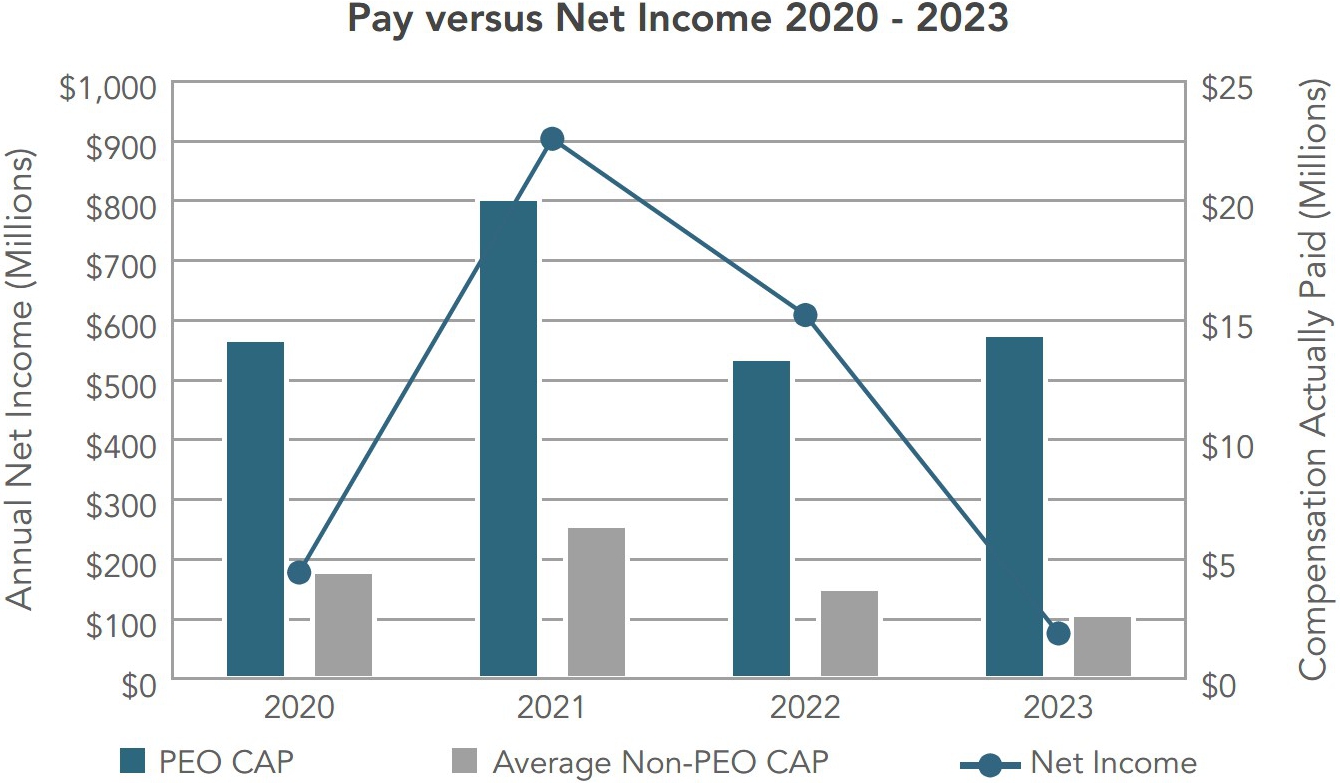
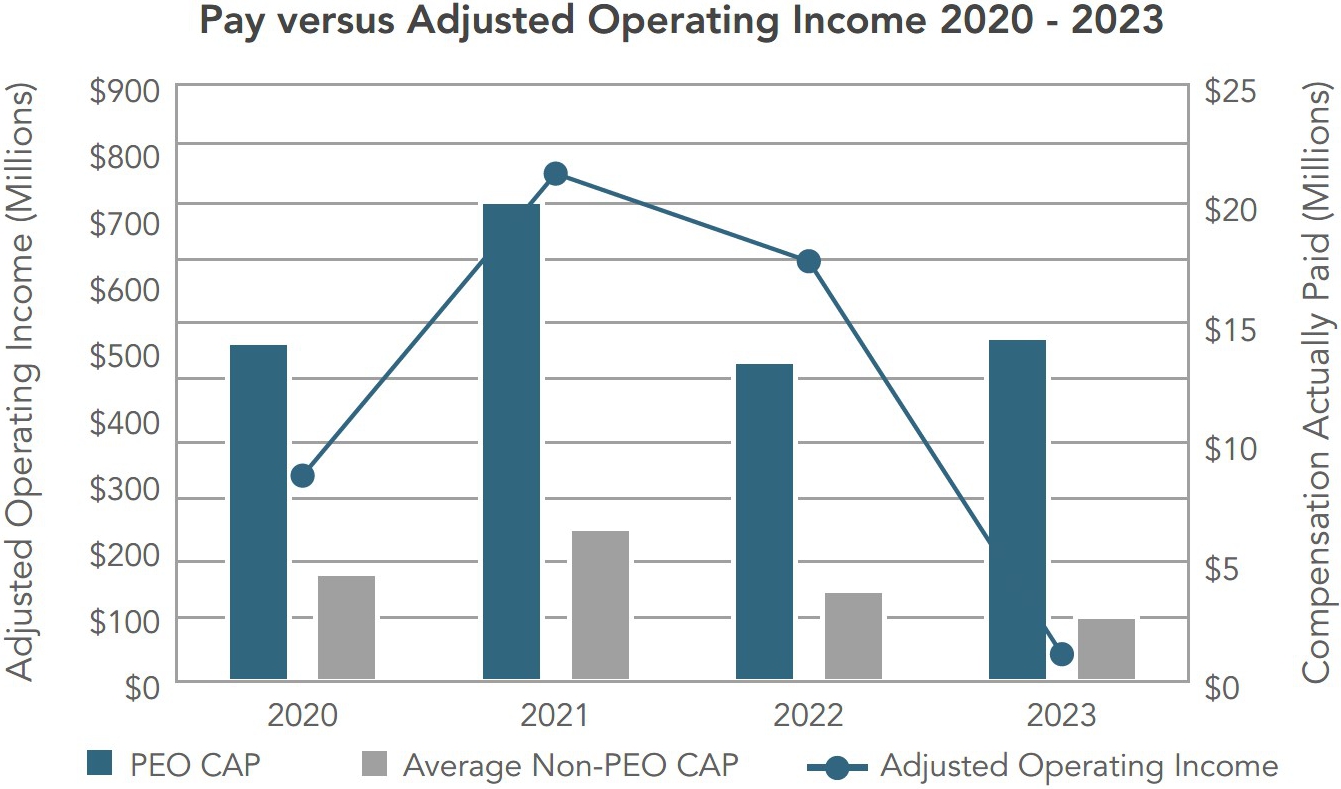
Company Selected Financial Performance Measures
For 2023, the company selected the following financial performance measures that link compensation actually paid to our NEOs to the company’s performance for the most recently completed fiscal year. Although these financial measures were selected, with the implementation of LDTI in 2023, the company will continue to review and evaluate performance measures for its executive compensation programs, as the company measures performance of its U.S. life insurance subsidiaries using multiple key performance
| 2024 Proxy Statement | 103 |
| Executive Compensation |
indicators, including in-force rate action approvals as well as on statutory accounting results. For further information concerning the company’s pay-for-performance philosophy and how the company aligns executive compensation with the company’s performance, refer to the Compensation Discussion and Analysis section.
| 104 | Genworth Financial, Inc. |
Audit Matters
| Proposal 3 Ratification of the Selection of KPMG LLP as the Independent Registered Public Accounting Firm for 2024 |
The Audit Committee is directly responsible for the appointment, compensation, retention and oversight of the independent registered public accounting firm retained to audit our consolidated financial statements and to attest to the effectiveness of our internal control over financial reporting. The Audit Committee has selected KPMG LLP (“KPMG”) as our independent registered public accounting firm for 2024. KPMG has served continuously as our independent auditor in connection with and since our initial public offering in 2004. KPMG is a registered public accounting firm with the Public Company Accounting Oversight Board (“PCAOB”), as required by the Sarbanes-Oxley Act of 2002 and the rules of the PCAOB.
Each year, the Audit Committee evaluates the qualifications, performance and independence of the company’s independent auditor and determines whether to re-engage the current independent auditor for the following year. In doing so, the Audit Committee considers, among other things:
|
✔
external data relating to audit quality and performance, including recent PCAOB reports on KPMG and its peer firms
|
✔
KPMG’s tenure as our independent auditor and its familiarity with our operations and businesses, accounting policies and practices and internal control over financial reporting
| |
✔
the quality and efficiency of the services provided by the auditors, the auditors’ capabilities and technical expertise |
✔
KPMG’s independence |
Based on this evaluation, the members of the Audit Committee and our Board believe that the continued retention of KPMG is in the best interests of the company and our stockholders.
KPMG representatives are expected to attend the 2024 Annual Meeting. They will have an opportunity to make a statement if they desire to do so and will be available to respond to appropriate stockholder questions.
We are asking our stockholders to ratify the selection of KPMG as our independent registered public accounting firm. Although ratification is not required by our certificate of incorporation or Bylaws or otherwise, the Board is submitting the selection of KPMG to our stockholders for ratification as a matter of good corporate practice. If the selection is not ratified, the Audit Committee will consider whether it is appropriate to select another independent registered public accounting firm. Even if the selection is ratified, the Audit Committee in its discretion may select a different independent registered public accounting firm at any time during the year if it determines that such a change would be in the best interests of the company and our stockholders.
 | The Board recommends that stockholders vote FOR the ratification of the selection of KPMG LLP as our independent registered public accounting firm for the year 2024. |
| 2024 Proxy Statement | 105 |
| Audit Matters |
Review and Engagement of Independent Registered Public Accounting Firm
Upon the approval of the Audit Committee, Genworth retained KPMG to audit our consolidated financial statements for 2023 and to attest to the effectiveness of the company’s internal control over financial reporting. In addition, Genworth retained KPMG, as well as other accounting firms, to provide other accounting and advisory services in 2023.
The Audit Committee recognizes the importance of maintaining the independence of the company’s independent auditor, both in fact and appearance. In order to ensure continuing auditor independence, the Audit Committee periodically considers whether there should be a rotation of the independent auditor. In addition, the Audit Committee has adopted restrictions on our hiring of certain persons associated with KPMG or its affiliates, including any partner, director, manager, staff, advising member of the department of professional practice, reviewing actuary, reviewing tax professional and any other persons having responsibility for providing audit assurance on any aspect of their certification of the company’s financial statements. The PCAOB and Audit Committee also require the lead KPMG partner assigned to our audit to be rotated at least every five years. The Audit Committee and its chair are directly involved in the selection of the new lead partner.
Approval of Audit and Non-Audit Services
We understand the need for KPMG to maintain objectivity and independence in its audit of our consolidated financial statements. As required by our Independent Auditor Services Policy, the Audit Committee’s charter and applicable SEC and PCAOB rules and regulations, the Audit Committee pre-approves all audit, audit-related, tax and other permitted non-audit services performed by KPMG, including the amount of fees payable for such services, to ensure that the provision of such services does not impair KPMG’s independence. The Audit Committee may not delegate this responsibility to management. Certain audit and audit-related services and fees are pre-approved by the Audit Committee on an annual basis in connection with the engagement of KPMG as the company’s independent registered public accounting firm for the fiscal year. Other audit, audit-related and permitted non-audit services have been pre- approved by the Audit Committee pursuant to our Independent Auditor Services Policy and are subject to fee caps.
Any other audit, audit-related and permitted non-audit services and all tax services must be specifically pre-approved by the Audit Committee.
| 106 | Genworth Financial, Inc. |
| Audit Matters |
Auditor Fees
The aggregate fees billed by KPMG in 2023 and 2022 for professional services rendered were:
| 2023 | 2022 | |||||
| Type of Fees | (in millions) | |||||
| Audit Fees(1) | $ | 9.5 | $ | 8.4 | ||
| Audit-Related Fees(2) | 0.9 | 1.1 | ||||
| Tax Fees(3) | — | — | ||||
| All Other Fees(4) | 0.1 | 0.1 | ||||
| Total | $ | 10.5 | $ | 9.6 | ||
| (1) | Fees for services to perform an audit or review in accordance with either the standards of the PCAOB or similar bodies in other countries, or generally accepted auditing standards and services that generally only Genworth’s independent registered public accounting firm can reasonably provide, such as the audit of Genworth’s Annual Report on Form 10-K and related consolidated financial statements included in public offerings or filings, the review of the financial statements included in our Quarterly Reports on Form 10-Q, and for services that are normally provided by accountants in connection with statutory and regulatory filings or engagements. |
| (2) | Fees for assurance and related services that are traditionally performed by Genworth’s independent registered public accounting firm, such as audit and related services for employee benefit plan audits, internal control reviews, document production requests, attest services not required by statute or regulation, activities and comfort letters, and consultation concerning financial accounting and reporting standards. |
| (3) | Fees for tax compliance, consultation and planning services totaled $4,000 and $3,800 for 2023 and 2022, respectively. Tax compliance generally involves preparation of original and amended tax returns, claims for refunds, tax payment planning services and assistance with tax audits and filing appeals. |
| (4) | Fees not considered audit or audit-related, such as actuarial services. |
| 2024 Proxy Statement | 107 |
| Audit Matters |
Report of the Audit Committee
We have reviewed and discussed the company’s audited financial statements and management’s annual report on internal control over financial reporting with management, which has primary responsibility for the financial statements and related internal controls. KPMG LLP (“KPMG”), the company’s independent registered public accounting firm for 2023, is responsible for expressing an opinion on the conformity of the company’s audited financial statements with U.S. generally accepted accounting principles and on the effectiveness of the company’s internal control over financial reporting. The committee has discussed with KPMG the matters required to be discussed under the applicable requirements of the Public Company Accounting Oversight Board (United States) (the “PCAOB”) and the U.S. Securities and Exchange Commission (the “SEC”). The committee has received the written disclosures and letters from KPMG in accordance with PCAOB Rule 3526, Communication with Audit Committees Concerning Independence, regarding the independent accountant’s communications with the audit committee concerning independence, and the committee discussed with KPMG its independence. The committee also concluded that KPMG’s provision of audit and non-audit services to the company and its affiliates is compatible with KPMG’s independence.
Based on the review and discussions referred to above, the committee recommended to our Board of Directors that the audited financial statements be included in our Annual Report on Form 10-K for the fiscal year ended December 31, 2023 for filing with the SEC. This report is provided by the following independent directors, who constitute the committee:
Robert P. Restrepo Jr., Chair
Karen E. Dyson
Melina E. Higgins
Elaine A. Sarsynski
| 108 | Genworth Financial, Inc. |
Approval of Amendments to Genworth’s Certificate of Incorporation
|
Proposal 4
Approval of an Amended and Restated Certificate of Incorporation to Remove All References to Legacy GE Provisions Including the Removal of References to Class B Common Stock and Renaming Class A Common Stock |
General
The Board recommends that Genworth’s stockholders approve an Amended and Restated Certificate of Incorporation as set forth in Appendix A (the “Amended and Restated Charter”) to remove all references in Genworth’s Certificate of Incorporation to legacy GE provisions including the removal of references to Class B Common Stock and renaming Class A Common Stock.
Reasons for Proposed Amendments
We are seeking stockholder approval of the Amended and Restated Charter, which will eliminate from Genworth’s Certificate of Incorporation the reference to our former parent company, General Electric Company, and eliminate the references to shares of Class B common stock, since there are no outstanding shares of Class B common stock. We propose to remove all references to the Class B common stock, reduce the company’s authorized number of shares of capital stock from 2.3 billion to 1.6 billion to reflect the elimination of 700 million authorized shares of Class B common stock, remove provisions relating specifically to the designation and attributes of Class B common stock and clean up related provisions in the Certificate of Incorporation. Additionally, the Amended and Restated Charter will rename our Class A common stock as “common stock,” and make related conforming changes. Our Board has adopted, approved and declared advisable the Amended and Restated Charter and has directed that it be submitted to stockholders for adoption and approval. As set forth in Appendix A, by approval of this Proposal No. 4, the stockholders will be deemed to have adopted and approved two separate Amended and Restated Charters, one with the ownership threshold for stockholders calling a special meeting set at 40% and one set at 25%. If this proposal is approved by our stockholders, the company will file only one Amended and Restated Charter. Such Amended and Restated Charter will include an ownership threshold for stockholders calling a special meeting of either (a) 40% if Proposal No. 5 is not approved by stockholders or (b) 25% if Proposal No. 5 is approved by stockholders, and the Amended and Restated Charter that is not filed with the Secretary of State of the State of Delaware will be abandoned. Each percentage (as shown in brackets in Appendix A) together with the remaining provisions of the Amended and Restated Charter not appearing in brackets in
| 2024 Proxy Statement | 109 |
| Approval of Amendments to Genworth’s Certificate of Incorporation |
the Amended and Restated Charter, constitutes a separate form of the Amended and Restated Charter. Any references to the “’Amended and Restated Charter” in this Proposal No. 4 shall be a reference to both forms of the Amended and Restated Charter unless otherwise specifically provided.
There are no shares of our Class B common stock outstanding. The company has no plans or intentions to issue any shares of Class B common stock in the future. The Board has proposed the Amended and Restated Charter because it believes the reference to a dual class structure and the Class B common stock in the Certificate of Incorporation is unnecessary, burdensome and potentially confusing to investors and the capital markets.
Our Board also believes that the renaming of the company’s Class A common stock as “common stock” will help eliminate any mistaken belief on the part of the investing public and/or others who report or follow our publicly traded equity securities that we may have another class of common equity. Such renaming will have no effect on stockholders rights with respect to such shares.
The proposed amendments set forth in the Amended and Restated Charter will not change any substantive terms of the Class A common stock or any powers or rights of its holders. The common stock will continue to be listed and trade on the NYSE under the symbol “GNW.” The Board does not believe that there are any disadvantages or anti- takeover effects to these proposed amendments.
If one form of the Amended and Restated Charter is filed and becomes effective, each stock certificate that immediately prior to the effective time of the Amended and Restated Charter represented shares of Class A common stock shall, from and after the effective time of the Amended and Restated Charter be deemed to represent the same number of shares of common stock held by such stockholder post-effective time.
The general description of this Proposal No. 4 of the amendments to the Certificate of Incorporation is qualified in its entirety by reference to the Amended and Restated Charter, which is attached hereto as Appendix A. The proposed Amended and Restated Charter would amend and restate the Certificate of Incorporation as set forth on Appendix A (proposed additions are indicated by bold underlining and proposed deletions are indicated by overstriking).
Each of Proposal No. 4 and Proposal No. 5 is not conditioned upon the approval of the other proposal.
Although we presently intend to file the Amended and Restated Charter (setting forth the appropriate ownership threshold for stockholders requesting the calling of a special meeting of stockholders (depending on whether Proposal No. 5 is approved by stockholders)), notwithstanding stockholder approval of the Amended and Restated Charter, our Board will have discretion as to whether to file and effect one form of the Amended and Restated Charter and reserves the right to abandon the Amended and Restated Charter without any further action by our stockholders if at any time prior to the filing or effectiveness of the Amended and Restated Certificate of Incorporation, our Board determines, in its sole discretion, that the Amended and Restated Certificate of Incorporation is no longer in the best interests of our company and our stockholders.
By voting in favor of the Amended and Restated Charter, stockholders are also expressly authorizing our Board to determine not to proceed with, or abandon, one or both forms of the Amended and Restated Charter if it should so decide. Additionally, if our Board determines to file and effect the Amended and Restated Charter, the Amended and Restated Charter setting forth the appropriate ownership threshold for stockholders requesting the calling of a special meeting of stockholders (depending on whether Proposal No. 5 is approved by stockholders) will be filed with the Secretary of State of the State of Delaware and the Amended and Restated Charter that included the alternative ownership threshold for stockholders requesting the calling of a special meeting of stockholders will be abandoned.
| 110 | Genworth Financial, Inc. |
| Approval of Amendments to Genworth’s Certificate of Incorporation |
For the proposed Amended and Restated Charter to be duly adopted, this Proposal No. 4 must receive the affirmative vote of the holders of a majority of the shares of common stock outstanding and entitled to vote thereon. If approved, we anticipate filing the Amended and Restated Charter with the Delaware Secretary of State (setting forth the appropriate ownership threshold for stockholders requesting the calling of a special meeting of stockholders (depending on whether Proposal No. 5 is approved by stockholders)) as soon as practicable following stockholder approval, and the Amended and Restated Charter will become effective only upon such filing.
If this proposal is not approved, then the amendments to the Certificate of Incorporation contemplated by the Amended and Restated Charter will not become effective, and the current provisions of the Certificate of Incorporation will continue to remain in existence, subject to potential amendment of the Certificate of Incorporation as contemplated by Proposal No. 5.
Specific Proposed Amendments
The proposed changes are shown in their entirety in the marked Amended and Restated Certificate of Incorporation that is attached as Appendix A.
 |
The Board recommends that stockholders vote FOR the approval of an Amended and Restated Certificate of Incorporation to remove all references to legacy GE provisions including the removal of references to Class B Common Stock and renaming Class A Common Stock. |
| 2024 Proxy Statement | 111 |
| Approval of Amendments to Genworth’s Certificate of Incorporation |
|
Proposal 5
Approval of an Amendment to the Certificate of Incorporation to Provide Stockholders the Right to Request the Calling of a Special Meeting of Stockholders at a 25% Ownership Threshold |
General
The Board recommends that Genworth’s stockholders approve an amendment to Genworth’s Certificate of Incorporation to provide stockholders owning 25% or more of our outstanding common stock with the right to request the calling of a special meeting of stockholders (a “special meeting”), subject to the requirements and procedures set forth in the company’s Amended and Restated Bylaws (the “Bylaws”), as now or hereinafter in effect.
Reasons for Proposed Amendment
We are seeking stockholder approval of an amendment to the Certificate of Incorporation to provide stockholders owning 25% or more of our outstanding common stock with the right to request the calling of a special meeting subject to the requirements and procedures set forth in the Bylaws (the “Special Meeting Proposal”).
If this Proposal No. 5 and Proposal No. 4 are approved by our stockholders, we currently intend to file the Amended and Restated Charter with the Secretary of State of the State of Delaware and such Amended and Restated Charter will include an ownership threshold for stockholders to request the calling of a special meeting of 25%. If, however, this Proposal No. 5 is approved by our stockholders but Proposal No. 4 is not approved by our stockholders, then we intend to file a Certificate of Amendment implementing the proposed revisions to Article VI of Genworth’s Certificate of Incorporation as shown on Appendix B attached hereto, which would solely effect the lowering of the current ownership threshold on stockholders’ rights to request the calling of a special meeting of stockholders from 40% to 25%. If this proposal is approved, the Board will also adopt a resolution to amend Section 2.2(d) of the Bylaws to provide stockholders owning 25% or more of our outstanding common stock with the right to request the calling of a special meeting of stockholders, in conformity with the proposed amendment to the Certificate of Incorporation.
The ability of stockholders to request the calling of special meetings is increasingly considered an important aspect of good corporate governance. Our Certificate of Incorporation currently permits stockholders who own at least 40% of our outstanding common stock to request that the company call a special meeting. This threshold was adopted in connection with the company’s initial public offering in 2004, following which an affiliate of General Electric Company beneficially owned approximately 70% of our outstanding common stock. Since that time, this legacy threshold has become outdated as General Electric disposed of its ownership stake and market practice on thresholds to call special meetings evolved.
While the Board recognizes that providing stockholders with the right to request the calling of special meetings is an important governance mechanism, the Board also believes special meetings to be extraordinary events. Special meetings should be held only if a substantial number of stockholders agree that a special meeting is necessary to discuss time-sensitive and critical matters. Special meetings should not be a mechanism that a small group of stockholders may wield to advance private agendas or interests that our broader stockholder base may not share and might not ultimately adopt at the meeting. In addition,
| 112 | Genworth Financial, Inc. |
| Approval of Amendments to Genworth’s Certificate of Incorporation |
organizing and preparing for a special meeting may be disruptive and divert significant time and attention of our Board and management away from their primary focus of overseeing and operating our business and creating long-term stockholder value. Further, with each special meeting, we may incur significant expenses in order to prepare the disclosures required for such meeting, print and distribute materials, solicit proxies, and tabulate votes. The Board believes that a 25% ownership threshold represents a critical mass of support for the business proposed to be brought before the meeting, ensuring that the business proposed by stockholders is broadly supported by stockholders and has a credible chance of being adopted at the meeting.
The Board considered the views of our stockholders in connection with crafting this proposal. In late 2023 and early 2024, we requested meetings with the corporate governance teams at stockholders representing 43.5% of our outstanding shares, as a result of which we engaged with teams at stockholders holding 28.9% of our outstanding shares. We used these communications to discuss our stockholders’ views of rights to call special meetings as well as other governance-related matters. Based on these discussions and giving consideration to the voting guidelines of some of our largest stockholders, we believe our stockholders generally support rights to request the calling of special meetings at the proposed 25% threshold.
Furthermore, a 25% ownership threshold aligns with the corporate governance practices among S&P 600 companies. Specifically, 80% of S&P 600 companies have an ownership threshold of 25% or higher (including 46% of S&P 600 companies that do not permit stockholders to call a special meeting).
After careful consideration of the company’s corporate governance standards, stockholder feedback, trends and best practices in corporate governance, the Board and the Governance Committee believe that the adoption of the right for stockholders to request the calling of a special meeting at an ownership threshold of 25% in this Proposal No. 5 establishes the appropriate balance between enhancing stockholder rights and adequately protecting stockholder interests. Our Board has approved the Special Meeting Proposal and has directed that it be submitted to stockholders for adoption and approval.
Specific Proposed Amendment
The general description in this Proposal No. 5 of the amendment to the Certificate of Incorporation is qualified in its entirety by reference to the text of the proposed amendment, which is attached to this Proxy Statement as Appendix B and is marked to show the changes described above.
For the proposed amendment to the Certificate of Incorporation to become effective, this Proposal No. 5 must receive the affirmative vote of the holders of a majority of the shares of common stock outstanding and entitled to vote thereon. If this Proposal No. 5 and Proposal No. 4 are adopted and approved by our stockholders, we currently intend to file the Amended and Restated Charter with the Secretary of State of the State of Delaware and such Amended and Restated Charter will include an ownership threshold for stockholders calling a special meeting of 25%. If, however, this Proposal No. 5 is approved by our stockholders but Proposal No. 4 is not approved by our stockholders, then we currently intend to file a Certificate of Amendment implementing the proposed revisions to Article VI of Genworth’s Certificate of Incorporation as shown on Appendix B attached hereto, which would solely effect the lowering of the current ownership threshold on stockholders’ rights to call a special meeting of stockholders from 40% to 25%. If Proposal No. 5 is approved by our stockholders, the Board also intends to adopt a conforming amendment to Section 2.2(d) of the Bylaws.
If this proposal is not approved, then the amendment to the Certificate of Incorporation contemplated by this Proposal No. 5 will not become effective, and the current provisions of the Certificate of Incorporation will continue to remain in existence, subject to potential amendment and restatement of the Certificate of Incorporation as contemplated by Proposal No. 4. Additionally, each of Proposal No. 4 and Proposal No. 5 is not conditioned upon the approval of the other proposal.
| 2024 Proxy Statement | 113 |
| Approval of Amendments to Genworth’s Certificate of Incorporation |
Although we presently intend to file and effect the proposed amendment to the Certificate of Incorporation, notwithstanding stockholder approval of such amendment, our Board will have discretion as to whether to file and effect the proposed amendment and reserves the right to abandon such amendment without any further action by our stockholders if at any time prior to the filing or effectiveness of the amendment, our Board determines, in its sole discretion, that the amendment is no longer in the best interests of our company and our stockholders. By voting in favor of the proposed amendment, stockholders are also expressly authorizing our Board to determine not to proceed with, or abandon, such amendment if it should so decide.
 |
The Board recommends that stockholders vote FOR the approval of an amendment to the Certificate of Incorporation to provide stockholders owning a combined 25% or more of the company’s outstanding common stock with the right to request the calling of a special meeting of stockholders. |
| 114 | Genworth Financial, Inc. |
Information About Our Stock
Ownership of Genworth Common Stock
The following table sets forth information as of March 1, 2024, except as indicated in the footnotes to the table, regarding the beneficial ownership of our common stock by:
| ● | all persons (including any “group” as that term is used in Section 13(d)(3) of the Exchange Act) known by us to own beneficially more than 5% of any class of our common stock (based on the most recently available information filed with the SEC); |
| ● | the named executive officers included in the 2023 Summary Compensation Table above; |
| ● | each of our current directors and the Board’s director nominees; and |
| ● | all current directors and executive officers as a group. |
Beneficial ownership is determined in accordance with the rules of the SEC. Except as indicated in the footnotes to the table, each of the directors, and executive officers possesses sole voting and investment power with respect to all shares set forth opposite his or her name. In computing the number of shares beneficially owned by a person and the percentage ownership of that person, shares of common stock issuable upon the conversion of RSUs held by that person that are currently exercisable or convertible, or are exercisable or convertible within 60 days of March 1, 2024, are deemed to be issued and outstanding. These shares, however, are not deemed outstanding for purposes of computing percentage ownership of any other stockholder. As of March 1, 2024, there were 440,371,834 shares of common stock outstanding and no shares of any other class of voting securities outstanding.
The address of each director and executive officer listed below is c/o Genworth Financial, Inc., 6620 West Broad Street, Richmond, Virginia 23230.
| Beneficial Ownership | ||||||
| Name of Beneficial Owner | Number of Shares |
Percentage | Other Non-Management Director Stock-Based Holdings(1) | |||
| BlackRock, Inc.(2) | 66,119,154 | 15.0 | % | |||
| The Vanguard Group, Inc.(3) | 52,895,552 | 12.0 | % | |||
| Dimensional Fund Advisors LP(4) | 30,294,805 | 6.9 | % | |||
| Thomas J. McInerney(5) | 5,541,944 | 1.3 | % | |||
| Jerome T. Upton(6) | 346,969 | * | ||||
| Kelly A. Saltzgaber(6) | 58,025 | * | ||||
| Gregory S. Karawan(6) | 270,719 | * | ||||
| Brian K. Haendiges(6)(7) | 418,017 | * | ||||
| Daniel J. Sheehan(8) | 348,711 | * | ||||
| G. Kent Conrad | — | — | 290,942 | |||
| Karen E. Dyson | — | — | 100,072 | |||
| Jill R. Goodman | — | — | 97,421 | |||
| Melina E. Higgins | — | — | 360,511 | |||
| Howard D. Mills | — | — | 97,421 | |||
| Robert P. Restrepo Jr. | 50,000 | * | 219,514 | |||
| Elaine A. Sarsynski | — | — | 90,040 | |||
| Ramsey D. Smith | — | — | 97,421 | |||
| All directors and executive officers as a group (17 persons)(9) |
7,862,023 | 1.8 | % | |||
| 2024 Proxy Statement | 115 |
| Information About Our Stock |
| * | Less than 1%. |
| (1) | Represents DSUs and RSUs held by the non-management directors. DSUs settle in shares of common stock beginning one year after the director leaves the Board in a single payment or in payments over 10 years, at the election of the director, or earlier upon the death of the director. RSUs will be settled in shares of common stock on a one-for-one basis (i) upon vesting on the one-year anniversary of the grant date (or earlier upon termination of service as a director due to retirement (pro rata), death or disability, or a Change of Control, as defined in the 2021 Genworth Financial, Inc. Omnibus Incentive Plan), (ii) if elected by the director, upon termination of service as a director, or (iii) if elected by the director, in a year selected by the director (or earlier upon death or a Change of Control). See the Compensation of Directors section for more information. |
| (2) | Information obtained solely by reference to the Schedule 13G/A filed with the SEC on January 22, 2024, by BlackRock, Inc. (“BlackRock”). BlackRock reported that it has sole power to vote or direct the vote of 65,237,197 shares and that it has sole power to dispose or to direct the disposition of 66,119,154 shares. The address for BlackRock is 50 Hudson Yards, New York, New York 10001. |
| (3) | Information obtained solely by reference to the Schedule 13G/A filed with the SEC on February 13, 2024, by The Vanguard Group, Inc. (“Vanguard”). Vanguard reported that it has sole power to vote or direct the vote of 0 shares that it beneficially owns and has shared power to vote or direct to vote of 427,920 shares, and that it has sole power to dispose or to direct the disposition of 51,982,087 shares and has shared power to dispose or to direct the disposition of 913,465 shares. The address for Vanguard is 100 Vanguard Blvd., Malvern, Pennsylvania 19355. |
| (4) | Information obtained solely by reference to the Schedule 13G filed with the SEC on February 9, 2024, by Dimensional Fund Advisors LP (“Dimensional”). Dimensional reported that it has sole power to vote or direct the vote of 29,840,461 shares and that it has sole power to dispose or to direct the disposition of 30,294,805 shares. The address for Dimensional is 6300 Bee Cave Road, Building One, Austin, Texas, 78746 |
| (5) | Includes 979,964 shares that Mr. McInerney contributed to a grantor retained annuity trust (GRAT) in May 2023. |
| (6) | Includes shares of common stock issuable upon conversion of RSUs that are scheduled to vest in the 60-day period following the date of this table, as follows: for Mr. Upton, 24,802; Mr. Haendiges, 62,004; for Mr. Karawan, 17,362; and for Ms. Saltzgaber, 42,000. |
| (7) | Mr. Haendiges resigned from his role as Executive Vice President—U.S. Life Insurance effective December 31, 2023, and retired from Genworth in April 2024. |
| (8) | Mr. Sheehan transitioned from the role of Executive Vice President, Chief Financial Officer & Chief Investment Officer of the company effective March 1, 2023. |
| (9) | Represents ownership by all current directors and executive officers, including 159,034 shares of common stock issuable upon conversion of RSUs that are scheduled to vest in the 60-day period following the date of this table. |
| 116 | Genworth Financial, Inc. |
| Information About Our Stock |
Ownership of Public Company Genworth Subsidiary
Enact Holdings, Inc.
In September 2021, Enact, our indirect, majority-owned subsidiary, completed an initial public offering of its common shares. As of March 1, 2024, Genworth beneficially owned approximately 81.6% of the common shares of Enact. The following table sets forth information as of March 1, 2024, regarding the beneficial ownership of the common shares of Enact by our directors and named executive officers and all of our current directors and executive officers as a group. Beneficial ownership is determined in accordance with the rules of the SEC. The directors and executive officers that hold Enact common shares possess sole voting and investment power with respect to all shares set forth by their name. As of March 1, 2024, there were 159,108,759 common shares of Enact outstanding and no shares of any other class of voting securities outstanding.
| Beneficial Ownership | |||
| Name of Beneficial Owner | Number of Shares |
Percentage | |
| Thomas J. McInerney | — | — | |
| Jerome T. Upton | 5,000 | * | |
| Kelly A. Saltzgaber | — | — | |
| Gregory S. Karawan | 15,000 | * | |
| Brian K. Haendiges | — | — | |
| Daniel J. Sheehan IV(1) | — | — | |
| G. Kent Conrad | — | — | |
| Karen E. Dyson | 1,000 | * | |
| Jill R. Goodman | 1,300 | * | |
| Melina E. Higgins | 25,000 | * | |
| Howard D. Mills | — | — | |
| Robert P. Restrepo Jr. | 25,000 | * | |
| Elaine A. Sarsynski | — | — | |
| Ramsey D. Smith | — | — | |
| All directors and executive officers as a group (17 persons)(2) | 191,766 | * | |
| * | Less than 1%. |
| (1) | Mr. Sheehan transitioned from the role of Executive Vice President, Chief Financial Officer & Chief Investment Officer of the company effective March 1, 2023. |
| (2) | Represents ownership by all current directors and executive officers. |
| 2024 Proxy Statement | 117 |
| Information About Our Stock |
Equity Compensation Plan Information
The following table gives information as of December 31, 2023 about common stock that may be issued under all of our existing equity compensation plans:
| Plan Category | (a) Number of Securities to be Issued Upon Exercise of Outstanding Options, Warrants and Rights(2) |
(b) Weighted-Average Exercise Price of Outstanding Options, Warrants and Rights(3) |
(c) Number of Securities Remaining Available for Future Issuance Under Equity Compensation Plans (Excluding Securities Reflected in Column(a))(4) | ||
| Equity Compensation Plans Approved by Stockholders(1) |
18,616,424 | $12.23 | 17,756,904 |
| (1) | 2004 Genworth Financial, Inc. Omnibus Incentive Plan, 2012 Genworth Financial, Inc. Omnibus Incentive Plan, 2018 Genworth Financial, Inc. Omnibus Incentive Plan and 2021 Genworth Financial, Inc. Omnibus Incentive Plan. |
| (2) | Includes shares issuable pursuant to the exercise or conversion of SARs, RSUs, PSUs and DSUs. The number of shares issuable upon exercise of SARs is calculated based on the excess, if any, of the closing price of our common stock on December 31, 2023 of $6.68 over the base price of the SARs. The number of shares issuable upon conversion of PSUs is calculated based on maximum payout levels until the performance period closes and the award settles. |
| (3) | Calculation of weighted-average exercise price of outstanding awards includes SARs (which are exercisable for shares of common stock for no consideration) and stock options, but does not include RSUs, PSUs and DSUs that convert to shares of common stock for no consideration. There are no stock options outstanding. The weighted-average base price of outstanding SARs is $12.23. |
| (4) | Reflects shares reserved and available for future issuance under the 2021 Genworth Financial, Inc. Omnibus Incentive Plan. Under the Plan, each stock option and SAR counts as one share against the share reserve, and each full-value award counts as 1.25 shares against the share reserve. Accordingly, a total of approximately 14,205,523 shares are available for issuance pursuant to grants to full-value stock awards. |
| 118 | Genworth Financial, Inc. |
Questions and Answers about the 2024 Annual Meeting and Voting
| Attending the Annual Meeting | 119 | |
| Voting | 120 | |
| Quorum and Vote Requirements | 123 | |
| Other Annual Meeting Matters | 125 | |
| SEC Filings and Reports | 126 |
Attending the Annual Meeting
How will the 2024 Annual Meeting be conducted?
The meeting will be conducted virtually and will include management remarks and a question-and-answer session. All stockholders of record on March 25, 2024 are invited to participate in the meeting. We intend to structure our virtual meeting to provide stockholders similar opportunities to participate as if the meeting were held in person, including the ability to vote shares electronically during the meeting and submit written questions, in advance or during the annual meeting, in accordance with the rules of conduct for the meeting.
The agenda and additional information regarding the rules and procedures for participating in the virtual 2024 Annual Meeting will be provided during the meeting on the meeting website.
Only stockholders who enter a valid control number, which was included with your proxy materials, and name will be allowed to vote and submit up to three (3) written questions. Questions relevant to meeting matters will be answered during the meeting as time allows, to emulate an in-person question and answer session. A recording of the entire meeting will be posted on the investor page of our website.
How do I attend the 2024 Annual Meeting?
If you are a holder of record or a beneficial owner of our common stock as of the record date, or you hold a valid proxy for the 2024 Annual Meeting, you may attend the 2024 Annual Meeting, vote, and submit a question during the 2024 Annual Meeting by visiting www.virtualshareholdermeeting.com/GNW2024 and using your 16-digit control number, which was included with your proxy materials, and name to enter the meeting.
If you are not a stockholder or do not have a control number, you may still access the meeting as a guest, but you will not be able to vote or submit questions.
Online access for the 2024 Annual Meeting will begin at 8:45 a.m. ET on May 23, 2024. We encourage you to access the meeting website prior to the start time so that technical difficulties may be addressed by the 2024 Annual Meeting begins.
What if I need technical assistance?
If you encounter any technical difficulties in accessing the 2024 Annual Meeting, the technical support number will be available on the 2024 Annual Meeting log in page 15 minutes before the start of the meeting.
| 2024 Proxy Statement | 119 |
| Questions and Answers about the 2024 Annual Meeting and Voting |
Voting
What matters are to be voted on at the 2024 Annual Meeting, and what is the recommendation of the Board with respect to each proposal?
| Agenda Item |
Proposal | Page Number | Board Recommendation | |||
| 1. | To elect nine directors to serve until the next annual meeting | 17 | FOR the nine nominees of the Board | |||
| 2. | To approve, on an advisory basis, the compensation of our named executive officers | 59 | FOR | |||
| 3. | To ratify the selection of KPMG as our independent registered accounting firm for 2024 | 105 | FOR | |||
| 4. | To approve an Amended and Restated Certificate of Incorporation to remove all references to legacy GE provisions including the removal of references to Class B Common Stock and renaming Class A Common Stock | 109 | FOR | |||
| 5. | To approve an amendment to Genworth’s Certificate of Incorporation to provide stockholders the right to request the calling of a special meeting of stockholders at a 25% ownership threshold | 112 | FOR |
Will any other matters be presented for a vote at the 2024 Annual Meeting?
At this time, we are not aware of any other matters that will be presented for a vote at the 2024 Annual Meeting. However, if another matter were to be properly presented, the proxies would use their own judgment in how to vote on that matter.
Who is entitled to vote at the 2024 Annual Meeting?
All holders of our Class A Common Stock, par value $0.001 (our “common stock”), issued and outstanding at the close of business on March 25, 2024 (the “record date”) are entitled to vote at the 2024 Annual Meeting. As of the record date, there were 439,459,368 shares of our common stock issued and outstanding. Each share outstanding on the record date will be entitled to one vote.
How do I vote my shares before the 2024 Annual Meeting?
Record Holders.
Stockholders of record may submit a proxy to cause their shares to be represented and voted at the 2024 Annual Meeting. Stockholders of record may grant a proxy with respect to their shares by mail, by telephone or by internet. Granting a proxy by telephone or internet will be available through 11:59 p.m. Eastern time on May 22, 2024. Voting instructions appear on your proxy card. If you grant a proxy by telephone or by internet, please have your proxy card available.
Beneficial Holders.
If you are the beneficial owner, but not the record owner, of our common stock, you will receive instructions about voting from the bank, broker or other nominee that is the stockholder of record of your shares. Your ability to vote over the internet or by telephone depends on the voting procedures of your bank, broker or other nominee.
| 120 | Genworth Financial, Inc. |
| Questions and Answers about the 2024 Annual Meeting and Voting |
Retirement Plan Holders.
If you hold shares of our common stock through the Genworth Retirement and Savings Plan, you will receive instructions about how to direct the trustee of your plan to vote your shares. Please review these voting instructions to determine your ability to vote over the internet or by telephone.
Proxies or voting instruction forms submitted by mail, telephone or internet will be voted in the manner indicated by the individuals named on the proxy card or voting instruction form.
Canada Stock Savings Plan Holders:
If you hold shares of our common stock through the Genworth Financial Canada Stock Savings Plan, you will receive instructions about how to direct the trustee of your plan to vote your shares. Please review these voting instructions to determine your ability to vote over the internet or by telephone.
Proxies or voting instruction forms submitted by mail, telephone or internet will be voted in the manner indicated by the individuals named on the proxy card or voting instruction form.
How do I vote my shares during the 2024 Annual Meeting?
Record Holders.
Stockholders of record may vote their shares at the 2024 Annual Meeting by attending the 2024 Annual Meeting. See “How do I attend the 2024 Annual Meeting?” above for information about how to attend the 2024 Annual Meeting.
Beneficial Holders.
Beneficial holders of our common stock as of the record date may vote their shares at the 2024 Annual Meeting by attending the 2024 Annual Meeting. See “How do I attend the 2024 Annual Meeting?” above for information about how to attend the 2024 Annual Meeting.
Retirement Plan Holders.
If you hold shares of our common stock through the Genworth Retirement and Savings Plan, please refer to the instructions you receive about how to direct the trustee of your plan to vote your shares. You must return your voting instructions with respect to any shares held through the Genworth Retirement and Savings Plan no later than 11:59 p.m. ET on May 20, 2024. You may not vote any shares held through the Genworth Retirement and Savings Plan during the 2024 Annual Meeting, as such shares may only be voted through the trustee.
Canada Stock Savings Plan Holders:
If you hold shares of our common stock through the Genworth Financial Canada Stock Savings Plan, please refer to the instructions you receive about how to direct the trustee of your plan to vote your shares. You must return your voting instructions with respect to any shares held through the Genworth Financial Canada Stock Savings Plan no later than 11:59 p.m. ET on May 21, 2024. You may not vote any shares held through the Genworth Financial Canada Stock Savings Plan during the 2024 Annual Meeting, as such shares may only be voted through the trustee.
| 2024 Proxy Statement | 121 |
| Questions and Answers about the 2024 Annual Meeting and Voting |
What if I sign and return my proxy card or voting instructions but do not specify how to vote my shares?
Record Holders.
If you submit a proxy card but do not specify how your shares are to be voted, the proxies will vote your shares:
| ● | FOR the election of the nine nominees of the Board, who are named in this Proxy Statement, as directors; |
| ● | FOR the approval, on an advisory basis, of the compensation of our named executive officers; |
| ● | FOR the ratification of the selection of KPMG as our independent registered public accounting firm for 2024; |
| ● | FOR the approval of an Amended and Restated Certificate of Incorporation to remove all references to legacy GE provisions including the removal of references to Class B Common Stock and renaming Class A Common Stock; and |
| ● | FOR the approval of an amendment to Genworth’s Certificate of Incorporation to provide stockholders the right to request the calling of a special meeting of stockholders at a 25% ownership threshold. |
Beneficial Holders.
If your shares are registered in the name of a broker, the NYSE rules applicable to brokers determine whether your broker may vote your share in its discretion even if it does not receive voting instructions from you.
At the 2024 Annual Meeting, the only “routine” matter proposed to be presented is the ratification of the selection of KPMG as our independent registered public accounting firm for 2024 (Proposal No. 3). Accordingly, if you do not provide your broker with timely voting instructions, your broker will be able to exercise discretionary authority on Proposal No. 3, and broker non-votes will occur as to each of the other proposals presented at the 2024 Annual Meeting, which are considered “non-routine” matters. Such broker non-votes will not affect the approval of these matters other than Proposal No. 4 and Proposal No. 5 where broker non-votes will have the effect of a vote against the proposal.
Retirement Plan Holders.
If you hold your shares through the Genworth Retirement and Savings Plan and submit your voting instruction form but do not specify how to vote your shares, the shares credited to your account will be voted by the trustee in the same proportion that it votes shares in other accounts for which it received timely instructions.
Canada Stock Savings Plan Holders:
If you hold your shares through the Genworth Financial Canada Stock Savings Plan and submit your voting instruction form but do not specify how to vote your shares, the shares credited to your account will be voted by the trustee in the same proportion that it votes shares in other accounts for which it received timely instructions.
| 122 | Genworth Financial, Inc. |
| Questions and Answers about the 2024 Annual Meeting and Voting |
May I change or revoke my proxy after it is submitted?
Yes, you may change or revoke your proxy before the 2024 Annual Meeting by:
| ● | subsequently granting a proxy by telephone or by internet; |
| ● | returning a later-dated proxy card; |
| ● | sending your notice of revocation to our Corporate Secretary; or |
| ● | attending the 2024 Annual Meeting and voting electronically. |
If you submit your changed proxy or revocation by telephone or by internet, it must be received by 11:59 p.m. Eastern time on May 22, 2024. If you submit your changed proxy or revocation by another method specified above, it must be received before the polls close for voting. Attendance at the meeting alone will not revoke a previously submitted proxy.
Quorum and Vote Requirements
What is a quorum?
In order for business to be conducted at the 2024 Annual Meeting, a quorum must be present. A quorum will be present if stockholders of record holding a majority in voting power of the outstanding shares of stock entitled to vote at the meeting are present or are represented by proxies. Abstentions and broker non-votes will be counted as shares present for purposes of determining whether a quorum is present.
| 2024 Proxy Statement | 123 |
| Questions and Answers about the 2024 Annual Meeting and Voting |
What vote is required for the items of business at the 2024 Annual Meeting, and how are abstentions and broker non-votes counted?
Holders of our common stock will vote as a single class and will be entitled to one vote per share with respect to each matter to be presented at the 2024 Annual Meeting.
| Proposal | Voting Options | Vote Required to Adopt the Proposal |
Effect of Abstentions |
Effect of Broker Non-Votes | ||||
|
Election of nine directors named in the Proxy Statement |
For, against or abstain for each nominee | Affirmative vote of a majority of votes cast for each nominee | No effect | No effect | ||||
| Approval, on an advisory basis, of the compensation of our named executive officers | For, against or abstain | Affirmative vote of a majority of shares of common stock present in person or represented by proxy and entitled to vote thereon* | Treated as votes against | No effect | ||||
| Ratification of the appointment of KPMG as our independent registered public accounting firm for 2024 | For, against or abstain | Affirmative vote of a majority of shares of common stock present in person or represented by proxy and entitled to vote thereon | Treated as votes against | N/A** | ||||
| Approval of an Amended and Restated Certificate of Incorporation to remove all references to legacy GE provisions including the removal of references to Class B Common Stock and renaming Class A Common Stock | For, against or abstain | Affirmative vote of a majority of the outstanding shares of common stock entitled to vote thereon | Treated as votes against | Treated as votes against | ||||
| Approval of an amendment to Genworth's Certificate of Incorporation to provide stockholders the right to request the calling of a special meeting of stockholders at a 25% ownership threshold | For, against or abstain | Affirmative vote of a majority of the outstanding shares of common stock entitled to vote thereon | Treated as votes against | Treated as votes against |
| * | The vote is advisory, and therefore not binding on the company, the Compensation Committee or our Board of Directors. However, the Compensation Committee will review the voting results and take them into consideration when making future decisions regarding executive compensation as it deems appropriate. |
| ** | Because this proposal is considered a routine proposal, banks, brokers, trustees and other nominees may vote our stockholders’ shares on this proposal without their instructions, and we anticipate there will be no broker non-votes with respect to this proposal. |
Who counts the votes?
The Board will continue, as it has in past years, to retain an independent tabulator to receive and tabulate the proxies and appoint an independent inspector of election to certify the results.
Where can I find the voting results of the 2024 Annual Meeting?
The preliminary voting results are expected to be announced at the 2024 Annual Meeting. In addition, within four business days following the 2024 Annual Meeting, we intend to file the final voting results with the SEC on a Form 8-K. If the final voting results have not been certified within that four-day period, we will report the preliminary voting results on a Form 8-K at that time and will file an amendment to the Form 8-K to report the final voting results within four business days of the date that the final results are certified. The final voting results will also be posted in the corporate governance section of our website. To view the results, go to our website: investor.genworth.com/news-events/annual-meeting-of-stockholders.
| 124 | Genworth Financial, Inc. |
| Questions and Answers about the 2024 Annual Meeting and Voting |
Other Annual Meeting Matters
What are the costs for soliciting proxies for the 2024 Annual Meeting?
Proxies will be solicited on behalf of the Board of Directors by mail, telephone, or other electronic means and we will pay the solicitation costs. In addition to soliciting proxies by mail, our directors, the Board’s director nominees, certain executive officers, and certain regular employees may solicit proxies on behalf of the Board, without additional compensation, personally or by telephone. The regular employees will be administrative personnel. Copies of proxy materials and of the 2023 Annual Report (as defined below) will be supplied to brokers, dealers, banks and voting trustees, or their nominees, for the purpose of soliciting proxies from beneficial owners, and we will reimburse such record holders for their reasonable expenses. Georgeson Inc. has been retained to assist in soliciting proxies at a fee of $22,000, plus distribution costs and other costs and expenses.
What is the deadline for submission of stockholder proposals for the 2025 Annual Meeting?
The rules of the SEC establish the eligibility requirements and the procedures that must be followed for a stockholder’s proposal to be included in a public company’s proxy materials. Pursuant to those rules, any proposal for inclusion in Genworth’s proxy materials for an annual meeting held in 2025 (the “2025 Annual Meeting”) must be received at our principal executive offices on or before December 9, 2024.
In addition, our Bylaws establish an advance notice procedure with regard to director nominations and other business proposals by stockholders intended to be presented at our 2025 Annual Meeting. For these nominations or other business proposals to be properly brought before the meeting by a stockholder, assuming the 2025 Annual Meeting occurs on a date that is not more than 30 days before or 70 days after the anniversary of the 2024 Annual Meeting, the stockholder must deliver written notice to us not later than February 22, 2025 nor earlier than the close of business on January 23, 2025. Such nominations and other business proposals must comply with all requirements set forth in our Bylaws.
All notices of intention to present director nominations or other business proposals at the 2025 Annual Meeting, whether or not intended to be included in our proxy materials, should be addressed to: Corporate Secretary, Genworth Financial, Inc., 6620 West Broad Street, Richmond, Virginia 23230.
| 2024 Proxy Statement | 125 |
| Questions and Answers about the 2024 Annual Meeting and Voting |
SEC Filings and Reports
May I request electronic delivery of proxy statements and annual reports in the future?
Stockholders of record may elect to receive future proxy statements and annual reports electronically by providing consent to electronic delivery online at www.proxyvote.com. Should you choose to receive your proxy materials electronically, your choice will remain in effect until you notify Genworth or Broadridge Financial Solutions, Inc., in accordance with applicable law, that you wish to resume mail delivery of these documents. If you hold your Genworth common stock through a bank, broker or other nominee, refer to the information provided by that entity for instructions on how to receive your proxy materials electronically.
Where can I view this Proxy Statement and Genworth’s 2023 Annual Report electronically?
This Proxy Statement and Genworth’s 2023 Annual Report may be viewed online at www.proxyvote.com.
How can I get a copy of Genworth’s Annual Report on Form 10-K?
To obtain a copy of Genworth’s 2023 Annual Report, which includes our Form 10-K for the fiscal year ended December 31, 2023, without charge, address your request to Investor Relations, Genworth Financial, Inc., 6620 West Broad Street, Richmond, Virginia 23230. In addition, the 2023 Annual Report may be accessed at our website: https://investor.genworth.com/sec-filings/annual-reports. Our Form 10-K for the fiscal year ended December 31, 2023 also may be accessed at the SEC’s website at www.sec.gov.
| 126 | Genworth Financial, Inc. |
Other Information
Voting
Your vote is important. We encourage you to participate in the 2024 Annual Meeting, either by attending and voting or by voting through other acceptable means. Whether or not you plan to attend the 2024 Annual Meeting, please take the time to vote your shares as soon as possible. You can ensure that your shares are voted at the meeting by submitting your proxy by telephone, by internet or by completing, signing, dating and returning the proxy card (or voting instruction form, if you hold your shares through a broker, bank or other nominee). Submitting your proxy by any of these methods will not affect your right to attend the meeting and vote. A stockholder who gives a proxy may revoke it by voting at the 2024 Annual Meeting, by delivering a subsequent proxy or by notifying Genworth’s Corporate Secretary in writing of such revocation. Attendance at the meeting alone will not revoke a previously submitted proxy.
Each share of Class A Common Stock issued and outstanding as of the record date is entitled to one vote for each director nominee and one vote for each of the other proposals properly presented at the meeting. Your vote is important, and we urge you to vote.
Meeting Admission
If you plan to attend the 2024 Annual Meeting, please follow the instructions beginning on page 119 of the accompanying Proxy Statement.
2023 Annual Report
A copy of our Annual Report on Form 10-K for the fiscal year ended December 31, 2023 (the “2023 Annual Report”) accompanies this Proxy Statement.
Date of Distribution
This Proxy Statement is furnished in connection with the solicitation of proxies by Genworth on behalf of the Board for the 2024 Annual Meeting. The Notice of 2024 Annual Meeting of Stockholders, the Proxy Statement and proxy card are first being made available or mailed to stockholders on or about April 8, 2024.
| 2024 Proxy Statement | 127 |
| Other Information |
Internet Availability of Proxy Materials
We are making this Proxy Statement and our 2023 Annual Report available to our stockholders on the internet. We mailed to many of our stockholders a Notice of Internet Availability of Proxy Materials containing instructions on how to access our proxy materials, including this Proxy Statement and our 2023 Annual Report. The Notice of Internet Availability of Proxy Materials also provides instructions on how to vote online, by mail or by telephone. If you received a Notice of Internet Availability of Proxy Materials by mail, you will not receive a printed copy of the proxy materials in the mail unless you specifically request these materials.
Other stockholders, in accordance with their prior requests, have received e-mail notification of how to access our proxy materials and vote online, or have been mailed paper copies of our proxy materials and a proxy card (or a voting instruction form from their broker, bank or other nominee).
Internet distribution of proxy materials is designed to expedite receipt by stockholders, lower the costs associated with our 2024 Annual Meeting, and reduce the environmental impact of our 2024 Annual Meeting. However, if you received a Notice of Internet Availability of Proxy Materials by mail and would like to receive a printed copy of our proxy materials, please follow the instructions for requesting such materials contained on the Notice of Internet Availability of Proxy Materials. If you have previously elected to receive our proxy materials electronically, you will continue to receive these materials via e-mail unless you elect otherwise.
| 128 | Genworth Financial, Inc. |
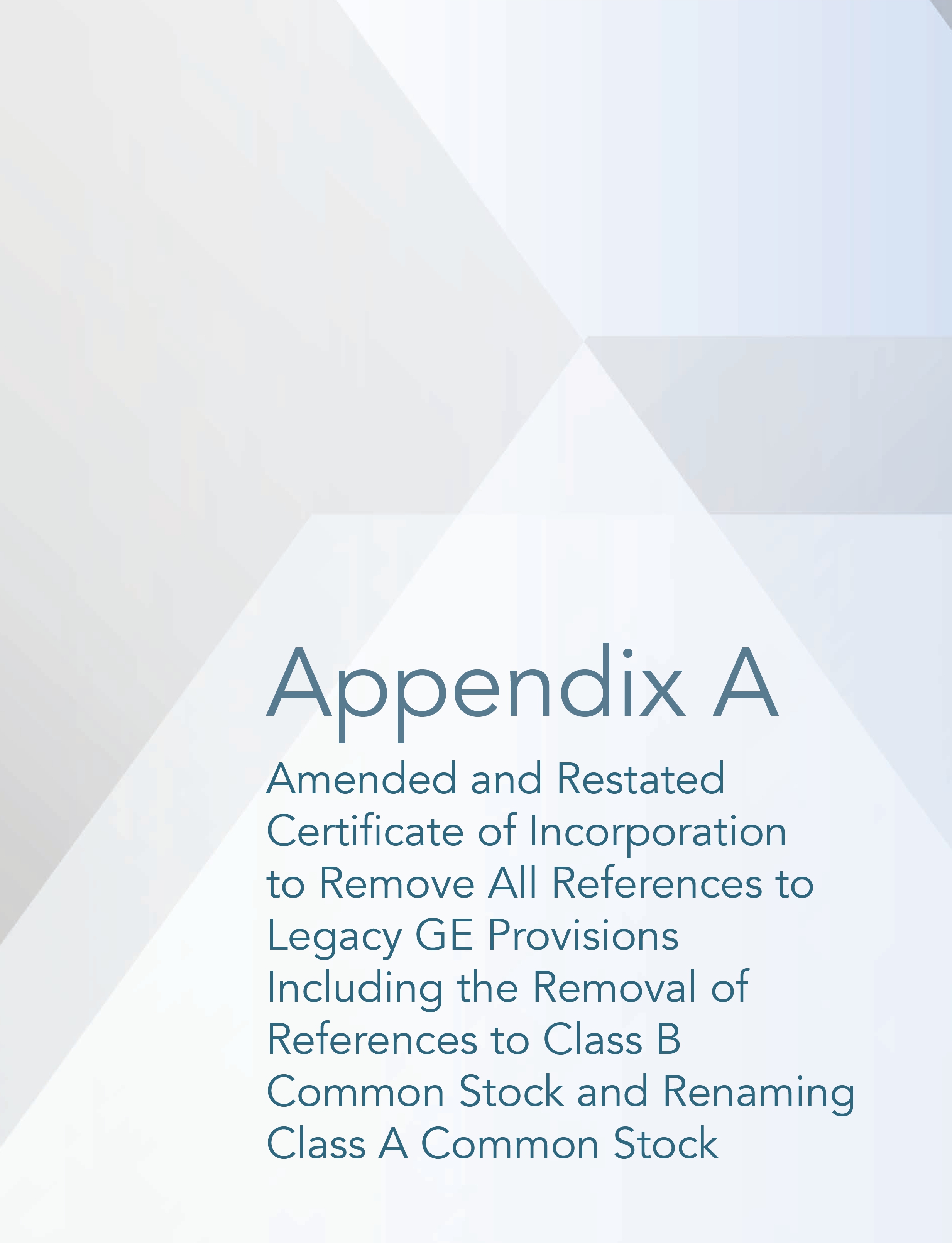
| Appendix A |
AMENDED AND RESTATED CERTIFICATE OF INCORPORATION
The present name of the corporation is Sub XLVIGenworth Financial, Inc. The corporation was incorporated under the name Sub XLVI, Inc. by the filing of its original certificate of incorporation with the Secretary of State of the State of Delaware on December 5, 2012. This amended and restated certificate of incorporation of the corporation (the “Certificate of Incorporation”), which both restates and further amends the provisions of the corporation’s certificate of incorporation, was duly adopted by the Board of Directors and the stockholders of the corporation in accordance with the provisions of Sections 242 and 245 (and with respect to the sole stockholder of the corporation, Section 228) of the General Corporation Law of the State of Delaware. The certificate of incorporation Certificate of Incorporation of the corporation is hereby amended and restated to read in its entirety as follows:
ARTICLE I
NAME
The name of the corporation (hereinafter referred to as the “Corporation”) is Genworth Financial, Inc.
ARTICLE II
REGISTERED OFFICE AND AGENT
The address of the Corporation’s registered office in the State of Delaware is 2711 Centerville Road, Suite 400251 Little Falls Drive, City of Wilmington, County of New Castle, Delaware 19808. The name of the Corporation’s registered agent at such address is Corporation Service Company.
ARTICLE III
PURPOSE
The purpose of the Corporation shall be to engage in any lawful act or activity for which corporations may be incorporated under the General Corporation Law of the State of Delaware, as from time to time in effect (the “DGCL”).
ARTICLE IV
CAPITAL STOCK
Section 1. Authorized Capital Stock.
(a) The total number of shares of stock that the Corporation shall have authority to issue is two one billion three six hundred million (2,300,000,0001,600,000,000) shares, consisting of: (1) one billion five hundred million (1,500,000,000) shares of Class A Common Stock, par value $.001 per share (the “Class A Common Stock”); (2) seven hundred million (700,000,000) shares of Class B Common Stock, par value $.001 per share (the “Class B Common Stock” and together with the Class A Common Stock, the “Common Stock”); and (32) one hundred million (100,000,000) shares of Preferred Stock, par value $.001 per share (the “Preferred Stock”), issuable in one or more series as hereinafter provided.
(b) Effective upon the effectiveness of this Certificate of Incorporation under the DGCL (the “Effective Time”), the previously named “Class A Common Stock” shall be automatically renamed “Common Stock”. Each stock certificate that, immediately prior to the Effective Time, represented shares of Class A Common Stock shall, from and after the Effective Time, be deemed to represent an identical number of shares of Common Stock, until the same is surrendered to the Corporation for cancellation or exchange.
| 130 | Genworth Financial, Inc. |
| Appendix A |
(c) (b)The holders of the Class A Common Stock and the holders of the Class B Common Stock shall be entitled to vote on all matters upon which the holders of the Class A Common Stock and Class B Common Stock, respectively, are entitled to vote under law or under this Certificate of Incorporation. The holders of Class A Common Stock and Class B Common Stock shall be entitled to one (1) vote for each share of Class A Common Stock and Class B Common Stock held by such stockholder. Except as otherwise provided in this Certificate of Incorporation or as required by law, the holders of the Class A Common Stock and the holders of Class B Common Stock shall vote together as a single class.
Section 2. Designation of Preferred Stock Terms. The Preferred Stock may be issued from time to time in one or more series. The Board of Directors is hereby authorized to provide for the issuance of shares of Preferred Stock in series and, by filing a certificate pursuant to the DGCL (hereinafter referred to as a “Preferred Stock Designation”), to establish from time to time the number of shares to be included in each such series, and to fix the designation, powers, privileges, preferences and rights of the shares of each such series and the qualifications, limitations and restrictions thereof. The authority of the Board of Directors with respect to each series shall include, but not be limited to, determination of the following:
(a) the designation of the series, which may be by distinguishing number, letter or title;
(b) the number of shares of the series, which number the Board of Directors may thereafter (except where otherwise provided in the Preferred Stock Designation) increase or decrease (but not below the number of shares thereof then outstanding) in the manner permitted by law;
(c) the rights in respect of any dividends (or method of determining the dividends), if any, payable to the holders of the shares of such series, any conditions upon which such dividends shall be paid and the date or dates or the method for determining the date or dates upon which such dividends shall be payable;
(d) whether dividends, if any, shall be cumulative or noncumulative, and, in the case of shares of any series having cumulative dividend rights, the date or dates or method of determining the date or dates from which dividends on the shares of such series shall cumulate;
(e) if the shares of such series may be redeemed by the Corporation, the price or prices (or method of determining such price or prices) at which, the form of payment of such price or prices (which may be cash, property or rights, including securities of the Corporation or of another corporation or other entity) for which, the period or periods within which and the other terms and conditions upon which the shares of such series may be redeemed, in whole or in part, at the option of the Corporation or at the option of the holder or holders thereof or upon the happening of a specified event or events, if any, including the obligation, if any, of the Corporation to purchase or redeem shares of such series pursuant to a sinking fund or otherwise;
(f) the amount, if any, payable out of the assets of the Corporation to the holders of shares of the series in the event of any voluntary or involuntary liquidation, dissolution or winding up of the affairs of the Corporation;
(g) provisions, if any, for the conversion or exchange of the shares of such series, at any time or times, at the option of the holder or holders thereof or at the option of the Corporation or upon the happening of a specified event or events, into shares of any other class or classes or any other series of the same class of capital stock of the Corporation or into any other security of the Corporation, or into the stock or other securities of any other corporation or other entity, and the price or prices or rate or rates of conversion or exchange and any adjustments applicable thereto, and all other terms and conditions upon which such conversion or exchange may be made;
| 2024 Proxy Statement | 131 |
| Appendix A |
(h) restrictions on the issuance of shares of the same series or of any other class or series of capital stock of the Corporation, if any;
(i) the voting rights and powers, if any, of the holders of shares of the series; and
(j) such other powers, privileges, preferences and rights, and qualifications, limitations and restrictions thereof, as the Board of Directors shall determine.
Section 3. Rights of Class B Common Stock.
(a) The holder or holders of the Class B Common Stock shall have such voting powers as are set forth herein and as are permitted by the DGCL.
(b) In addition to any other vote required by law or by this Certificate of Incorporation, until the first date on which GE beneficially owns less than fifteen percent (15%) of the outstanding shares of Common Stock, the prior affirmative vote or written consent of the holders of a majority of the outstanding shares of the Class B Common Stock, voting or consenting separately as a class, shall be required to authorize the Corporation to adopt or implement any stockholder rights plan or similar takeover defense measure.
(c) Once GE’s beneficial ownership interest in the Corporation is reduced to less than ten percent (10%) of the outstanding shares of Common Stock, all outstanding shares of Class B Common Stock shall automatically, without any further act or deed on the part of this Corporation or any other person, be converted into shares of Class A Common Stock on a share- for-share basis. In the event of any automatic conversion of Class B Common Stock pursuant to this Article IV, Section 3(c), certificates formerly representing outstanding shares of Class B Common Stock will thereafter be deemed to represent a like number of shares of Class A Common Stock.
(i) Upon any conversion of shares of Class B Common Stock into shares of Class A Common Stock pursuant to this Article IV, Section 3(c) or Article IV, Section 3(d), no adjustment with respect to dividends shall be made; only those dividends shall be payable on the shares so converted as have been declared and are payable to holders of record of shares of Class B Common Stock as of a record date prior to the conversion date with respect to the shares so converted; and only those dividends shall be payable on shares of Class A Common Stock issued upon such conversion as have been declared and are payable to holders of record of shares of Class A Common Stock as of a record date after such conversion date.
(ii) Shares of the Class B Common Stock converted into shares of Class A Common Stock pursuant to this Article IV, Section 3(c) or Article IV, Section 3(d) shall be retired and the Corporation shall not be authorized to reissue such shares of Class B Common Stock.
(iii) Such number of shares of Class A Common Stock as may from time to time be required for such purpose shall be reserved for issuance upon conversion of outstanding shares of Class B Common Stock pursuant to this Article IV, Section 3(c) or Article IV, Section 3(d).
(d) The Class B Common Stock shall be beneficially owned only by GE and any purported sale, pledge, transfer, assignment or disposition of shares of Class B Common Stock to any Person other than GE shall result in the automatic conversion of such transferred shares of Class B Common Stock into shares of Class A Common Stock, effective immediately upon any such purported sale, pledge, transfer, assignment or disposition of shares of Class B Common Stock, provided that a pledge of shares of Class B Common Stock, prior to default thereunder, which does not grant to the pledgee the power to vote or direct the vote
| 132 | Genworth Financial, Inc. |
| Appendix A |
of the pledged securities or the power to dispose or direct the disposition of the pledged securities prior to a default, without any foreclosure or transfer of ownership shall not trigger the conversion of such Class B Common Stock.
(e) As promptly as practicable after the presentation and surrender for conversion, during usual business hours at any office or agency of the Corporation, of any certificate representing shares of Class B Common Stock that have been converted into shares of Class A Common Stock pursuant to Article IV, Section 3(c) or Article IV, Section 3(d) hereof, the Corporation shall issue and deliver at such office or agency, to or upon the written order of the holder thereof, a certificate for the number of shares of Class A Common Stock issuable upon such conversion. The issuance of certificates for shares of Class A Common Stock issuable upon the conversion of shares of Class B Common Stock by the registered holder thereof shall be made without charge to the converting holder for any tax imposed on the Corporation in respect to the issue thereof. The Corporation shall not, however, be required to pay any tax which may be payable with respect to any transfer involved in the issue and delivery of any certificate in a name other than that of the registered holder of the shares being converted, and the Corporation shall not be required to issue or deliver any such certificate unless and until the person requesting the issue thereof shall have paid to the Corporation the amount of such tax or has established to the satisfaction of the Corporation that such tax has been paid.
(f) In addition to any other vote required by law or by this Certificate of Incorporation, prior to the Operative Date, the prior affirmative vote or written consent of the holders of a majority of the outstanding shares of the Class B Common Stock, voting or consenting separately as a class, shall be required to authorize the Corporation to (and (in the case of clauses (ii), (iii), (iv), (v) and (vi) below) authorize or permit any Subsidiary to):
(i) consolidate or merge with or into any Person;
(ii) permit any Subsidiary to consolidate or merge with or into any Person (other than (1) a consolidation or merger of a Wholly Owned Subsidiary with or into a Wholly Owned Subsidiary or (2) in connection with a Permitted Acquisition);
(iii) directly or indirectly acquire Stock, Stock Equivalents or assets (including, without limitation, any business or operating unit) of any Person (other than the Corporation or its Wholly Owned Subsidiaries), in each case in a single transaction, or series of related transactions, involving consideration (whether in cash, securities, assets or otherwise, and including Indebtedness assumed by the Corporation or any of its Subsidiaries and Indebtedness of any entity so acquired) paid or delivered by the Corporation and its Subsidiaries in excess of $700 million (other than acquisitions of securities pursuant to portfolio investment decisions in the ordinary course of business and transactions to which the Corporation and one or more Wholly Owned Subsidiaries are the only parties or solely between Wholly Owned Subsidiaries);
(iv) directly or indirectly sell, convey, transfer, lease, or otherwise dispose of any of their respective assets (including Stock and Stock Equivalents) or any interest therein to any Person, or permit or suffer any other Person to acquire any interest in any of their respective assets (including Stock and Stock Equivalents or through reinsurance transactions), in each case in a single transaction, or series of related transactions, involving consideration (whether in cash, securities, assets or otherwise, and including Indebtedness assumed by any other Person and Indebtedness of any entity acquired by such other Person) paid to or received by the Corporation and its Subsidiaries in excess of $700 million (other than dispositions and transfers of securities pursuant to portfolio investment decisions in the ordinary course of business and transactions to which the Corporation and one or more Wholly Owned Subsidiaries are the only parties or solely between Wholly Owned Subsidiaries);
| 2024 Proxy Statement | 133 |
| Appendix A |
(v) directly or indirectly create, incur, assume, guarantee or otherwise be or become liable with respect to Indebtedness (including Indebtedness of any entity acquired by the Corporation or any of its Subsidiaries, whether or not such Indebtedness is expressly assumed or guaranteed by the Corporation or any of its Subsidiaries) (a) in excess of $700 million outstanding at any one time or (b) that would reasonably be expected to result in a Ratings Event, except in the case of each of clauses (a) and (b), (1) Existing Indebtedness and (2) Permitted Indebtedness;
(vi) issue any Stock or any Stock Equivalents, except (a) the issuance of shares of Class A Common Stock upon conversion of shares of Class B Common Stock pursuant to Sections 3(c) and 3(d) of this Article IV, (b) the issuance of shares of Stock of a Wholly Owned Subsidiary of the Corporation to the Corporation or another Wholly Owned Subsidiary of the Corporation, (c) pursuant to the Transactions, (d) the issuance of shares of Class A Common Stock, stock appreciation rights, options to purchase Class A Common Stock and other Stock-based or Stock-related awards, in each case pursuant to employee benefit plans or dividend reinvestment plans approved by the Board of Directors, and (e) by a Securitization Subsidiary in a Securitization Transaction;
(vii) dissolve, liquidate or wind up the Corporation; or
(viii) alter, amend, terminate or repeal, or adopt any provision inconsistent with, in each case whether directly or indirectly, or by merger, consolidation or otherwise, Articles IV, V, VI, VII, VIII, IX and X of this Certificate of Incorporation or Articles II, III and IV of the Corporation’s Bylaws.
Section 3. Section 4.Dividends.
(a) Subject to provisions of law and the preferences of any series of Preferred Stock and of any other stock ranking prior to the Class A Common Stock or the Class B Common Stock as to the payment of dividends, the holders of the Class A Common Stock and the Class B Common Stock shall be entitled to receive dividends at such time and in such amounts as may be determined by the Board and declared out of any funds lawfully available therefor, and shares of Preferred Stock of any series shall not be entitled to share therein except as otherwise expressly provided in the resolution or resolutions of the Board providing for the issue of such series.this Certificate of Incorporation (including any Preferred Stock Designation).
(b) If and when dividends on the Class A Common Stock and the Class B Common Stock are declared payable from time to time by the Board as provided in this Article IV, Section 4, whether payable in cash, in property or in shares of stock of the Corporation, the holders of Class A Common Stock and the holders of the Class B Common Stock shall be entitled to share equally, on a per share basis, in such dividends, subject to the limitations described below. Except for dividends permitted by Article IV, Section 4(c), if dividends are declared that are payable in shares of Class A Common Stock or Class B Common Stock, such dividends shall be payable at the same rate on all series of Common Stock and the dividends payable in shares of Class A Common Stock shall be payable only to holders of Class A Common Stock and the dividends payable in shares of Class B Common Stock shall be payable only to holders of Class B Common Stock. If the Corporation shall in any manner subdivide or combine the outstanding shares of Class A Common Stock or Class B Common Stock, the outstanding shares of the other such class of Common Stock shall be proportionally subdivided or combined in the same manner and on the same basis as the outstanding shares of Class A Common Stock or Class B Common Stock, as the case may be, which have been subdivided or combined.
(c) Except with respect to the Class B Common Stock, if no shares of a particular class of Common Stock are outstanding, the Board may declare and distribute a stock dividend payable in shares of that class to the holders of any other class or series of stock then outstanding.
| 134 | Genworth Financial, Inc. |
| Appendix A |
Section 5. For purposes of this Article IV and Articles VI, VII, IX and X:
(a) “beneficially own” shall have the meaning set forth in Rule 13d-3 of the Securities Exchange Act of 1934, as amended through the date hereof, but shall not include shares of Common Stock beneficially owned by GE but not for its own account, including (in such exclusion) shares of Common Stock owned by the GE Pension Trust and beneficial ownership which arises by virtue of some entity that is an affiliate of GE being a sponsor or advisor of a mutual or similar fund that beneficially owns shares of Common Stock;
(b) “Excluded Transactions” means (i) guarantees by the Corporation or its Subsidiaries of derivatives of Subsidiaries of the Corporation, (ii) obligations on drawings under commission funding vehicles to be repaid in full by premiums due to the Corporation and its Subsidiaries and guarantees of such repayment by the Corporation and its Subsidiaries, (iii) securities lending by the Corporation and its Subsidiaries where proceeds received are held in investment grade securities during the term of the transaction, (iv) funding agreements and guaranteed investment contracts issued in the ordinary course of business by a Subsidiary of the Corporation that is a regulated life insurance company, (v) repurchase agreements of the Corporation and its Subsidiaries involving investment grade securities, (vi) guarantees given to states or insurance regulatory authorities thereof in connection with the licensing of the business of the Corporation or any Subsidiary in such jurisdiction, (vii) surplus notes issued from time to time by one or more Wholly Owned Subsidiaries which are special purpose captive reinsurance companies provided that (x) such surplus notes create recourse funding obligations solely to the issuer of such notes and (y) the structure pursuant to which such notes are issued has been approved by applicable insurance regulatory authorities, and (viii) indebtedness (other than any Permitted Securitization Guaranty) between the Corporation and any Wholly Owned Subsidiary or between any two Wholly Owned Subsidiaries (but only to the extent such indebtedness does not increase the consolidated indebtedness of the Corporation and its Subsidiaries in accordance with United States generally accepted accounting principles);
(c) “Existing Indebtedness” means Indebtedness under (1) Yen 60 billion aggregate amount of 1.6% notes due 2011 being assumed by the Corporation in the Reorganization, (2) the Short-term Intercompany Note, dated May 24, 2004 (the “Intercompany Note”), from the Corporation to GEFAHI in the aggregate principal amount of $2.4 billion, (3) the Subordinated Contingent Promissory Note, dated May 24, 2004, from the Corporation to GEFAHI in the aggregate principal of $550 million, and (4) the senior notes due 2009 included in the Equity Units to be issued by the Corporation as part of the Transactions (the principal amount of such senior notes not to exceed $600 million), and, in the case of such senior notes, Indebtedness under any Permitted Refinancing related thereto;
(d) “GE” means General Electric Company, a New York corporation, all successors to General Electric Company by way of merger, consolidation or sale of all or substantially all of its assets, and all corporations, limited liability companies, joint ventures, partnerships, trusts, associations and other entities in which General Electric Company: (1) beneficially owns, either directly or indirectly, more than fifty percent (50%) of (i) the total combined voting power of all classes of voting securities of such entity, (ii) the total combined equity interests, or (iii) the capital or profit interests, in the case of a partnership; or (2) otherwise has the power to vote, either directly or indirectly, sufficient securities to elect a majority of the board of directors or similar governing body, but shall not include the Corporation or any Subsidiary of the Corporation;
(e) “Indebtedness” means, with respect to any Person, any liability of such Person in respect of borrowed money or evidenced by bonds, notes, debentures or similar instruments and shall also include (1) any capitalized lease obligations of such Person (if and to the extent the same would appear on a balance sheet of such Person prepared in accordance with United States generally accepted accounting principles), (2) all Indebtedness of others secured by (or for which the holder of such Indebtedness has an existing right,
| 2024 Proxy Statement | 135 |
| Appendix A |
contingent or otherwise, to be secured by) any lien or security interest in or pledge of property owned or acquired by such Person, whether or not the Indebtedness secured thereby is expressly assumed or guaranteed by such Person, and (3) any liability (contingent or otherwise) of such Person under any Permitted Securitization Guaranty, but excluding the aggregate net amount of Indebtedness of (i) the Corporation or any Subsidiary pursuant to Standard Securitization Undertakings and (ii) any Securitization Subsidiary in a Securitization Transaction, in either case, relating to the sale, contribution or other conveyance of financial assets pursuant to a Securitization Transaction, regardless whether such transaction is effected in a manner that would not be reflected as indebtedness on a balance sheet in accordance with United States generally accepted accounting principles; provided, that the liabilities of the Company and its Subsidiaries under Excluded Transactions shall not constitute Indebtedness;
(f) “Initial Public Offering” means the initial public offering of Class A Common Stock as contemplated by the Corporation’s Registration Statement on Form S-1 (No. 333-112009);
(g) “Operative Date” means the first date following the Initial Public Offering on which GE ceases to beneficially own twenty percent (20%) or more of the outstanding shares of Common Stock;
(h) “Permitted Indebtedness” means (1) Indebtedness under (i) the $1.0 billion five-year revolving credit facility entered into by the Corporation on April 30,2004 with a syndicate of banks (the “Five-year Credit Facility”), (ii) the $1.0 billion 364-day revolving credit facility entered into by the Corporation on May 24, 2004 with a syndicate of banks (the “364-Day Credit Facility” and, collectively with the Five-year Credit Facility, the “Credit Facilities”), and (iii) the commercial paper program to be established by the Corporation after completion of the Initial Public Offering (the aggregate principal amount of Indebtedness under this clause (1) (excluding Indebtedness under the Credit Facilities described in clause (2) of this definition) not to exceed $500 million outstanding at any one time), (2) Indebtedness under the Credit Facilities incurred to fund (i) liabilities of the Corporation and its Subsidiaries under funding agreements or guaranteed investment contracts issued in the ordinary course of business by Subsidiaries of the Corporation that are regulated life insurance companies or (ii) cash payments by the Corporation and its Subsidiaries in connection with insurance policy surrenders and withdrawals in the ordinary course of business, (3) Indebtedness under the $2.4 billion 180-day bridge loan facility to be entered into by the Corporation with a syndicate of banks (the “Short-term Facility”), to the extent the proceeds thereof are used to repay the Intercompany Note, and (4) Indebtedness of up to $1.9 billion aggregate principal amount in senior notes in one or more tranches pursuant to an offering to be made following completion of the Initial Public Offering (collectively, the “Post-IPO Senior Notes”), to the extent the proceeds thereof are used to repay the Short-term Facility and, in the case of each of the Credit Facilities and the Post-IPO Senior Notes, Indebtedness under any Permitted Refinancing related thereto;
(i) “Permitted Refinancing” means any Indebtedness of the Corporation issued in exchange for, or the net proceeds of which are used to extend, refinance, renew, replace, defease or refund the Indebtedness under the Credit Facilities, the Post-IPO Senior Notes or the senior notes referred to in clause (4) of the definition of Existing Indebtedness, in each case in a principal amount (or accreted value, if applicable) that does not exceed the principal amount of the Indebtedness extended, refinanced, renewed, replaced, defeased or refunded (plus, in each case, all accrued interest on the Indebtedness and the amount of all fees and expenses, including, without limitation, premiums, incurred in connection therewith);
(j) “Person” means any individual, corporation, partnership, joint venture, limited liability company, association or other business entity and any trust, unincorporated organization or government or any agency or political subdivision thereof;
| 136 | Genworth Financial, Inc. |
| Appendix A |
(k) “Permitted Acquisition” means any acquisition by the Corporation or any of its Subsidiaries of Stock, Stock Equivalents or assets of any Person not requiring the prior affirmative vote or written consent of the holders of the Class B Common Stock pursuant to Section 3, clause (f)(iii) above;
(l) “Permitted Securitization Guaranty” means an obligation (other than pursuant to Standard Securitization Undertakings), contingent or otherwise, of any Person to assure in any manner (1) any Securitization Subsidiary, any investor in securities issued in a Securitization Transaction, or any credit support provider for any Securitization Transaction against loss in connection with such Securitization Transaction or (2) the performance or collection of any Securitization Assets;
(m) “Ratings Event” means a downgrading, suspension or withdrawal of, or notice being given of any potential or intended downgrading, suspension or withdrawal of, or any review for a possible negative change in, any rating of the Corporation or any Subsidiary, any Indebtedness of the Corporation or any Subsidiary or any securities of the Corporation or any Subsidiary (including, without limitation, the placing of any of the foregoing ratings on credit watch with negative or developing implications or under review with an uncertain direction) by any “nationally recognized statistical rating organization” (as such term is defined for purposes of Rule 436(g)(2) under the Securities Act of 1933);
(n) “Reorganization” means the restructuring transactions of the Corporation entered into at or prior to the Initial Public Offering between the Corporation and its Subsidiaries, on the one hand, and GE (other than the Corporation and its Subsidiaries), on the other hand, as contemplated by the Master Agreement, dated May 24, 2004, by and among General Electric Company, General Electric Capital Corporation, GEI, Inc., GEFAHI and the Corporation, as amended from time to time;
(o) “Securitization Assets” has the meaning specified in the definition of “Securitization Transaction;”
(p) “Securitization Subsidiary” means any Subsidiary that engages in no activities other than those reasonably related to or in connection with the entering into of Securitization Transactions and that is designated by the Board of Directors of the Corporation as a Securitization Subsidiary;
(q) “Securitization Transaction” means any transaction or series of transactions that have been or may be entered into by the Corporation or any of its Subsidiaries pursuant to which such entity may sell, convey, grant a security interest or otherwise transfer to (x) a Securitization Subsidiary (in the case of a transfer by the Corporation or any Subsidiary) or(y) to any Person (in the case of a transfer by a Securitization Subsidiary) any financial assets, whether then existing or arising in the future including, without limitation, installment receivables, credit card receivables, lease receivables, mortgage loan receivables, policyholder loan receivables, premiums, debt obligations or any other type of secured or unsecured financial assets or rights to future payments of any kind or interests therein (the “Securitization Assets”), and any assets related thereto, including without limitation, all security interests in merchandise or services financed thereby, the proceeds of such Securitization Assets, and other assets which are customarily sold or in respect of which security interests are customarily granted in connection with securitization transactions involving such assets; provided that (i) in connection with such transaction, the Corporation (and each other transferring Subsidiary) shall have received a legal opinion of outside counsel that (x) the conveyance of the Securitization Assets from the Corporation (and/or the applicable Subsidiary) to the Securitization Subsidiary shall be treated as a true sale or true conveyance of such Securitization Assets and not as the granting of a security interest or pledge in respect of the Securitization Assets as collateral for a loan and (y) such Securitization Subsidiary would not be substantively consolidated into the bankruptcy of the Corporation or any Subsidiary of the Corporation involved in the transaction; (ii) no portion of the debt or other obligations in respect of such transaction shall be recourse to, or guaranteed by, the Corporation or any Subsidiary (other than a Securitization Subsidiary) in any way other than pursuant to Standard Securitization Undertakings and any Permitted Securitization
| 2024 Proxy Statement | 137 |
| Appendix A |
Guaranty, and (iii) the entering into and performance of such transaction would not reasonably be expected to result in a Ratings Event;
(r) “Standard Securitization Undertakings” means representations, warranties, covenants and indemnities provided by the Corporation or any Subsidiary in connection with a Securitization Transaction which are reasonably customary in similar securitization transactions;
(s) “Stock” means shares of capital stock (whether denominated as common stock or preferred stock), beneficial, partnership or membership interests, participations or other equivalents (regardless of how designated) of or in a corporation, partnership, limited liability company or business trust, whether voting or nonvoting;
(t) “Stock Equivalents” means all securities convertible into or exchangeable for Stock and all warrants, options or other rights to purchase or subscribe for any Stock, whether or not presently convertible, exchangeable or exercisable, and all voting debt;
(u) “Subsidiary” means, with respect to the Corporation, any corporation, limited liability company, joint venture or partnership of which the Corporation (1) beneficially owns, either directly or indirectly, more than fifty percent (50%) of (i) the total combined voting power of all classes of voting securities of such entity, (ii) the total combined equity interests of such entity, or (iii) the capital or profit interests, in the case of a partnership; or (2) otherwise has the power to vote, either directly or indirectly, sufficient securities to elect a majority of the board of directors or similar governing body;
(v) “Transactions” means (1) the Reorganization, (2) the Initial Public Offering, (3) the issuance by the Corporation of $600 million aggregate amount of the Corporation’s Equity Units and the issuance and sale by the Corporation of shares of Common Stock in accordance with the terms of such Equity Units and (4) the issuance by the Corporation of $100 million of its Series A Cumulative Preferred Stock; and
(w) “Wholly Owned Subsidiary” means each Subsidiary in which the Corporation owns (directly or indirectly) all of the outstanding voting Stock, voting power, partnership interests or similar ownership interests, except for director’s qualifying shares in nominal amount.
ARTICLE V
BYLAWS
Bylaws for the Corporation may be adopted, amended, altered or repealed consistent with law and subject to the provisions of this Certificate of Incorporation (including any Preferred Stock Designation), and, once adopted, any Bylaw may be altered and repealed: (i) by the affirmative vote of the holders of a majority of the voting power of the capital stock issued and outstanding and entitled to vote thereon; or (ii) by the affirmative vote of a majority of the total number of directors which the Corporation would have if there were no vacancies on the Board of Directors (the “Whole Board”); provided, however, that any adoption, amendment, alteration or repeal of the Bylaws by action of the Board of Directors shall require the affirmative vote of a greater number of the directors if so provided by the Bylaws.
ARTICLE VI
STOCKHOLDER ACTION
Section 1. Action by Consent In Lieu of a Meeting. Except for actions taken by written consent by the holders of the Class B Common Stock consenting separately as a class or as otherwise provided pursuant to provisions of this Certificate of Incorporation (including any Preferred Stock Designation) fixing the powers, privileges or rights of any class or series of stock other than the Common
| 138 | Genworth Financial, Inc. |
| Appendix A |
Preferred Stock, any action required or permitted to be taken by the stockholders of the Corporation must be effected at a duly called annual or special meeting of such holders and may not be effected by any consent in writing by such holders.
Section 2. Special Meetings. Prior to the Operative Date, except as required by law and subject to the rights of the holders of any class or series of stock having a preference over the Common Stock as to the payment of dividends or distributions upon liquidation, special meetings of stockholders of the Corporation of any class or series for any purpose or purposes may be called only (i) by the Board of Directors pursuant to a resolution stating the purpose or purposes thereof approved by a majority of the Whole Board or (ii) upon the written request of the holders of a majority of the Class B Common Stock filed with the Secretary of the Corporation. Effective upon and commencing as of the Operative Date, except Except as required by law and subject to the rights of the holders of any class or series of stock having a preference over the Common Stock as to the payment of dividends or distributions upon liquidation, special meetings of stockholders of the Corporation of any class or series for any purpose or purposes may be called only (x) by the Board of Directors pursuant to a resolution stating the purpose or purposes thereof approved by a majority of the Whole Board or (y) upon the written request of the holders of at least forty [forty/twenty-five]1 percent (40 [40/25]1 %) of the outstanding shares of Common Stock filed with the Secretary of the Corporation.
Section 3. Stockholder Nomination of Director Candidates and Other Stockholder Proposals. Advance notice of stockholder nominations for the election of directors and of the proposal by stockholders of any other action to be taken by the stockholders shall be given in such manner as shall be provided in the Bylaws of the Corporation.
ARTICLE VII
BOARD OF DIRECTORS
Section 1. Number of Directors. Until the first date on which GE shall beneficially own fifty percent (50%) or less of the outstanding shares of Common Stock, the number of directors authorized to be elected by the holders of the Common Stock of the Corporation shall be nine (9). Beginning on the first date on which GE shall beneficially own fifty percent (50%) or less but at least ten percent (10%) of the outstanding shares of Common Stock, the number of directors authorized to be elected by the holders of Common Stock of the Corporation shall be eleven (11). Beginning on the first date on which GE shall beneficially own less than ten percent (10%) of the outstanding shares of Common Stock, the The number of directors of the Corporation authorized to be elected by the holders of Common Stock of the Corporation shall be not less than one (1) nor more than fifteen (15). The exact number of directors constituting the entire Board of Directors shall be fixed, subject to the provisions of this Certificate of Incorporation, from time to time by resolution of the Board of Directors or by a nominating committee appointed by the Board of Directors.
Section 2. Election of Members to the Board. Except as provided in Article VII, Section 7, the right to elect persons to the Board of Directors shall be allocated as follows:
(a) At any time when GE shall beneficially own more than fifty percent (50%) of the outstanding shares of Common Stock, at any election of members of the Board of Directors: (i) the holders of the Class B
1 If the proposal to adopt this Certificate of Incorporation (the “A&R Proposal”) is approved by stockholders, but the Special Meeting Proposal is not approved by stockholders, this number shall be forty (40). If both the A&R Proposal and the Special Meeting Proposal are approved by stockholders, this number shall be twenty-five (25). In either case, each number shall, together with the remaining provisions of this Certificate of Incorporation not appearing in brackets, constitute a separate amended and restated certificate of incorporation being approved and adopted by the board and stockholders in accordance with Sections 242 and 245 of the DGCL with each such form of the amended and restated certificate of incorporation (other than the Certificate of Incorporation, if any, that is filed with the Secretary of State of the State of Delaware) to be abandoned immediately prior to the filing of the Certificate of Incorporation. “Special Meeting Proposal” is defined in the proxy statement for the annual meeting of stockholders at which stockholders will vote on each proposal.
| 2024 Proxy Statement | 139 |
| Appendix A |
Common Stock, voting separately as a class, shall be entitled to elect five (5) directors; and (ii) the holders of the Class A Common Stock, voting separately as a class, shall be entitled to elect four (4) directors;
(b) At any time when GE shall beneficially own at least thirty-three percent (33%) but not more than fifty percent (50%) of the outstanding shares of Common Stock, at any election of members of the Board of Directors: (i) the holders of the Class B Common Stock, voting separately as a class, shall be entitled to elect four (4) directors; (ii) the holders of the Class A Common Stock, voting separately as a class, shall be entitled to elect five (5) directors; and (iii) the holders of the Class B Common Stock and the holders of the Class A Common Stock, voting together as a single class, shall be entitled to elect the remaining number of directors to be elected at such election by the holders of Common Stock;
(c) At any time when GE shall beneficially own at least twenty percent (20%) but less than thirty-three percent (33%) of the outstanding shares of Common Stock, at any election of members of the Board of Directors: (i) the holders of the Class B Common Stock, voting separately as a class, shall be entitled to elect three (3) directors; (ii) the holders of the Class A Common Stock, voting separately as a class, shall be entitled to elect five (5) directors; and (iii) the holders of the Class B Common Stock and the holders of the Class A Common Stock, voting together as a single class, shall be entitled to elect the remaining number of directors to be elected at such election by the holders of Common Stock;
(d) At any time when GE shall beneficially own at least ten percent (10%) and less than twenty percent (20%) of the outstanding shares of Common Stock, at any election of members of the Board of Directors: (i) the holders of the Class B Common Stock, voting separately as a class, shall be entitled to elect one (1) director; (ii) the holders of the Class A Common Stock, voting separately as a class, shall be entitled to elect five (5) directors; and (iii) the holders of the Class B Common Stock and the holders of the Class A Common Stock, voting together as a single class, shall be entitled to elect the remaining number of directors to be elected at such election by the holders of Common Stock; and
(e) At any time when GE shall beneficially own less than ten percent (10%) of the outstanding shares of Common Stock, the holders of the Class A Common Stock shall be entitled to elect all of the directors to be elected at such election by the holders of Common Stock. Concurrently with any conversion of all of the outstanding shares of Class B Common Stock into shares of Class A Common Stock in accordance with Article IV, Sections 3(c) and 3(d) of this Certificate of Incorporation, the former holders of the Class B Common Stock shall cease to have the absolute right to designate or cause the election or maintenance of any directors of the Corporation.
Section 2. Section 3.Annual Meetings. Elections of members of the Board of Directors shall be held annually at the annual meeting of stockholders and each member of the Board of Directors shall hold office until such director’s successor is elected and qualified, subject to such director’s earlier death, resignation, disqualification or removal.
Section 3. Section 4.Written Ballot Not Required. Unless and except to the extent that the Bylaws of the Corporation shall so require, the election of directors of the Corporation need not be by written ballot.
Section 4. Section 5.Resignation; Removal. Any director may resign at any time upon written notice or notice by electronic transmission to the attention of the Secretary of the Corporation. Any director may be removed from office with or without cause by the affirmative vote of a majority in voting power of the outstanding shares of Common Stock (and any series of Preferred Stock then entitled to vote at an election of directors), voting together as a single class.
| 140 | Genworth Financial, Inc. |
| Appendix A |
(a) Removal for Cause. Any director may be removed from office for cause by the affirmative vote of a majority of the outstanding shares of Common Stock (and any series of Preferred Stock then entitled to vote at an election of directors), voting together as a single class.
(b) Class B Common Stock Director Removal Without Cause. Any director elected by the vote of the holders of the Class B Common Stock voting separately as a class may be removed from office at any time, without cause, solely by the affirmative vote of the holders of a majority of the outstanding shares of the Class B Common Stock, voting as a separate class.
(c) Class A Common Stock Director Removal Without Cause. Any director elected by the vote of the holders of the Class A Common Stock voting together as a single class, may be removed from office at any time, without cause, solely by the affirmative vote of a majority of the outstanding shares of Class A Common Stock, voting together as a single class.
(d) Common Stock Removal Without Cause. Any director elected by the vote of the holders of the Class A Common Stock and Class B Common Stock voting together as a single class, may be removed from office at any time, without cause, solely by the affirmative vote of a majority of the outstanding shares of Class A Common Stock and Class B Common Stock, voting together as a single class.
Section 6. Vacancies.
(a) Prior to consummation of the Initial Public Offering, the Board of Directors shall, by majority vote, have the power to designate (i) which of its members are deemed to have been elected by the holders of the Class A Common Stock, (ii) which of its members are deemed to have been elected by the holders of the Class B Common Stock and (iii) which class of directors shall have the right to fill any vacancies on the Board of Directors that exist upon the filing of this Certificate of Incorporation.
(b) At any time when GE shall beneficially own at least ten percent (10%) of the outstanding shares of Common Stock, vacancies in the Board of Directors resulting from an enlargement of the Board of Directors from nine (9) directors to eleven (11) directors pursuant to Article VII, Section 1, shall be filled in the following manner:
(i) the first such vacancy shall be filled only by the vote of a majority of the directors elected by the holders of the Class A Common Stock, and the director elected to fill such vacancy shall be deemed to have been elected by the holders of the Class A Common Stock; and
(ii) the second such vacancy shall be filled only by the vote of a majority of the directors elected by the holders of the Class A Common Stock and the Class B Common Stock, voting together as a single class, and the director elected to fill such vacancy shall be deemed to have been elected by the holders of the Class A Common Stock and the Class B Common Stock voting together as a single class;
provided, however, that any vacancy in the Board of Directors existing prior to the enlargement of the Board of Directors pursuant to Article VII, Section 1 shall be filled prior to the filling of the vacancies resulting from the enlargement of the Board of Directors.
Section 5. (c)At any time when GE shall beneficially own at least ten percent (10%) of the outstanding shares of Common Stock, any vacancy in the Board of Directors of a director elected by the holders of Class B Common Stock, voting as a separate class, pursuant to Section 2 of this Article VII, shall be filled only by the vote of a majority of the remaining directors so elected by the Class B Common Stock or, if there are none, by a vote of the holders of Class B Common Stock, voting as a separate class. Any vacancy in the Board of Directors of a director elected by the holders of the Class A Common Stock, voting
| 2024 Proxy Statement | 141 |
| Appendix A |
as a separate class, pursuant to Section 2 of this Article VII, shall be filled only by the vote of the remaining directors elected by the holders of the Class A Common Stock, or if there are none, by a vote of the holders of the Class A Common Stock, voting as a separate class. Any vacancy in the Board of Directors of a director elected by the holders of the Class A Common Stock and the Class B Common Stock, voting together as a single class, pursuant to Section 2 of this Article VII, shall be filled only by the vote of the remaining directors so elected by the holders of the Class A Common Stock and the Class B Common Stock voting together as a single class, or if there are none, by a vote of the holders of the Class A Common Stock and the Class B Common Stock voting together as a single class. Subject to Article VII, Section 6(a) of this Certificate of Incorporation, any other Vacancies. Any vacancy in the Board of Directors, including a vacancy resulting from an enlargement of the Board of Directors, shall be filled only by a vote of a majority of the directors then in office, although less than a quorum, or by a sole remaining director.
Section 6. Section 7.Preferred Stock. Subject to the provisions of this Certificate of Incorporation, during any period when the holders of any series of Preferred Stock have the right to elect additional directors as provided for or fixed pursuant to the provisions of Article IV hereof, then upon commencement and for the duration of the period during which such right continues: (i) the then otherwise total authorized number of directors of the Corporation shall automatically be increased by such specified number of directors, and the holders of such Preferred Stock shall be entitled to elect the additional directors so provided for or fixed pursuant to said provisions, (ii) each such additional director shall serve until such director’s successor shall have been duly elected and qualified, or until such director’s right to hold such office terminates pursuant to said provisions, whichever occurs earlier, subject to his or her earlier death, disqualification, resignation or removal and (iii) any vacancies in such directorships shall be filled in accordance with the applicable Preferred Stock Designation. Except as otherwise provided by the Board in the resolution or resolutions establishing such seriesin this Certificate of Incorporation, including any Preferred Stock Designation, whenever the holders of any series of Preferred Stock having such right to elect additional directors are divested of such right pursuant to the provisions of such stock, the terms of office of all such additional directors elected by the holders of such stock, or elected to fill any vacancies resulting from the death, resignation, disqualification or removal of such additional directors, shall forthwith terminate and the total and authorized number of directors of the Corporation shall be reduced accordingly.
Section 8. Executive Committee. Prior to the Operative Date, the Board of Directors shall not have the power to establish an executive committee or any other committee having authority typically reserved for an executive committee.
ARTICLE VIII
LIMITATIONS ON LIABILITY OF AND
INDEMNIFICATION OF DIRECTORS AND OFFICERS
Section 1. Limited Liability. A No director of this Corporation shall not be liable to the Corporation or its stockholders for monetary damages for breach of fiduciary duty as a director, except to the extent such exemption from liability or limitation thereof is not permitted under the DGCL as the same exists or may hereafter be amended. Any repeal or modification of the foregoing paragraph shall not adversely affect any right or protection of a director of the Corporation existing hereunder with respect to any act or omission occurring prior to such repeal or modification.
Section 2. Right to Indemnification. The Corporation shall indemnify and hold harmless, to the fullest extent permitted by applicable law as it presently exists or may hereafter be amended, any person (a “Covered Person”) who was or is made or is threatened to be made a party or is otherwise involved in any action, suit or proceeding, whether civil, criminal, administrative or investigative (a “proceeding”), by reason of the fact that he or she, or a person for whom he or she is the legal representative, is or was a
| 142 | Genworth Financial, Inc. |
| Appendix A |
director or officer of the Corporation, or has or had agreed to become a director of the Corporation, or, while a director or officer of the Corporation, is or was serving at the request of the Corporation as a director, officer, employee or agent of another corporation or of a limited liability company, partnership, joint venture, trust, enterprise or nonprofit entity, including service with respect to employee benefit plans, against all liability and loss suffered and expenses (including attorneys’ fees) reasonably incurred by such Covered Person. Notwithstanding the preceding sentence, except as otherwise provided in Section 4 of this Article VIII, the Corporation shall be required to indemnify a Covered Person in connection with a proceeding (or part thereof) commenced by such Covered Person only if the commencement of such proceeding (or part thereof) by the Covered Person was authorized in the specific case by the Board of Directors.
Section 3. Prepayment of Expenses. The Corporation shall to the fullest extent not prohibited by applicable law pay the expenses (including attorneys’ fees) incurred by a Covered Person in defending any proceeding in advance of its final disposition, provided, however, that, to the extent required by law, such payment of expenses in advance of the final disposition of the proceeding shall be made only upon receipt of an undertaking by the Covered Person to repay all amounts advanced if it should be ultimately determined that the Covered Person is not entitled to be indemnified under this Article VIII or otherwise.
Section 4. Claims. If a claim for indemnification (following the final disposition of such action, suit or proceeding) or advancement of expenses under this Article VIII is not paid in full within thirty days after a written claim therefor by the Covered Person has been received by the Corporation, the Covered Person may file suit to recover the unpaid amount of such claim and, if successful in whole or in part, shall be entitled to be paid the expense of prosecuting such claim. In any such action the Corporation shall have the burden of proving that the Covered Person is not entitled to the requested indemnification or advancement of expenses under applicable law.
Section 5. Nonexclusivity of Rights. The rights conferred on any Covered Person by this Article VIII shall not be exclusive of any other rights which such Covered Person may have or hereafter acquire under any statute, provision of this Certificate of Incorporation, the Bylaws of the Corporation, agreement, vote of stockholders or disinterested directors or otherwise.
Section 6. Other Sources. The Corporation’s obligation, if any, to indemnify or to advance expenses to any Covered Person who was or is serving at its request as a director, officer, employee or agent of another corporation, limited liability company, partnership, joint venture, trust, enterprise or nonprofit entity shall be reduced by any amount such Covered Person is entitled to collect and is collectible as indemnification or advancement of expenses from such other corporation, limited liability company, partnership, joint venture, trust, enterprise or non-profit enterprise.
Section 7. Amendment or Repeal. Any repeal or modification of the foregoing provisions of this Article VIII shall not adversely affect any right or protection hereunder of any Covered Person in respect of any act or omission occurring prior to the time of such repeal or modification.
Section 8. Other Indemnification and Prepayment of Expenses. This Article VIII shall not limit the right of the Corporation, to the extent and in the manner permitted by law, to indemnify and to advance expenses to persons other than Covered Persons when and as authorized by appropriate corporate action.
ARTICLE IX
CORPORATE OPPORTUNITIES AND CONFLICTS OF INTEREST
Section 1. General. In recognition and anticipation (i) that the Corporation will not be a wholly owned subsidiary of GE and that GE will be a significant stockholder of the Corporation, (ii) that directors, officers and/or employees of GE may serve as directors and/or officers of the Corporation, (iii) that GE may
| 2024 Proxy Statement | 143 |
| Appendix A |
engage and are expected to continue to engage in the same, similar or related lines of business as those in which the Corporation, directly or indirectly, may engage and/or other business activities that overlap with or compete with those in which the Corporation, directly or indirectly, may engage, (iv) that GE may have an interest in the same areas of corporate opportunity as the Corporation and Affiliated Companies thereof, and (v) that, as a consequence of the foregoing, it is in the best interests of the Corporation that the respective rights and duties of the Corporation and of GE, and the duties of any directors or officers of the Corporation who are also directors, officers or employees of GE, be determined and delineated in respect of any transactions between, or opportunities that may be suitable for both, the Corporation and Affiliated Companies thereof, on the one hand, and GE, on the other hand, the provisions of this Article IX shall to the fullest extent permitted by law regulate and define the conduct of certain of the business and affairs of the Corporation in relation to GE and the conduct of certain affairs of the Corporation as they may involve GE and its officers and directors, and the power, rights, duties and liabilities of the Corporation and its officers, directors and stockholders in connection therewith. Any person purchasing or otherwise acquiring any shares of capital stock of the Corporation, or any interest therein, shall be deemed to have notice of and to have consented to the provisions of this Article IX.
Section 2. Certain Agreements and Transactions Permitted. The Corporation may from time to time enter into and perform, and cause or permit any Affiliated Company of the Corporation to enter into and perform, one or more agreements (or modifications or supplements to pre-existing agreements) with GE pursuant to which the Corporation or an Affiliated Company thereof, on the one hand, and GE, on the other hand, agree to engage in transactions of any kind or nature with each other and/or agree to compete, or to refrain from competing or to limit or restrict their competition, with each other, including to allocate and to cause their respective directors, officers and employees (including any who are directors, officers or employees of both) to allocate opportunities between or to refer opportunities to each other. Subject to Article IX, Section 4, no such agreement, or the performance thereof by the Corporation or any Affiliated Company thereof, or GE, shall, to the fullest extent permitted by law, be considered contrary to (i) any fiduciary duty that GE may owe to the Corporation or any Affiliated Company thereof or to any stockholder or other owner of an equity interest in the Corporation or an Affiliated Company thereof by reason of GE being a controlling or significant stockholder of the Corporation or of any Affiliated Company thereof or participating in the control of the Corporation or of any Affiliated Company thereof or (ii) any fiduciary duty of any director or officer of the Corporation or any Affiliated Company thereof who is also a director, officer or employee of GE to the Corporation or such Affiliated Company, or to any stockholder thereof. Subject to Article IX, Section 4, to the fullest extent permitted by law, GE, as a stockholder of the Corporation or any Affiliated Company thereof, or as a participant in control of the Corporation or any Affiliated Company thereof, shall not have or be under any fiduciary duty to refrain from entering into any agreement or participating in any transaction referred to above and no director, officer or employee of the Corporation who is also a director, officer or employee of GE shall have or be under any fiduciary duty to the Corporation or any Affiliated Company thereof, to refrain from acting on behalf of the Corporation or any Affiliated Company thereof or of GE in respect of any such agreement or transaction or performing any such agreement in accordance with its terms.
Section 3. Business Activities. Except as otherwise agreed in writing between the Corporation and GE, GE shall to the fullest extent permitted by law have no duty to refrain from (i) engaging in the same or similar activities or lines of business as the Corporation or (ii) doing business with any client, customer or vendor of the Corporation, and (except as provided in Article IX, Section 4 below) neither GE nor any officer, director or employee thereof shall, to the fullest extent permitted by law, be deemed to have breached its fiduciary duties, if any, to the Corporation solely by reason of GE’s engaging in any such activity. In the event that GE acquires knowledge of a potential transaction or matter which may be a corporate opportunity for both the Corporation and GE, GE shall to the fullest extent permitted by law have fully satisfied and
| 144 | Genworth Financial, Inc. |
| Appendix A |
fulfilled its fiduciary duty with respect to such corporate opportunity, and the Corporation to the fullest extent permitted by law renounces any interest or expectancy in such business opportunity and waives any claim that such business opportunity constituted a corporate opportunity that should have been presented to the Corporation or any Affiliated Company thereof, if GE acts in a manner consistent with the following policy: if GE acquires knowledge of a potential transaction or matter which is a corporate opportunity, such corporate opportunity shall belong to GE unless such opportunity was expressly offered to GE in its capacity as a stockholder of the Corporation. In the case of any corporate opportunity in which the Corporation has renounced its interest and expectancy in the previous sentence, GE shall to the fullest extent permitted by law not be liable to the Corporation or its stockholders for breach of any fiduciary duty as a stockholder of the Corporation by reason of the fact that GE acquires or seeks such corporate opportunity for itself, directs such corporate opportunity to another person or entity, or otherwise does not communicate information regarding such corporate opportunity to the Corporation.
Section 4. Corporate Opportunities. (a) In the event that a director or officer of the Corporation who is also a director or officer of GE acquires knowledge of a potential transaction or matter which may be a corporate opportunity for both the Corporation and GE, such director or officer shall to the fullest extent permitted by law have fully satisfied and fulfilled his fiduciary duty with respect to such corporate opportunity, and the Corporation to the fullest extent permitted by law renounces any interest or expectancy in such business opportunity and waives any claim that such business opportunity constituted a corporate opportunity that should have been presented to the Corporation or any Affiliated Company thereof, if such director or officer acts in a manner consistent with the following policy:
(i) a corporate opportunity offered to any person who is a director but not an officer of the Corporation and who is also a director or officer of GE shall belong to the Corporation only if such opportunity is expressly offered to such person solely in his or her capacity as a director of the Corporation and otherwise shall belong to GE; and
(ii) a corporate opportunity offered to any person who is an officer of both the Corporation and GE shall belong to the Corporation unless such opportunity is expressly offered to such person solely in his or her capacity as an officer of GE, in which case such opportunity shall belong to GE.
(b) If an officer or director of the Corporation, who also serves as an officer or director of GE, acquires knowledge of a potential transaction or matter which may be a corporate opportunity for both the Corporation and GE in any manner not addressed by Article IX, Sections 4(a)(i) or 4(a)(ii), such officer or director shall have no duty to communicate or present such corporate opportunity to the Corporation and shall to the fullest extent permitted by law not be liable to the Corporation or its shareholders for breach of fiduciary duty as an officer or director of the Corporation by reason of the fact that GE pursues or acquires such corporate opportunity for itself, directs such corporate opportunity to another person or entity or does not present such corporate opportunity to the Corporation, and the Corporation to the fullest extent permitted by law renounces any interest or expectancy in such business opportunity and waives any claim that such business opportunity constituted a corporate opportunity that should be presented to the Corporation.
Section 5. Certain Definitions. For purposes of this Article IX, (a) “Affiliated Company” in respect of the Corporation shall mean any entity controlled by the Corporation, and (b) “corporate opportunities” shall include, but not be limited to, business opportunities which the Corporation is financially able to undertake, which are, from their nature, in the line of the Corporation’s business, are of practical advantage to it and are ones in which the Corporation, but for the provisions of Sections 3 and 4 of this Article IV, would have an interest or a reasonable expectancy, and in which, by embracing the opportunities, the self-interest of GE or its officers or directors will be brought into conflict with that of the Corporation.
| 2024 Proxy Statement | 145 |
| Appendix A |
ARTICLE X
SECTION 203 OF THE GENERAL CORPORATION LAW
The Corporation shall not be governed by Section 203 of the DGCL (“Section 203”), and the restrictions contained in Section 203 shall not apply to the Corporation, until the moment in time immediately following the time at which both of the following conditions exist (if ever): (a) Section 203 by its terms would, but for the provisions of this Article X, apply to the Corporation; and (b) there occurs a transaction in which GE’s beneficial ownership interest in the Corporation is reduced to less than fifteen percent (15%) of the outstanding shares of Common Stock, and the Corporation shall thereafter be governed by Section 203 if and for so long as Section 203 by its terms shall apply to the Corporation.
ARTICLE IXARTICLE XI
AMENDMENT OF CERTIFICATE OF INCORPORATION
The Corporation reserves the right at any time and from time to time to amend, alter, change or repeal any provision contained in this Certificate of Incorporation, as from time to time in effect, and to add thereto any other provision authorized by the law of the State of Delaware at the time in force, and, except as may otherwise be explicitly provided by any provision of this Certificate of Incorporation, all rights, preferences and privileges of whatsoever nature conferred upon stockholders, directors or officers of the Corporation or any other person whomsoever by and pursuant to this Certificate of Incorporation in its present form, or as hereafter amended, are granted subject to the right reserved in this Article XIIX.
[remainder of page intentionally left blank]
| 146 | Genworth Financial, Inc. |
| Appendix A |
IN WITNESS WHEREOF, the undersigned has executed this Amended and Restated Certificate of Incorporation on April 1, 2013.____________ __, 20__.
| SUB XLVIGENWORTH FINANCIAL, INC. | ||
| By: | _________________/s/ Leon E. Roday | |
| Name: | ||
| Leon E. RodayTitle: President | ||
| 2024 Proxy Statement | 147 |
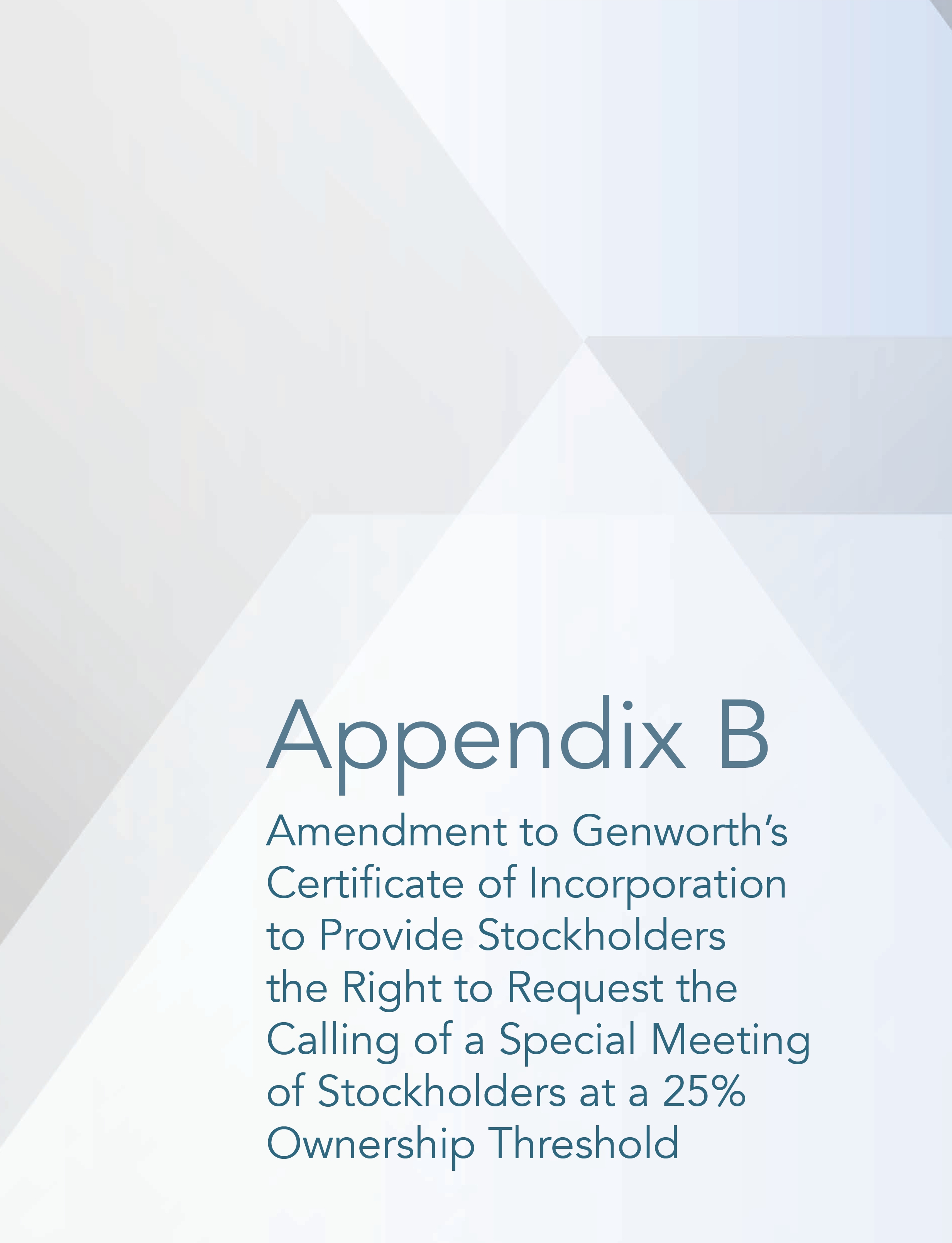
| Appendix B |
If our stockholders approve Proposal No. 5, the company intends to file with the Secretary of State of the State of Delaware the documents necessary to amend Section 2 of Article VI of the Certificate of Incorporation as follows (with additions shown in blue underlined text and deletions shown in red text that has been struck through):
ARTICLE VI
STOCKHOLDER ACTION
[…]
Section 2. Special Meetings. Prior to the Operative Date, except as required by law and subject to the rights of the holders of any class or series of stock having a preference over the Common Stock as to the payment of dividends or distributions upon liquidation, special meetings of stockholders of the Corporation of any class or series for any purpose or purposes may be called only (i) by the Board of Directors pursuant to a resolution stating the purpose or purposes thereof approved by a majority of the Whole Board or (ii) upon the written request of the holders of a majority of the Class B Common Stock filed with the Secretary of the Corporation. Effective upon and commencing as of the Operative Date, except as required by law and subject to the rights of the holders of any class or series of stock having a preference over the Common Stock as to the payment of dividends or distributions upon liquidation, special meetings of stockholders of the Corporation of any class or series for any purpose or purposes may be called only (x) by the Board of Directors pursuant to a resolution stating the purpose or purposes thereof approved by a majority of the Whole Board or (y) upon the written request of the holders of at least fortytwenty-five percent (4025%) of the outstanding shares of Common Stock filed with the Secretary of the Corporation.
| 2024 Proxy Statement | 149 |
 Genworth Financial, Inc. ©2024 Genworth Financial, Inc. All rights reserved. |
 |

GENWORTH FINANCIAL, INC.
C/O CORPORATE SECRETARY
6620 WEST BROAD STREET
RICHMOND, VA 23230
 |
SCAN TO |
 |
VOTE BY
INTERNET
Before The Meeting - Go to www.proxyvote.com or scan the QR Barcode above
Use the Internet to transmit your voting instructions and for electronic delivery of information:
Stockholders:
You must vote these shares no later than 11:59 p.m. ET on May 22, 2024.
Participants in the Genworth Financial, Inc. Retirement and Savings Plan:
You must vote these shares no later than 11:59 p.m. ET on May 20, 2024.
Members in the Genworth Financial Canada Stock Savings
Plan:
You must vote these shares no later than 5:00 p.m. ET on May 21, 2024.
Have your proxy card in hand when you access the web site and follow the instructions to obtain your records and to create an electronic voting instruction form.
During The Meeting - Go to www.virtualshareholdermeeting.com/GNW2024
You may attend the meeting via the Internet and vote during the meeting. Have the information that is printed in the box marked by the arrow available and follow the instructions.
VOTE BY PHONE - 1-800-690-6903
Use any touch-tone telephone to transmit your voting instructions:
Stockholders:
You must vote these shares no later than 11:59 p.m. ET on May 22, 2024.
Participants
in the Genworth Financial, Inc. Retirement and Savings Plan:
You must vote these shares no later than 11:59 p.m. ET on May 20, 2024.
Members in
the Genworth Financial Canada Stock Savings Plan:
You must vote these shares no later than 5:00 p.m. ET on May 21, 2024.
Have your proxy card in hand when you call, and then follow the instructions.
VOTE BY MAIL
Mark, sign and date your proxy card and return it in the postage-paid envelope we have provided or return it to Vote Processing, c/o Broadridge, 51 Mercedes Way, Edgewood, NY 11717.
| TO VOTE, MARK BLOCKS BELOW IN BLUE OR BLACK INK AS FOLLOWS: | ||
| V39582-P05422-Z86948 | KEEP THIS PORTION FOR YOUR RECORDS | |
| DETACH AND RETURN THIS PORTION ONLY |
| GENWORTH FINANCIAL, INC. |
| |
| THE BOARD OF DIRECTORS RECOMMENDS A VOTE "FOR" EACH NOMINEE IN PROPOSAL 1 BELOW AND "FOR" PROPOSALS 2, 3, 4, AND 5. | ||
| 1. | Election of Nine Directors Named in the Proxy Statement | ||||||||
| Nominees: | For | Against | Abstain | ||||||
| 1a. | G. Kent Conrad | ☐ | ☐ | ☐ | |||||
| 1b. | Karen E. Dyson | ☐ | ☐ | ☐ | |||||
| 1c. | Jill R. Goodman | ☐ | ☐ | ☐ | |||||
| 1d. | Melina E. Higgins | ☐ | ☐ | ☐ | |||||
| 1e. | Thomas J. McInerney | ☐ | ☐ | ☐ | |||||
| 1f. | Howard D. Mills, III | ☐ | ☐ | ☐ | |||||
| 1g. | Robert P. Restrepo, Jr. | ☐ | ☐ | ☐ | |||||
| 1h. | Elaine A. Sarsynski | ☐ | ☐ | ☐ | |||||
| 1i. | Ramsey D. Smith | ☐ | ☐ | ☐ | |||||
| For | Against | Abstain | |||||
| 2. | Advisory vote to approve named executive officer compensation. | ☐ | ☐ | ☐ | |||
| 3. | Ratification of the selection of KPMG LLP as the independent registered public accounting firm for 2024. | ☐ | ☐ | ☐ | |||
| 4. | Approval of an Amended and Restated Certificate of Incorporation to Remove All References to Legacy GE Provisions Including the Removal of References to Class B Common Stock and Renaming Class A Common Stock. | ☐ | ☐ | ☐ | |||
| 5. | Approval of an Amendment to Genworth's Certificate of Incorporation to Provide Stockholders the Right to Request the Calling of a Special Meeting of Stockholders at a 25% Ownership Threshold. | ☐ | ☐ | ☐ | |||
| NOTE: Please sign exactly as your name appears hereon. When signing as attorney, executor, administrator, or trustee, please give your full title. For joint accounts each owner must sign. Please Sign, Date and Return the Proxy Card Promptly Using the Enclosed Envelope. |
| Signature [PLEASE SIGN WITHIN BOX] | Date |
| Signature (Joint Owners) | Date |
Important Notice Regarding the Availability of Proxy Materials
for the Annual Meeting of Stockholders to Be Held on May 23, 2024:
Genworth’s
proxy statement and annual report to stockholders are available at www.proxyvote.com.
| ▼ IF YOU HAVE NOT VOTED VIA THE INTERNET OR TELEPHONE, FOLD ALONG THE PERFORATION, DETACH AND RETURN THE BOTTOM PORTION IN THE ENCLOSED ENVELOPE. ▼ |
| V39583-P05422-Z86948 |
GENWORTH FINANCIAL, INC.
PROXY SOLICITED ON BEHALF OF THE BOARD OF DIRECTORS
FOR THE ANNUAL MEETING OF STOCKHOLDERS ON MAY 23, 2024
Stockholder:
The undersigned stockholder of Genworth Financial, Inc. hereby appoints Thomas J. McInerney, Jerome T. Upton, and Michael J. McCullough, and each of them jointly and severally, proxies, with full power of substitution, to represent and to vote all shares of Class A Common Stock of Genworth Financial, Inc. that the undersigned is entitled to vote at the 2024 Annual Meeting of Stockholders to be held on Thursday, May 23, 2024, at 9:00 a.m. ET and at any adjournment thereof, upon such business as may properly come before the meeting, including the proposals described in the Proxy Statement dated April 8, 2024, a copy of which has been received by the undersigned, and on matters incidental to the conduct of the meeting.
THIS PROXY WHEN PROPERLY EXECUTED WILL BE VOTED IN THE MANNER DIRECTED HEREIN BY THE UNDERSIGNED STOCKHOLDER. IF NO DIRECTION IS MADE, THIS PROXY WILL BE VOTED "FOR" EACH NOMINEE LISTED IN PROPOSAL 1 AND "FOR" PROPOSALS 2, 3, 4, AND 5. ON OTHER MATTERS THAT MAY PROPERLY COME BEFORE THE ANNUAL MEETING, THE PROXIES SHALL VOTE IN ACCORDANCE WITH THEIR JUDGMENT.
Participant in the Genworth Financial, Inc. Retirement and Savings Plan (the “Plan”):
The undersigned participant in the Plan hereby directs The Bank of New York Mellon ("BNYM") as Trustee for the Plan, to vote all shares of Class A Common Stock of Genworth Financial, Inc. allocated to the undersigned's account under the Plan at the 2024 Annual Meeting of Stockholders to be held on Thursday, May 23, 2024, at 9:00 a.m. ET and at any adjournment thereof, upon such business as may properly come before the meeting, including the proposals described in the Proxy Statement dated April 8, 2024, a copy of which has been received by the undersigned, and on matters incidental to the conduct of the meeting.
THIS PROXY VOTING INSTRUCTION CARD WHEN PROPERLY EXECUTED WILL BE VOTED IN THE MANNER DIRECTED HEREIN BY THE UNDERSIGNED PLAN PARTICIPANT. IF THIS PROXY VOTING INSTRUCTION CARD IS NOT PROPERLY COMPLETED AND SIGNED, OR IF IT IS NOT TIMELY RECEIVED BY THE DESIGNATED TABULATOR, SHARES OF GENWORTH'S CLASS A COMMON STOCK HELD IN THE UNDERSIGNED'S ACCOUNT UNDER THE PLAN WILL BE VOTED IN THE SAME PROPORTION AS SHARES OF GENWORTH'S CLASS A COMMON STOCK FOR WHICH DIRECTIONS HAVE BEEN RECEIVED FROM OTHER PLAN PARTICIPANTS, UNLESS BNYM DETERMINES TO VOTE OTHERWISE, CONSISTENT WITH ITS OBLIGATIONS UNDER ERISA. ALL INSTRUCTIONS RECEIVED BY BNYM FROM INDIVIDUAL PARTICIPANTS WILL BE HELD IN CONFIDENCE.
Member in the Genworth Financial Canada Stock Savings Plan (the “Canadian Plan”):
The undersigned member in the Canadian Plan hereby directs Sun Life Financial, as Trustee for the Canadian Plan, to vote all shares of Class A Common Stock of Genworth Financial, Inc. allocated to the undersigned's account under the Canadian Plan at the 2024 Annual Meeting of Stockholders to be held on Thursday, May 23, 2024, at 9:00 a.m. ET and at any adjournment thereof, upon such business as may properly come before the meeting, including the proposals described in the Proxy Statement dated April 8, 2024, a copy of which has been received by the undersigned, and on matters incidental to the conduct of the meeting.
THIS PROXY VOTING INSTRUCTION FORM WHEN PROPERLY COMPLETED AND SIGNED WILL BE VOTED IN THE MANNER DIRECTED HEREIN BY THE UNDERSIGNED MEMBER. IF THIS PROXY VOTING INSTRUCTION FORM IS NOT PROPERLY COMPLETED AND SIGNED, OR IF IT IS NOT TIMELY RECEIVED BY THE DESIGNATED TABULATOR, SHARES OF GENWORTH'S CLASS A COMMON STOCK HELD IN THE UNDERSIGNED'S ACCOUNT UNDER THE PLAN WILL NOT BE VOTED.
(PLEASE MARK, SIGN AND DATE ON REVERSE SIDE)
